
![]()

![]()
Modern Popular Music
Group & Last Name Index to Full History:
A B C D E F G H I J K L M N O P Q R S T U V W X Y Z
Tracks are listed in chronological order by year, then alphabetically.
Listings do not reflect proper order by month or day: later oft precedes earlier.
Find on Page = F3. Not on this page? See history tree below.
Featured on this page loosely in order of first recording or record release (as possible):
Featured on this page loosely in order of first recording if not record release (as possible).
Names are alphabetical, not chronological, per year:
Tracks are listed in chronological order by year, then alphabetically.
Listings do not reflect proper order by month or day: later oft precedes earlier.
Find on Page = F3. Not on this page? See history tree below.
|
Caveats in the employment of this page: 1. It descends in chronological
order by the year the artist or band is first found on a commercial record
issue (ideally) by year only, alphabetical thereat. One musician above
another doesn't necessarily translate to earlier issue unless the year
changed. 2. Though release dates are the aim with links to YouTube, some
are recording dates and may not be everywhere clearly distinguished. 3.
Reissues are used to represent originals without much discussion. Popular
artists not on this page may be in Modern Jazz Song.
A good source for lyrics for this period is
Lyrics Playground.
Ditto songwriting credits at
Cafe Songbook,
Songfacts and
Second Hand Songs.
Popular music in general see Donald Clarke. |
|||
 First issue 'Billboard' 1894 Source: Wikiwand |
This page resumes where Early
Popular leaves off in the thirties, and heads through musicians who issued vinyl by 1970.
As the thirties saw the blooming of the film industry, 'The Jazz Singer'
starring Al Jolson the first talkie released on 6 October 1927, Hollywood
and the like would become the major contributors to popular music later assisted by
television [see also Scaruffi on the relationship between film and popular
music]. Just so, I arbitrarily delineate early from modern and give it
a round number of 1930 for the purposes of this page only since most artists
beginning to record after that extend into the modern period. That's rather
too early, however, in terms of both music and film, the 'Wizard of 'Oz' in
Technicolor not released until 1939 ('Fantasia' 1940). (That's also pretty early in comparison
to other genres. In jazz early becomes modern around World War II w bebop at
the tail of early swing, also going the rhythm and blues direction about the
same time. In folk early doesn't shift toward modern until the sixties w Bob
Dylan's switch from acoustic to electric guitar.) Be as may, film stars thus figure large on this page,
arriving w the demise of vaudeville, minstrelsy now gone w it. Our interest
otherwise is largely the United States sprinkled w a few notable artists
from across the Atlantic. See 'Chronology of American Popular Music
1900-2000' by Frank Hoffman (Routledge 2008) for a thorough account of this
period. Other popular performers are listed in folk and
modern vocal jazz. Modern Classical
contains a few composers
who applied the classical orchestra to popular uses for film. See also such
as André Previn, Lalo Schifrin and Michel Legrand per film in
Modern Jazz Piano. Others
recording early popular music in the thirties
and forties. 'Billboard'
magazine, the major thermometer of musical popularity with which most are
acquainted in the States, was founded in
1894. Originally producing posters as an advertising firm, it began charting
sheet music sales upon the issue of
its first paper
(to become a magazine)
on Nov 1 of 1894. Music VF (US/UK
Rock VF 1965>) and
TsorT begin their charts in 1900, the year
Billboard became a weekly rather than monthly publication
[*]. About 3 million
records in all were sold that year [*],
being fairly expensive at the time. Billboard published its
first 'Hit Parade" in 1936
[1,
2],
Bing Crosby's 'Pennies from Heaven' being the highest-selling release that
year. Billboard had and would track the popularity of all variety of
performers in all variety of venues from early circus acts and coin-operated
amusement machines to radio and film. Among the more important dates along
its path was its 'Best Selling Records Chart' first issued on 27 July 1940
[1,
2].
Its Top 100 list of 12 Nov 1955 transformed to the Hot 100 on 4 August 1958
[*].
Billboard [today: 1,
2] has been
in business a long time, currently charting streaming as well. Other major charting companies were Music Vendor as of 1946 to become Record
World in '64 [1,
2,
3] and
Cashbox as of 1952 [1,
2]. Be as may, references to such as the "Top Ten"
are here a convenience. Ditto "Top Forty" et al, albeit the Top 40 is a standard
format introduced by
Todd Storz
in the early fifties. For the most popular music in the United States and
globally in any genre see
diamond LP sales.
Other online charts including global at Alaska Jim's,
Kluss and
TsorT. See
also collector, Joel Whitburn [1,
2,
3,
4].
As for popular music following broadly where this page leaves
off, see this chart of musical culture ranking best-selling artists from
1969 to present. Note: 'Billboard' magazine's first issue was 1 November 1894 costing a dime. It had begun as a poster advertising comapny. 'Billboard' announced all variety of live entertainment from carnivals and circuses to minstrels and vaudeville. It began to cover silent film in 1909 and radio in the twenties. With the rise of the jukebox in the thirties Billboard began charting songs. Its first three categories were Pop, Rhythm and Blues, and Country and Western. The Hot 100 chart was conceived in 1958. Billboard had also begun covering television in the fifties.
| ||
|
Born in 1908 in Queens, actress Ethel Merman was a secretary when she began her career in theatre in the mid-twenties w vaudeville [1, 2, 3], yet popular but to decline, Broadway and Hollywood spelling the end of vaudeville variety show, particularly w the introduction of sound in films in the latter twenties ('The Jazz Singer' starring Al Jolson '27). Merman appeared in her first film, 'Follow the Leader', in 1930, but the major boost to her early career arrived with her performance of 'I Got Rhythm' in her first theatre performance, 'Girl Crazy', the same year. Though Merman may be more famous to younger folk as Lucille Ball's sidekick on the television comedy, 'I Love Lucy', she was a bridge figure from early to modern popular while illustrating the powerful roles of Broadway and Hollywood musicals in the metamorphosis of entertainment. Her first autobiography, 'Who Could Ask for Anything More?', was published in 1955. Among her more significant Broadway engagements during her later career was 'Gypsy', a biographical account of Gypsy Rose Lee in which she was cast as Lee's mother, opening in 1959. (She lost the film role to Rosalind Russell in 1962.) In 1978 she published her second memoir, 'Merman'. Politically, she was a Republican and performed for the Eisenhowers. Merman died in her sleep of brain tumor on 15 February 1984. References: 1, 2, 3, 4, 5, 6, 7. See also 'Ethel Merman: A Life' by Brian Kellow, Viking Penguin, 2007. Sessionography. Catalogues: 1, 2, 3. Merman in visual media. Per 'After I've Gone' 1931 below, that seems another version of 'After You've Gone' first issued in 1918 by Henry Burr w Albert Campbell, composed by Henry Creamer, Turner Layton and Ray Sherman. Per 'Diamonds Are a Girl's Best Friend' in 1950, that had been written for the 1949 Broadway musical, 'Gentlemen Prefer Blondes', first performed by actress, Carol Channing. Ethel Merman 1930 From the Broadway play 'Girl Crazy' Composition: George & Ira Gershwin Ethel Merman 1931 Film: 'Be Like Me' Film Music: Vernon DukeLyrics: Yip HarburgFilm Music: Johnny GreenLyrics: Yip HarburgEthel Merman 1934 An Earful of Music and an Armful Of You Film: 'Kid Millions' Music: Walter Donaldson Lyrics: Gus Kahn Ethel Merman 1950 Diamonds Are a Girl's Best Friend Composition: Jule Styne/Leo Robin 1949 Ethel Merman 1967 Composition: Sammy Cahn/Jimmy Van Heusen Ethel Merman 1977 Composition: Cole Porter
|
Ethel Merman Source: The Dickenson
|
||
|
Johnny Mercer Photo: William L. Gottlieb Source: WBUR
|
Born in Savannah, Georgia, in 1909,
songwriter
and vocalist Johnny Mercer,
had an attorney and real estate developer for a father whose secretary was
his mother. Mercer bought records by such as
Bessie Smith and
Louis Armstrong as a
teenager. He headed for New York City to become an actor upon graduating from high
school, vaudeville on its way out about that time as composers who'd been
making a fortune via such as Tin Pan Alley now dominated NYC's musical
zeitgeist, songwriters such as Irving Berlin [1,
2,
3,
4,
5,
6,
7,
8,
9,
10],
Cole Porter [1,
2,
3,
4,
5,
6] and
George Gershwin. IBDB has
Mercer performing in the Broadway play, 'Hero Worship', as
early as 11 May 1928. He bummed about as an actor until winning a singing contest staged by bandleader
Paul Whiteman, thereat
beginning his career in radio while gluing to Whiteman's orchestra for
another year. Lord's begins its sessionography of Mercer with
Frank Trumbauer's orchestra
on 5 April 1932 in NYC for 'Dinah' and 'My Honey's Lovin' Arms' (Columbia
18002). Trumbauer was also in Whiteman's band. Mercer formed a songwriting partnership with
Hoagy Carmichael that
resulted in 'Lazy Bones' in 1933. In 1935 Mercer moved to Hollywood
and began composing for films [1,
2].
Bing Crosby,
took multiple titles by Mercer to the #1 spot on Billboard in 1937 and
1938. Other titles for which Mercer penned lyrics include 'Jeepers Creepers', 'Blues
in the Night', 'That Old Black Magic', 'One for My Baby', 'Come Rain or Shine',
'Moon River' and 'Days of Wine and Roses'. Between 1946 and 1962 Mercer tallied
four Academy Awards for Best Original Song in collaboration with Harry Warren,
Hoagy Carmichael and
Henry Mancini., the latter
for 'Moon River' in 1962 and 'Days of Wine and Roses' in 1963. Mercer
died on
25 June 1976 in Bel Air, California, of brain tumor. References: 1,
2,
3,
4,
5,
6,
7,
8.
Catalogues: 1,
2,
3,
4. Johnny Mercer 1934 With Paul Whiteman Composition: Johnny Mercer/Bernie Hanighan With Paul Whiteman & Peggy Healy Composition: Matty Malneck/Johnny Mercer Johnny Mercer 1942 Composition: Johnny Mercer Johnny Mercer 1944 Composition: Johnny Mercer Johnny Mercer 1945 On the Atchison, Topeka, and the Santa Fe Music: Harry Warren Lyrics: Johnny Mercer Johnny Mercer 1946 With the Pied Pipers Music: Jimmy Van Heusen Lyrics: Johnny Burke Johnny Mercer 1948 My Happiness With the Pied Pipers Composition: Betty Peterson/Borney Bergantine
|
||
|
Born in Brooklyn in 1893, actress, Mae West, is another bridge figure from early to modern popular music, beginning w censorship in the thirties concerning public sexuality. She began her career at age fourteen doing vaudeville, a style of variety show popular for about forty years consisting of largely unrelated acts [1, 2, 3, 4]. Her work in theatre would help hasten the disappearance of vaudeville, her work in early film helping to seal its extinction as the movie palace became even more the place to go with the introduction of sound, that until Paramount was ordered to sell its monopoly of theaters in 1948. Television was otherwise well on its way to keeping people at home by then. West's first Broadway performance was in 1911 at age eighteen ('A La Broadway'). Mae early got into trouble with the law when she was charged with corrupting the morals of youth upon the 1926-27 staging of her first play, 'Sex', which she wrote, produced and directed. The play ran through 375 performances on Broadway before NYC police shut it down. West was sentenced to ten days in the workhouse on Roosevelt Island and fined $500. That was no small sum in those days, which West turned into an investment in notoriety, attracting the attention of Paramount Pictures. Her film debut, 'Night After Night', released in 1932. She starred in the release of 'She Done Him Wrong' in 1933, that based on her play, 'Diamond Lil'. She both wrote and starred in 'I'm No Angel' in 1933. Theatre and film were largely self-policed until 1934 when Hollywood became subject to the Hays Production Code, the release of motion pictures requiring approval from the PCA (Production Code Administration). Films were subject to the Code until it was declared unconstitutional in 1952. As West is placed on this page in the modern era less for reasons of music or film than for culture − with sexuality finding expression to the rebuttal of official moral authority − it's appropriate that her next film was censored from the start, the title of 'It Ain't No Sin' changed to 'Belle of the Nineties' in 1934. Followed by 'Goin' to Town' in '35, later films were not so polite and saw some censorship: 'Klondike Annie' ('36), 'My Little Chickadee' ('40) and 'The Heat's On' ('43). The last would be West's last film for another 27 years. In 1937 West managed to get banned from NBC radio for what the FCC considered to be "vulgar and indecent" speech. She wouldn't be heard on radio again until the early fifties. In the meantime she worked in theatre in New York City. 1966 saw the issue of a rock album titled 'Way Out West'. 1970 saw her cast in the role of Leticia Van Allen in the film, 'Myra Breckenridge', that from the book by Gore Vidal concerning a transsexual which part was played by Raquell Welch. 1972 witnessed the issue of another rock LP, 'Great Balls of Fire'. West appeared in her last film, 'Sextette', in 1978, that based on her play of the same title. She died a couple years later in Los Angeles on 22 November 1980. References: 1, 2, 3, 4, 5. Filmographies: 1, 2. Sessionography. Discographies: 1, 2, 3. Compilations: 'Come Up and See Me Sometime' 1933-54 by Living Era 2006; 'Sixteen Sultry Songs Sung By Mae West 'Queen Of Sex'' by Rosetta 1987. Collections: LOC. Further reading: 1, 2, 3; West and the Hays Production Code: 1, 2, 3, 4, 5, 6, 7, 8, 9, 10, 11, 12; West and religion; 'The Complete Films of Mae West' by Jon Tuska (Citadel 1992). Mae West 1933 Film: 'I'm No Angel' Composition: Harvey Brooks/Gladys DuBois/Ben Ellison They Call Me Sister Honky Tonk Film: 'I'm No Angel' Composition: Harvey Brooks/Ben Ellison Film: 'She Done Him Wrong' Composition: See Wikipedia Film: 'She Done Him Wrong' Composition: Ralph Rainger I Wonder Where My Easy Rider's Gone Film: 'She Done Him Wrong' Composition: Ralph Rainger Mae West 1940 Film: 'My Little Chickadee' Composition: Louis Alter/Arthur Swanstrom Film: 'My Little Chickadee' Music: Ben Oakland Lyrics: Milton Drake
|
Mae West Source: OTR Cat
|
||
| Born Ronald Dennis Pountain in 1913 in Derby,
England, Denny Dennis
[1,
2,
3,
4,
5] was
a bit of England's
version of
Bing Crosby. An early dance
band vocalist, he wended that route into the modern era, albeit not for
long as he ceased recording in the latter fifties and retired from the music business in 1965. His first
issues had been in 1933 for the HMV label with the
Jack Jackson Orchestra: 'From Me to You'/'Reflections In the Water' (HMV
B6384) and 'I'm
Getting Sentimental Over You' (HMV B6392). He next recorded with Roy Fox
on Decca the same year. His first session with
Fox on July 10 yielded 'Drowsy Blues' and 'Jungle Drums'. Dennis
exchanged Fox for
Bert Ambrose'
orchestra in 1938, 'Joseph, Jospeh' among titles from his first session
with Ambrose in October. Dennis left Ambrose for the Skyrockets
Dance Orchestra in 1944, his first session with that band in spring to
issue such as 'I'm Sending My Blessings' and 'Stairway to the Stars'. His
initial recordings with the
Squadronaires were about May of '44. Dennis
was with the Skyrockets for less than a year, last recording with them in
January of '45, but continued with the Squadronaires into 1947. Dennis didn't visit the States until 1948, doing radio
and touring with
Tommy Dorsey for a year. Dennis' first of numerous
sessions with
Dorsey were from an AFRS (Armed Forces Radio Service) radio
broadcast from the Coliseum in Orlando, Florida, yielding such as 'Mary
Lou'. He last recorded with
Dorsey in April of '49 in NYC (Victor to issue
such as 'Dream of You') before returning to London to work w
Sid Phillips.
He then hooked up w the
Ken Jones, then
Johnny Gregory, orchestras,
recording to as late as 'Sugar Moon'/'Return to Me' (Embassy WB291) w
Jones issued in Aug 1958. Dennis' brand of audio spectacle had been more
popular in the thirties than the fifties and was long since by the time he left the Owl Country Club in Yorkshire in
1965 to work at a paper mill. He eventually retired from that in the
eighties and gave a couple late performances in tribute to Fox
and Phillips before his death in Cumbria, England,
on 2 November 1993. Discographies: 1,
2,
3,
4,
5. Denny Dennis 1933 With Ambrose & his Orchestra Denny Dennis 1934 Little Man, You've Had a Busy Day Composition: Mabel Wayne/Al Hoffman/Maurice Sigler Denny Dennis 1935 Composition: Tot Seymour/Vee Lawnhurst Denny Dennis 1936 Composition: Billy Mayhew Music: Rube Bloom Lyrics: Johnny Mercer Denny Dennis 1937 They Can't Take That Away from Me Composition: George & Ira Gershwin Music: Richard Whiting Lyrics: Johnny Mercer Music: Herbert Stothart Lyrics: George Forrest/Robert Wright Denny Dennis 1938 Composition: Slim Gaillard/Slam Stewart/Bud Green Denny Dennis 1946 Composition: Django Reinhardt/Spencer Williams Denny Dennis 1948 I'd Love to See You Home To-Night Composition: Parker/Connor Denny Dennis 1949 Denny Dennis 1958 Composition: Beverly Guthrie/Gary Lynes Music: Burt Bacharach Lyrics: Hal David
|
Denny Dennis Source: Jazz Age Music |
||
|
Perry Como [1, 2, 3, 4, 5] was a popular crooner who himself hardly hummed a bar of jazz, though had less choice when recording with others such as Benny Goodman, Louis Prima, Harry James or Tex Beneke. Born in 1912 in Canonsburg, PA, he was running his own barbershop when he joined Freddy Carlone's band in 1932, four days after getting married to one, Roselle. He stayed with Carlone, touring, a few years until joining the Ted Weems Orchestra with which he made his first recording, 'You Can't Pull the Wool Over My Eyes', in 1936. Como left Weems in late 1942, weary of traveling to take up barbering again. He then accepted an offer from CBS Radio in 1943, first broadcasting in March. He was performing clubs again that year, starting at the Copacabana in NYC in June. 'Goodbye, Sue'/'There'll Soon Be a Rainbow' was his first issue with RCA Victor that year, with which label he remained another 44 years. He moved from CBS to NBC in 1944 to air his first 'Chesterfield Supper Club' on December 11, that to eventually become a television show. Very the family man and among the more conservative entertainers in the industry, Como nevertheless issued an uncharacteristic rocker in 1955, 'Ko Ko Mo' (RCA Victor 47-5994), that backed by the Ray Charles Singers [1, 2]. That was a cover of Gene & Eunice's 1954 version on Combo 64. 'The Perry Como Show' premiered on television in September of 1955. He followed that in 1959 with 'Perry Como's Kraft Music Hall' for an eight-year run. He began performing in Las Vegas in 1970, also touring the United Kingdom in the seventies. In 1982 Como visited Italy with Frank Sinatra, also touring the States in the eighties. He performed in tuxedo, rather than the usual cardigan sweater during his latter career as a manner of honoring his audience. He died in May 2001 in his sleep at home in Jupiter Inlet Colony, Florida. Discographies of Como including various credits at 1, 2, 3, 4. Composers of Como's titles at 1, 2. Lyrics at AZ. Como in visual media. More Perry Como with the Fontane Sisters. Perry Como 1936 You Can't Pull the Wool Over My Eyes Composition: Milton Ager/Murray Mencher/Charles Newman Perry Como 1939 Composition: Joe Burke/Joseph Burke/Edgar Leslie I Wonder Who's Kissing Her Now Composition: Frank Adams/Will Hough Bart Howard/Joe Howard/Harold Orlob Composition: Mort Dixon/Ray Henderson Perry Como 1946 Composition: Joe Burke/Joseph Burke/Edgar Leslie Perry Como 1947 I Wonder Who's Kissing Her Now Composition: Frank Adams/Will Hough Bart Howard/Joe Howard/Harold Orlob Perry Como 1950 Music: Milton De LuggLyrics: Frank Loesser Perry Como 1951 'Chesterfield Show' Composition: Hank Williams Sr. Perry Como 1955 Composition: Forest Wilson/Eunice Levy/Jake Porter Perry Como 1969 Music: Hugo Montenegro Lyrics: Jack Keller/Ernie Sheldon
|
Perry Como Yet triumphant after his "Wool" period
Source: Last FM
|
||
|
Don't forget that monster Toto Source: Follow the Piper |
Born Frances Ethel Gumm in 1922 in Grand Rapids, Minnesota, actress Judy Garland began her recording career at age fourteen, releasing 'Stompin' at the Savoy' with 'Swing Mr. Charlie' flip side (Decca 848) in 1936 [45Worlds]. Garland's parents owned a movie and vaudeville theater where she gave her first performance at age two, together with her two elder sisters, Dorothy and Mary Jane. The family moved to Lancaster, California in 1926 to run another theater. Her mother, Ethel, had intentions of making her daughters film stars when she enrolled them as the Gumm Sisters ("Jimmie," "Suzy" and "Baby") in dance school in 1928, where they joined the Meglin Kiddies dance troupe to appear in their first film, 'The Big Revue', in 1929. Having worked the vaudeville circuit for a few years with their mother as manager, the Gumm Sisters became the brief-existing Garland Sisters in 1934. Garland changed her name from Frances to Judy before the trio dismantled (Mary Jane getting married) in 1935. Garland then signed her first contract with Metro-Goldwyn-Mayer that year. In 1937 she began appearing in films with Mickey Rooney. In 1938 Garland was cast in 'The Wizard of Oz' [released 1939/ 1, 2]. Of note among films to follow was her appearance w Gene Kelly in the film musical, 'Me and My Gal', in 1942. On 15 June of '45 she married Italian stage and film director, Vincente Minnelli, to result in the birth of popular singer, Liza Minnelli, in March 1946. Garland experienced a nervous breakdown in 1947 while filming 'The Pirate'. Though she completed the movie, she was suspended (and replaced) from three others in '48, '49 and '50 due largely to depression with a suicidal lean atop alcohol and pill abuse. Notable, however, was her appearance w Fred Astaire in the film musical, 'Easter Parade', in 1948. In 1951 Garland traded Hollywood for Broadway, performing at the Palace Theatre and awarded a Special (honorary) Tony. Back in Hollywood in 1954, she filmed that year's remake of 'A Star Is Born', now for Warner Brothers. Garland began appearing in television specials for CBS in 1955. In 1956 she became the highest paid Las Vegas entertainer at the time, appearing at the New Frontier Hotel for $55,000 per week. Her recorded appearance at Carnegie Hall in 1961 [1, 2] resulted in the gold double-record album, 'Judy at Carnegie Hall', which kept the No. 1 spot on the charts for 13 weeks. It was also 1961 when Garland began hosting her own television show, the first of three, called 'The Judy Garland Show'. 'Judy at Carnegie Hall', per above, won the Album of the Year Grammy Award in 1962. In 1964 she appeared with her daughter, Liza, then eighteen years of age, at the London Palladium. Results weren't favorable, however, when Garland toured Australia that year: The show in Melbourne opened an hour late, resulting in a heckling audience that booed her offstage before completing her performance. In 1967 Garland was fired and replaced yet again for missing rehearsals, this time by 20th Century Fox, filming 'Valley of the Dolls'. As before, she headed for the Palace Theatre on Broadway. Garland gave her final concert performance in March of 1969 in Copenhagen. She was only 47 years of age when she died of an accidental overdose of barbiturates on 22 June of 1969 in London, moved for burial to the Hollywood Forever Cemetery in Los Angeles. Albeit Garland lived as a millionaire, above twenty times over by the time of her death along w a healthy list of awards and honors, considerable has been written w focus on the tragic in her life: 1, 2, 3, 4, 5. References encyclopedic: 1, 2, 3, 4, 5; musical: 1, 2; film: 1, 2, 3, 4. Sessionography. Discographies: 1, 2, 3, 4. Further reading: books: 'Get Happy: The Life of Judy Garland' by Gerald Clarke, Random House, 2000; 'Judy Garland: The Secret Life of an American Legend' by David Shipman, Hyperion, 1993; 'Judy Garland: The Day-by-Day Chronicle of a Legend' by Scott Schechter, Cooper Square Press, 2002; 'Vanity Fair'; 1978 auction of personal property; other profiles: 1, 2. Judy Garland 1936 Composition: Edgar Sampson 1934 Composition: J. (Joseph) Russell Robinson Irving Taylor Harry Brooks Judy Garland 1939 Music: Eubie Blake 1921 Lyrics: Noble Sissle For the Broadway show 'Shuffle Along' Film: 'The Wizard of Oz' Music: Harold Arlen Lyrics: Yip Harburg Judy Garland 1942 On the Sunny Side of the Street Music: Jimmy McHugh Lyrics: Dorothy Fields Judy Garland 1944 Composition: Hugh Martin/Ralph Blane Film: 'Meet Me In St. Louis' Judy Garland 1947 Composition: Cole Porter 1936 Judy Garland 1958 Music: Rube Bloom 1939 Lyrics: Johnny Mercer Judy Garland 1964 Music: Charlie Chaplin 1936 For the film 'Modern Times' Lyrics: John Turner/Geoffrey Parsons 1954
|
Judy Garland Source: The Cabaret Room |
|
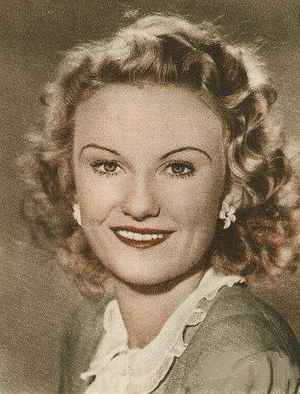 Gerda Neumann Source: Stichting Groenegraf |
As indicated in other places on this page, music wasn't
popular in the United States only. Danish guitarist, Ulrik Neumann
[*], was a peripheral figure in early
Scandinavian jazz due his partnerships with violin virtuoso,
Svend Asmussen, and singer,
Alice Babs. Tom Lord, who lists only
jazz-relevant sessions, has him on 46 of them, largely w
Asmussen. Newton was better
known, however, via television as a comedy performer who also played guitar,
his repertoire one of light and happy tunes. Born in Oct of 1918 in
Copenhagen, Denmark, Neumann's first sessions arrived per Lord on 6 November of 1935 in
Copenhagen when he was yet seventeen years old w Kai Ewans (clarinet),
Asmussen (violin), Niels Foss (bass) and Erik Kragh (drums) to square away
titles like 'Sleepy Time Gal' [Epic LN 3210 ?: compare *] and 'Tiger Rag'
(HMV AL 1327 '35). The next summer in '36 Neumann kept rhythm on a couple tracks with Ewans and a touring
Benny Carter 'Blue
Interlude' (HMV X4699) and 'Memphis Blues' (HMV X4698). Among Neumann's most
important musical associates was his sister, actress and singer,
Gerda Neumann
[1,
2].
Gerda's own recording debut was on 4 Nov toward 'Elsk mig i December' ('Love
Me in December')/'Lonely Villa' issued on HMV X 4555 in '36. Her next
session was w Ulrik and
Asmussen, et al, on an
unidentified date in '36 toward 'Min Vuggesang'/'Den danske Sommer' on HMV X
4588. Hansen & Aagaard are able to give a date of 23 July 1936 toward
'Medley: Lost-Goody Goody'/'All in a Day' on HMV X 4678. In 1940 Neumann appeared in
the film, 'En ganske almindelig pige', with Gerda. Havingworked in films since 1936,
Gerda's career was
a brief one, she dying in a plane crash in Denmark on 26 Jan 1947. Other of
Neumann's family were Christina (Stina) Sorbon whom he married 9 March of
'46 to raise two children, actress and singer, Ulla Neumann [1,
2,
3], and guitarist, Mikael Neumann [1,
2]. Ulrek, making
nineteen films between 1940 and 1966, was a member of the Swe-Danes
[1,
2] for a
couple years, starting in 1959. The Swe-Danes consisted of the
above-mentioned
Babs and
Asmussen. Neumann spent the latter decades of his life
in relative obscurity, dying in Denmark on 28 June of 1994. References: 1,
2.
Sessionographies: Gerda & Ulrik Neumann: Hansen-Aagaard
(alt); Danish Jazz:
Bjerborg-Hansen-Raben; Asmussen: René Aagaard.
Discos: 1,
2,
3,
4.
IMDb.
IA.
Biblio: '12 compositions and arrangements for solo guitar' by Neumann
(Reuter & Reuter 1975).
Website tribute.
Neumann appears on a few jazz tracks below, but the list is largely a better
example of Danish popular music. Gerda Neumann is featured on all
from 1939 through 1945.
Per 1939, 'Jeg Hørte En Sang I En Taxi' is an early sample of Gerda, not
Ulrik, Neumann. Kai Ewans leads the band of which Neumann was a member in
those days, but personnel is unknown. Ulrik Neumann 1936 With Benny Carter & Kai Ewans: Composition: Benny Carter/Manny Kurtz/Irving Mills Composition: W.C. Handy/George Norton Gerda Neumann 1939 Composition: Carl Viggo Meincke/Henderson Note: The only instance of the above title in Hansen-Aagaard (above) was recorded on 6 November 1936 for issue on HMV X 4754. Gerda & Ulrik Neumann 1940 Composition: Jens Dennow Music: Aage Stentoft Text: Børge Müller Composition: J. Thomassen Arrangement: Neumann From the film 'En ganske almindelig pige' Music: Jens Dennow Text: Jens Dennov Gerda & Ulrik Neumann 1941 Composition: José María Lacalle Composition: Victor Schertzinger/Frank Loesser Gerda & Ulrik Neumann 1942 Music: Sam H. Stept Text: Lew Brown/Charles Tobias Gerda & Ulrik Neumann 1945 With Svend Asmussen Ulrik Neumann 1949 Film: 'Lattjo med Boccaccio från' With Svend Asmussen The Swe-Danes 1958 Television broadcast The Swe-Danes 1959 Television broadcast Television broadcast The Swe-Danes 1960 Composition: Svend Asmussen Ulrik Neumann 1961 Television broadcast With Svend Asmussen Composition: Beethoven 1818 Ulrik Neumann 1967 Television broadcast With Ulla Neumann (daughter) Composition: Ulrik & Stina Neumann
|
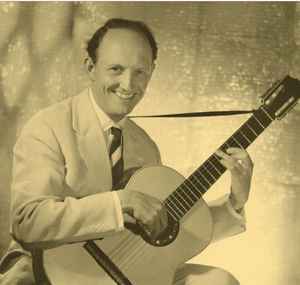 Ulrik Neumann Source: Ulrik Neumann |
|
|
Édith Piaf
Source: Classical Source
|
Born Édith Giovanna Gassion in Paris in 1915,
Édith Piaf
was a cabaret, torch and chanson singer whose
first recordings appeared in Jan 1936: 'Les Momes de la Cloche' and 'L'Étranger'
(Polydor 524 157).
Piaf had first professionally performed at age 14 as a singing acrobat with her
father and half-sister Simone "Mômone" Berteaut. She obtained her first
nightclub gig in 1933 at Juan-les-Pins. In 1935 she began singing at Le
Gerny where owner, Louis Leplée, changed her name to La Môme Piaf (little
sparrow, waif sparrow) and she began performing exclusively in black (like
Johnny Cash). The next year she changed her name to Edith Piaf to
disassociate herself from bad company acquired thus far in her career.
(Louis Leplée had been murdered by mobsters she knew, and she herself had
been suspect.) She met composer, Marguerite Monnot [1,
2], in 1936, with
whom she would begin collaborating in the early forties. Piaf saw her rise to stardom in France during World War II.
Performing for German occupation forces, notably w the Compagnons de la
Chanson [1,
2,
3] beginning in 1944, she
and others alike who performed for the German military were considered traitors
by many, albeit she was a part of the French Resistance by her own claim and helped
a number of people, including at least one Jew, escape Nazi persecution.
After that conflict Piaf toured Europe, the United States and South America.
Her career had notably bloomed in post-war Paris in '47, the same year she
wrote the lyrics to Yves Montand's 'Mais qu’est-ce que j’ai?' (music by
Henri Betti). Piaf made contributions to a
number of compositions. She is thought to have written the music and
lyrics
to 'Les yeux de ma mère' in 1947. She came to attention in the United States
w the issue of 'La Vie en rose' in latter 1950, lyrics by her, music by
Louiguy and Marguerite Monnot. The latter fifties brought association with
lyricist, Georges Moustaki [1,
2. She lived in various
locations in Paris until her death of liver cancer in France
on 10 October 1963. Her last words were reportedly "Every damn thing you do
in this life you have to pay for." Her funeral in Paris was
attended by more than 100,000 people. References encyclopedic: 1,
2,
3;
musical: 1,
2,
3,
4;
synopses: 1,
2.
Discos: 1,
2,
3.
Compilations at Discogs: 1,
2,
3,
4; Disque D'Or:
1,
2.
Composers/lyrics.
Piaf in visual media.
Further reading: Salon.
Other profiles: 1,
2. Édith Piaf 1936 Music: Juel (Chiara Panzieri)/Marguerite Monnot Lyrics: Robert Malleron Music: Jean Wiener Lyrics: Louis Poterat Music: Jean Wiener Lyrics: J. Mario/Louis Poterat Composition: Jean Lenoir Édith Piaf 1946 Composition: Jean Villard Édith Piaf 1947 La Vie en Rose English Composition: See above La Vie en Rose French Composition: See above Édith Piaf 1950 Music: Marguerite Monnot Lyrics: Edith Piaf Édith Piaf 1954 Composition: Michel Emer Édith Piaf 1956 Music: Marguerite Monnot Lyrics: Claude Delécluse/Michelle Senlis Édith Piaf 1960 Music: Charles Dumont Lyrics: Michel Vaucaire Édith Piaf 1962 Music: Ángel Cabral Lyrics: Enrique Dizeo/Michel Rivegauche Music: Marguerite Monnot Lyrics: George Moustaki Édith Piaf 1963 Music: Francis Lai Lyrics: Michèle Vendôme
|
||
|
Dorothy Squires
Source: BBC |
Born in
1915 in Wales, pop vocalist
Dorothy Squires was sixteen, working in a tin
plate factory, when she began singing in a club in Pontyberem. In 1936 she
joined the band of Billy Reid, also the year she began recording. Web
Fantastic has her first session to issue on December 6, 1936
[Dec 3 per 45Worlds], for 'When the
Poppies Bloom Again' (Decca F6224), that uncredited w Billy Reid and His
Accordeon Band, issued the same year per 45Worlds. After
World War II Squires worked for the BBC on the 'Variety Bandbox' radio show.
Her single, 'I'm Walking Behind You', was a strong performer in June of
1953, rising to #12 on the UK's NME (New Musical Express). Squires lived in the United States some years upon marrying her second
husband, actor Roger Moore (of James Bond fame), in 1953 (separated 1961,
divorced 1969). A duet w Russ Conway, 'Say It with Flowers', performed well
in the summer of 1961. Her single, 'My Way', reached #10 on the UK Singles Chart in
1970. Squires led something of a tempestuous life, in and out of court so
many times (30 cases since 1971) for various reasons, including lawsuits,
that she was banned from initiating legal actions without permission of
England's High Court. In 1974 she lost a mansion to fire, saving but her dog and
correspondences (such as with Roger Moore). The house into which she moved next, to the Thames,
flooded three weeks later. Squires published her memoir, 'Rain Rain Go
Away', in 1977. She lost her home to
bankruptcy in 1988. Squires gave her last performance in 1990, dying of lung
cancer on 14 April 1998. References: 1,
2,
3,
4,
5,
6.
Discographies: 1,
2,
3.
Compositions.
Squires in visual media.
Further reading: BBC. Dorothy Squires 1936 Composition: Jimmy Kennedy/Hugh Williams (Wilhelm Grosz) Dorothy Squires 1937 Film: 'Saturday Night Revue' Dorothy Squires 1948 Composition: Russ Morgan/Jack Stuart Dorothy Squires 1961 Dorothy Squires 1969 Music: Charles Danvers Lyrics: Carl Sigman Dorothy Squires 1971 Arrangement: Nicky Welch Arrangement: Nicky Welch Dorothy Squires 1972 Composition: Ivor Novello 1945 For the musical 'Perchance to Dream' Dorothy Squires 1975 Composition: David Gates of Bread 1971 Dorothy Squires 1977 Composition: Don Black Composition: Alan Bergman/Marilyn Bergman/Marvin Hamlisch
|
||
|
Born in 1910 in Lakewood, Ohio, Sammy Kaye got his first real start in 1938 with his own orchestra, billing at the Commodore Hotel, where Tommy Dorsey had been playing. Also a vocalist, though Kaye indulged in a touch of swing, Lord's jazz sessionography excludes him altogether as he was largely known for "sweet" dance music originating and popular in hotels. Of Kaye's numerous Top Ten titles from 1937 to 1950, eight of them rang Billboard's bell at #1:
Rosalie Oct 1937 TsorT finds 'Daddy' to be his most popular issue overall. Though Kaye played both saxophone and clarinet he never performed or recorded solos. He died in Manhattan on 2 June 1987 [obit] to be posthumously inducted into the Big Band Hall of Fame in 1992. References: 1, 2, 3, 4, 5. Sessions w composing credits. Discos: 1, 2, 3, 4. IMDb. Sammy Kaye 1937 Vocals: The Three Barons Sammy Kaye 1938 Music: George Gershwin Lyrics: Ira Gershwin Sammy Kaye 1941 Composition: Bobby Troup Sammy Kaye 1946 Vocal: Billy Williams Music: Nat Simon Lyrics: Charles Tobias Sammy Kaye 1951 Vocals: The Three Kayedettes Composition: Rudy Vallee/Ray Noble Jimmy Campbell/Reginald Connelly Composition: Leon Payne
|
Sammy Kaye Photo: James Kriegsmann Source: Wikiwand |
||
|
Doris Day Source: Hyper Tomb |
Born in Cincinnati, Ohio, in 1922, actress, Doris Day, was one more of those singers who bore the burden of va va voom. Having been denied the opportunity to be ugly, she began her vocal career on WLW Radio to hide her appearance. While there she experienced an illuminating moment, got brave and changed her last name from Kappelhoff to Day in 1939. She first recorded in June of '39 with Barney Rapp (drums) in a session with vocalist, Lee Johnson, and unknown personnel: 'I'm Happy About the Whole Thing'. It was Les Brown and his Band of Renown on October 25 of 1940 for 'Maybe' and 'There I Go'. Day and Brown struck a match to as late as latter 1946. Among numerous popular duets were those w Buddy Clark, among them 'Love Somebody' and 'My Darling, My Darling' in 1948, charting at #1 and #7 respectively. Day was a major film star, yet with no intention of such when she was recommended for her first acting role in 'Romance on the High Seas', that released on 3 July 1948 [IMDb]. Two weeks later Day's 'It's Magic' (Columbia 38188) reached #2 on 17 July of '48, that with George Siravo directing the orchestra. Nine more of her titles reached the Top Ten to as late as 1958:
Again #2
5/49 Other popular recordings had been duets such as 'Let's Take an Old-Fashioned Walk' w Frank Sinatra in '49 and 'Sugar Bush' w Frankie Laine in '52. Come Johnnie Ray in '52 and '53 w 'A Full Time Job' and 'Let's Walk That-a-Way'. Another of Day's strong releases was 'I'll Never Stop Loving You' at #13 in July 1955. Day released 'You're My Thrill' in Aug 1949 on Columbia, the first of numerous LPs on 10" vinyl. Though more famous as a popular singer, Day had made wonderful contributions as a jazz vocalist, especially swing. She had opportunity to work with swing veteran, Harry James, on a number of occasions from 1949 to 1951. Their release of 'Would I Love You' the latter year charted at #10. 1955 saw Day's issue of the soundtrack, 'Love Me or Leave Me', her initial 12" LP of completely original songs not issued before on 10". In December of 1961 she was accompanied by the André Previn Trio consisting of Red Mitchell (bass) and Frank Capp (drums) for 'Duet'. Day wasn't interested in acting on television, but got saddled to The Doris Day Show', which she didn't like doing, from November 1968 to 1973. She'd been contracted without her knowledge by husband (third) and manager, Martin Melcher. Upon Melcher's death in 1968 Day discovered she was deeply in debt due Melcher's partner, her attorney and business manager, Jerome Rosenthal. Day sued Rosenthal and was awarded nigh 23 million, yet settled out of court for six million. To small avail, countersuits occurring into the eighties. Day hosted the the talk show, 'Doris Day's Best Friends', during the 1985-86 season. After well above forty years since recording material for an album Day issued 'My Heart' in the UK in 2011. ('The Love Album' released in '94 had been recorded in '67. Her last of numerous albums had been issued in '65: 'Latin for Lovers' and 'Sentimental Journey'). Beyond music, Day was deeply involved with animal welfare. She'd cofounded Actors and Others for Animals in 1971, the Doris Day Pet Foundation in 1978, the Doris Day Horse Rescue and Adoption Center in 2011. Reportedly a Republican, Day is yet active as of this writing. She owns the Cypress Inn in Carmel-by-the-Sea, California. She is mother of producer, Terry Melcher (Byrds, Paul Revere & the Raiders, Gentle Soul), born in 1942. References encyclopedic: 1, 2, 3; musical 1, 2, 3, 4, 5; film 1, 2, 3; major events. Discographies 1, 2, 3, 4, 5, 6, 7. Filmographies: 1, 2, 3, 4, 5. Television. Awards: 1, 2. Interviews: Bark 2006 Parade 2011. Forum. Further reading: 1, 2, 3, 'Considering Doris Day' (Tom Santopietro, Thomas Dunne Books, 2007). Doris Day 1940 Bandleader: Les Brown Composition: Hal Borne/Johnny Mercer Bandleader: Les Brown Composition: Cole Porter 1940 For the Broadway show 'Panama Hattie' Doris Day 1941 Bandleader: Les Brown Composition: Alan Jay Lerner/Ted Straeter Doris Day 1945 Bandleader: Les Brown Composition: Les Brown/Ben Homer/Bud Green Bandleader: Les Brown Composition: Freddy James (Teddy Powell)/Larry Stock Doris Day 1946 (Ah Yes) There's Good Blues Tonight Composition: Abe Osser/Edna Osser Doris Day 1947 Composition: Charles Tobias/Al Lewis/Ted Murry Doris Day 1949 With Bob Hope Composition: Frank Loesser 1944 Doris Day 1950 Composition: Rodgers-Hart 1929 For the musical 'Spring Is Here' Doris Day 1952 Bandleader: Paul Weston Music: Joseph Kosma 1945 Lyrics: Jacques Prévert Bandleader: Paul Weston Music: Jule Styne 1947 Lyrics: Sammy Cahn Doris Day 1956 Bandleader: Paul Weston Composition: Clay Boland/Moe Jaffe 1937 'Que Sera, Sera' Bandleader: Frank DeVol Music: Jay Livingston Lyrics: Ray Evans Doris Day 1957 Bandleader: Paul Weston Composition: Eddie DeLange/Will Hudson/Irving Mills Composition: Pat Ballard Doris Day 1962 Composition: Hans Schreiber/Carl Sigman With Andre Previn Music: Rube Bloom Lyrics: Johnny Mercer Doris Day 1964 Bandleader: Mort Garson Composition: Bart Howard 1954 Doris Day 1965 Composition: Mel Mitchell/Alarcon Carillo Album: 'Latin for Lovers' Composition: Richard Hayman/Lee Daniels/Sol Parker Album: 'Latin for Lovers' Doris Day 2011 Composition: Bruce Johnston/Terry Melcher Album: 'My Heart
|
||
|
Mitch Miller [1, 2, 3, 4] something epitomizes the popular genre for his television program, 'Sing Along with Mitch' from '61 to '64 [*], a highly popular broadcast that all young folk knew about but few of them watched, Miller addressing nostalgic music out of the great American songbook. Marching Miller could at times be so staid that he made Lawrence Welk look like wild child, Iggy Pop. At other times he could be a pretty hep cat. Born in Rochester, New York, in 1911 [*], to Jewish parents, Mitch first played oboe professionally at age fifteen with the Syracuse Symphony Orchestra. He would also play English horn. In 1932 he graduated from the Eastman School of Music in Rochester. He worked with the Rochester Philharmonic Orchestra until moving to NYC to sign up with CBS (Columbia Broadcasting System) to work in radio. He also worked on Broadway, supporting the 1935 premiere of 'Porgy and Bess'. Miller participated in the broadcast of Orson Welles' 'The War of the Worlds' on Sunday, October 30, 1938. That was the 17th episode of the CBS series, 'Mercury Theatre on the Air'. It was eventually released on vinyl in 1968 by Manheim Fox Enterprises. Miller then joined Alec Wilder's Octet, he with that ensemble for the December 19 recording of titles like 'A Debutante's Diary' and 'Concerning Etchings' [Lord's Disco]. Sessions in March and June of 1939 with Wilder yielded such as 'Such a Tender Night' and 'Sea Fugue Mama'. Wilder would be an important figure in Miller's career, they working together numerously into the early fifties. It was 1939 when CBS acquired the American Record Company and changed its name to Columbia, Miller beginning to do session work that year. His first customer is thought to have been Maxine Sullivan on August 22, 1939 for such as 'Jackie Boy' and 'Turtle Dove'. A month later he would back Mildred Bailey for the first time with Wilder's orchestra, coming up with 'Don't Dally With the Devil', 'Ain't That Good News?' and 'Sometimes I Feel Like a Motherless Child'. Numerous sessions were held with Bailey per Wilder into 1940, he to play oboe for her again on September 1, 1944, per a CBS broadcast of 'Music 'Til Midnight' in NYC to record such as 'Lover Come Back to Me' and 'St. Louis Blues'. Among the highlights of his association with Wilder was 'Frank Sinatra Conducts Alec Wilder' in December of 1945. Miller was featured on English horn with the Philadelphia Orchestra for its December 1947 RCA Victor recording of Jean Sibelius' Swan of Tuonela' under Leopold Stokowski. He arranged and recorded oboe with one of the vocal giant, Dinah Washington, on August 25, for 'I'll Wait' and 'It's Too Soon to Know'. The next year he directed his orchestra to back her on 'I Challenge Your Kiss' released per Mercury 8150. Also in 1949 Miller participated on oboe in the taping of 'Charlie Parker with Strings', not issued until 1995. It was the latter forties that Miler became an A&R (Artists and Repertoire) man for Mercury Records, then Columbia in 1950. Miller there handled the careers of a load of big-name popular vocalists such as Patti Page and Frankie Laine, he also credited with the discovery of Aretha Franklin, she a blues pianist at the time. He likely wouldn't have signed her upon her turn to R&B because Miller lost no love on rock, believing it to be conformist, mediocre "baby food" concerning which, as a producer, he passed off Elvis Presley, Buddy Holly and the Beatles, the last landing at Capitol Records instead. (Miller did offer Presley a contract but Presley's manager wanted too much.) 1950 also saw Miller issuing records as Miller and His Orchestra [*]. 'Tzena, Tzena, Tzena' saw issue in 1950. Other successes in the fifties followed such as 'The Yellow Rose of Texas' in 1955, selling over a million copies in the United States alone. 'Air Force Blue' was released for the United States Air Force in 1957. 'The Children's Marching Song' ('Nick Nack Paddy Wack') surfaced in 1958, as well as 'The River Kwai March/Colonel Bogey March' which remained on Billboard's charts for seven months and a week. It was also 1958 when Miller's first 'Sing Along with Mitch' LPs began to appear by Mitch Miller and the Gang [*]. He'd already issued ten of them by 1961 when it was time to become a household name with the television program, 'Sing Along with Mitch', running until '64. One of that program's major features was vocalist, Leslie Uggams. After 'Sing Along with Mitch' Miller led sing alongs in various venues, hosted television programs and conducted orchestras, including the Boston Pops. He also continued issuing 'Sing Along' LPs into the eighties. Miller received the Grammy Lifetime Achievement Award in 2000, the same year his wife of 65 years, Frances Alexander, died. His own death arrived on July 31 of 2010 in NYC [*]. Discos of issues by Miller with various credits at 1, 2, 3. Per 1946 below, titles are from the album, 'Frank Sinatra Conducts the Music of Alec Wilder. Mitch Miller 1946 Recorded 1939 Composition/Arrangement: Alec Wilder Conducting: Frank Sinatra Recorded 1939 Composition/Arrangement: Alec Wilder Conducting: Frank Sinatra Mitch Miller 1947 The Philadelphia Orchestra Conducting: Leopold Stokowski Composition: Jean Sibelius Mitch Miller 1949 Composition: Ralph Rainger/Leo Robin LP: 'Charlie Parker With Strings' Not issued
until 1995 Mitch Miller 1950
Composition: Issachar Miron (Stefan Michrovsky) Jehiel Hagges (Yechiel Chagiz) Mitch Miller 1955 Composition: Traditional Earliest known version: Edwin Pearce Christy 1853 Mitch Miller 1957 US Air Force recruiting film Mitch Miller 1958 Composition: Gus Kahn/Walter DonaldsonLP: 'More Sing Along With Mitch' By the Light of the Silvery Moon Music: Gus Edwards 1909 Lyrics: Edward MaddenLP: 'Sing Along With Mitch ' 'Nick Nack Paddy Whack' From nursery rhyme 'This Old Man' 1906 Composition: Unknown Arrangement: Malcolm Arnold Composition: Kenneth Alford (Frederick Ricketts)Composition: Felix Mendelssohn 1739LP: 'Christmas Sing-Along With Mitch' Text: Isaac Watts 1719 From 'Psalm 98' Author unknown Circa 460 BC Melody: Lowell Mason 1848 From Handel's 'Antioch' 1742 LP: 'Christmas Sing-Along With Mitch' Composition: Malcolm ArnoldMitch Miller 1960 Sentimental Sing Along With Mitch Album Mitch Miller 1961 Music: Harry Warren 1931Lyrics: Billy Rose/Mort DixonLP: 'TV Sing Along With Mitch' Music: Harold Arlen 1933 Lyrics: Yip Harburg/Billy Rose LP: 'TV Sing Along With Mitch' 'Sing Along with Mitch' Sax: Vincent Abato Composition: Rudy Wiedoeft Mitch Miller 1964 'Sing Along with Mitch' 'Sing Along with Mitch' 'Sing Along with Mitch'
|
Mitch Miller Photo: Don Humstein Source: All Music |
||
|
Born Frances Rose Shore in 1916 in Winchester, Tennessee, that "Southern Girl", Dinah Shore, made her first recordings in 1939 with Xavier Cugat. Though a swing era vocalist, Shore would arrive to greater fame via the new medium of television, particularly for a commercial tune done for General Motors: 'See the USA In Your Chevrolet'. Although something antithetical to Neil Young's 'This Note's For You' (Country 2), one might forgive her, considering all the rock music in general concerning such as hotrods "built for speed." Shore had graduated in 1938 from Vanderbilt University in Nashville with a degree in sociology. She first appeared on radio while in college at WSM. She picked up the name, Dinah, from a disc jockey who couldn't remember her name, calling her "that Dinah girl" as 'Dinah' was one of the songs she often sang. Her first professional employment as a vocalist after university was at WNEW radio, where she also sang with young Frank Sinatra. After working briefly with Cugat, Shore began acquiring national attention via CBS and NBC radio, largely via Henry Levine and the Chamber Music Society of Lower Basin Street. She early charted at #17 in Oct 1940 w "Maybe" backed by the Paul Wetstein Orchestra. In 1943 Shore gained her own radio program called 'Call to Music', and radio would remain Shore's major medium throughout the forties. She also encountered Harry James in 1943, first recording with him for March of Dimes in Hollywood in November: 'Now I Know'. She and James would hold several sessions together until 1948. Shore also first appeared in films in 1943, per the movie, 'Thank Your Lucky Stars', starring Eddie Cantor. She topped the pop chart in August of '44 w 'I'll Walk Alone'. She would issue three more #1 titles in the forties: 'The Gypsy' (4/46), 'Anniversary Song' (3/47) and 'Buttons and Bows' (9/48). Though 'Sweet Violets' was Shore's last title to reach the Top Ten, that in July of '51 at #10, she remained a highly popular recording star throughout the fifties. 'Blue Canary' reached #11 in August of '53. As an early radio star Shore was among the first to make the transition to television, the latter to prove no small competition to the film industry w a venue that had no small affect on popular music. especially in upping film's ante on visual performances vs audio on record or over the airwaves. In 1949 Shore appeared on 'The Ed Wynn Show', her debut television spot. (Shore had worked with NBC on experimental broadcasts in 1937 while in college. Television had first been introduced to the public at the New York World's Fair in 1939. Franklin Roosevelt was the first President to appear on television, at that fair, on April 30. The broadcast was seen by only about 1000 viewers within a forty mile radius. But the next day, May 1, 1939, RCA [1, 2, 3, 4, 5] began selling televisions, stores already stocked.) In April 1950 Shore was a guest on the first 'Bob Hope Show'. It was also 1950 that Shore made a rich deal with RCA to record one hundred tracks for one million dollars. The next year Shore began hosting 'The Dinah Shore Show' for NBC, beginning a long reign of some forty years in one fashion or another in that medium. (Her final television special was 'Dinah Comes Home' in 1991 for TNN.) Important musical collaborations in the sixties were with Nelson Riddle (: 'Yes Indeed!' in '58), André Previn (: 'Begin the Beguine' in '59, 'April in Paris' in '60) and Red Norvo (: 'Some Blues with Red' in 1960). Beyond music, Shore's major interest was golf, helping to found the Colgate Dinah Shore tournament (now the Kraft Nabisco Championship), and variously honored in association with that sport. Shore was elected into the Television Hall of Fame in 1991. She died of ovarian cancer on 24 Feb of 1994 in Beverly Hills, California. References: 1, 2, 3, 4. Sessions: DAHR, Lord's. Discographies: 1, 2, 3. Compilations at All Music: RCA 1940-57; 1, 2; various: 1, 2, 3, 4. Shore in visual media. Television history: 1, 2, 3, 4, 5, 6, 7, 8. Television 1939 World's Fair: 1, 2, 3, 4. Other Dinah Shore profiles: 1, 2, 3, 4. Dinah Shore 1939 With Xavier Cugat Music: Gerardo Hernán Matos Rodríguez Lyrics: Olga Paul With Xavier Cugat Composition: Ernesto Lecuona/Carmen Lombardo/Charles O'Flynn Dinah Shore 1940 With the Paul Wetstein Orchestra Composition: Johnny Burke/Jimmy Van Heusen Composition: Cab Calloway/Frank Froeba/Jack Palmer First issue: Lionel Hampton 1939 With Paul Laval and his Woodwindy Ten Music: Duke Ellington/Barney Bigard Lyrics: Irving Mills With Xavier Cugat Composition: Albert Gamse/Malcolm Eaton With Xavier Cugat Composition: Eddie DeLange/Xavier Cugat Dinah Shore 1942 Music: Harold Arlen 1941 Lyrics: Johnny Mercer For the film 'Blues in the Night' Dinah Shore 1943 Composition: Frank Loesser/Jimmy McHugh You'd Be So Nice to Come Home To Composition: Cole Porter For the film 'Something to Shout About' Dinah Shore 1946 With the Spade Cooley Orchestra Composition: Irving Berlin For the musical 'Annie Get Your Gun' Composition: Billy Reid 1945 Shoo-Fly Pie and Apple Pan Dowdy Music: Guy Wood 1945 Lyrics: Sammy Gallop Dinah Shore 1948 Music: Jay Livingston 1947 Lyrics: Ray Evans Dinah Shore 1949 Music: Sammy Fain 1949 Lyrics: Bob Hilliard Dinah Shore 1952 Composition: Leo Corday/Leon Carr Dinah Shore 1958 With Pat Boone With Groucho Marx Composition: Charlie Van Dinah Shore 1961
|
Dinah Shore Photo: Glenn Embree Source: Net Worth |
||
|
Peggy Lee See
Peggy Lee. |
|||
|
Margaret Whiting See
Margaret Whiting. |
|||
|
Pop crooner, Andy Williams [1, 2, 3, 4], was born in 1927 in Wall Lake, Iowa, and forever thereafter had corn in his teeth, which is how you can tell people from Iowa. Williams first performed professionally in 1938 on radio as one of the Williams Brothers, a vocal quartet with his older brothers Bob, Don and Dick [*]. After a move to Los Angeles in 1943 the Williams Brothers released 'Swinging On a Star' the next year with Bing Crosby. They also began to appear in films that year: 'Janie' and 'Kansas City Kitty'. Williams' debut solo releases were six unpopular tracks for RCA in 1953. He found smiling easier, however, when 'Canadian Sunset' reached #7 on the charts in 1956, then 'Butterfly' #1 in 1957. 'Are You Sincere' reached #3 in 1958. Though there is no documented evidence of such, one contributing factor may have been his chewing of Doublemint gum, launched by Wrigley in 1914. The sixties and seventies were especially strong decades for Williams as he stacked gold records, performed in nightclubs such as in Las Vegas, and made numerous film and television appearances. 'Can't Get Used to Losing You' rose to #2 in 1963. Three of his albums went platinum: 'The Andy Williams Christmas Album' ('63), 'Merry Christmas' ('65) and 'Love Story' ('71). During the nineties Williams opened the Moon River Theater in Branson, Missouri, a major musical venue ever since. Among his last titles were recorded there in 1993, issued variously. Williams was a serious golfer and was fond of Navajo blankets, his collection estimated to be worth nigh a million dollars. His first dentist remains unknown. He may not have needed one, the first toothpick manufacturing machine having been invented in 1849 by one Marc Signorello. Williams passed away of bladder cancer on September 25 of 2012 in Branson, Missouri. Discographies of issues with credits at 1, 2, 3. Lyrics . See also *. Williams in visual media. Andy Williams 1944 Williams Brothers with Bing Crosby Music: Jimmy Van HeusenLyrics: Johnny BurkeAndy Williams 1956 Music: Eddie HeywoodLyrics: Norman GimbelComposition: Johnny Cowell Andy Williams 1957 Composition: Bernie Lowe/Kal Mann Andy Williams 1961 Composition: Henry Mancini/ohnny Mercer Andy Williams 1962 Music: Max SteinerLyrics: Mack Discant Andy Williams 1963 Filmed live Composition: Henry Mancini/Johnny Mercer Studio version Composition: Henry Mancini/Johnny Mercer Composition: Harold Adamson/Jimmy McHugh Andy Williams 1967 Music: Sid Ramin Lyrics: Tony Velona
|
Andy Williams Source: Naver/Jane Kerry
|
||
|
Arranger, composer, conductor and pianist Les Baxter studied classical piano at the Detroit Conservatory and Pepperdine College in Los Angeles. Born in 1922, he began his jazz career playing sax for Freddie Slack on November 24 of 1943, titles like 'Silver Wings in the Moonlight' and 'Small Batch o' Nod'. He was singing bass with Mel Tormé and the Mel-tones in 1944 per 'Where or When'. Unissued titles with alto saxophonist, Dave Matthews, were put down on January 14 of '44 before further sessions with Slack and Tormé, the latter to be a major figure through the forties. Baxter was famous for exotica, as well as conducting with one of the rarer musical instruments, the theremin. The theremin is featured below with tracks from Baxter's first two albums, 'Music Out of the Moon' and 'Perfume Set to Music', released in 1947 and 1948. He scored his first film, 'Tanga Tika', in 1953 and focused on soundtracks throughout his career, thus his mixture of classical, jazz and pop. In 1956 his orchestra backed Ella Mae Morse on titles like 'Down in Mexico' and 'I'm Gonna Walk'. His career ran through the seventies before largely dropping off after the soundtrack to 'Born Again' in 1978. Having issued well above sixty albums, Baxter passed away on January 15 of 1996, and was buried in Corona del Mar, California. His soundtrack to the 1961 film, 'The Lost Episode', had been released the prior year. References: 1, 2, 3, 4, 5. Discographies: 1, 2, 3 Album reviews. Interviews: 1981, 1995. Baxter in visual media. Other profiles: 1, 2, 3. Les Baxter 1945 With Mel Tormé and the Mel-Tones Composition: Al Dubin/Harry Warren With Mel Tormé and the Mel-Tones Composition: Mel Tormé Les Baxter 1947 Composition: Harry Revel Theramin: Samuel Hoffman Theramin: Samuel Hoffman Composition: Harry Revel Les Baxter 1948 Theramin: Samuel Hoffman Composition: Harry Revel Les Baxter 1951 Album Les Baxter 1952 Music: Leroy Anderson Lyrics: Sam Lewis/Joe Young Les Baxter 1953 Vocalist: Bill Kennedy Composition: Dorcas Cochran/Richard Heuberger Les Baxter 1956 Vocalist: Will Hart Composition: Les Baxter/Will Holt Les Baxter 1957 Composition: Les Baxter Les Baxter 1970 Composition: Les Baxter Composition: Les Baxter
|
Les Baxter Source: Discogs |
||
|
Frankie Laine Source: Today
|
Born Francesco Paolo LoVecchio in 1913, crooner Frankie Laine joined a touring dance company upon graduating from high school. His first significant break was upon writing a song that Nat King Cole liked ('It Only Happens Once', recorded in 1945). Laine's first two recording sessions were issued on Beltone S-0255 in Aug 1945: 'In the Wee Small Hours Of the Morning' and 'Brother, That's Liberty' [Discogs]. Among Laine's more important partners in the forties was guitarist, Johnny Moore, they thought to have first recorded together in late '44 per 'Maureen' (Atlas 124). There was a session in spring with the Johnny Moore Trio, then with Moore's Three Blazers on September 15, 1945, for 'Melancholy Madeline' (Atlas 107). Lord's disco has them together numerously through 1947. Laine had appeared uncredited in the film, 'The Kid from Brooklyn', in 1946 as one of the male chorus on 'Hey! What's Your Name?'. His initial rise to prominence was 'That's My Desire' (Mercury 5007) in 1947. In 1949 he released 'That Lucky Old Sun' and 'Mule Train', produced by Mitch Miller, that association leading to two major aspects of Laine's career, soundtracks and western themes. As for recordings, Laine's largest hand of years were in the early fifties w a steady stream of numerous strong titles including 'The Cry of the Wild Goose' ('50), 'Jezebel' ('51), 'Rose, Rose, I Love You' ('51), 'Jealousy' ('51), 'High Noon' ('52) and 'I Believe' ('52). Laine's first album that wasn't a compilation of prior issues was 'Mr. Rhythm' in 1953. October of 1955 saw him recording 'Jazz Spectacular' with the Buck Clayton Orchestra. 'Moonlight Gambler' was among his stronger titles in the latter fifties. It is Laine's voice on the theme for the famous television western, 'Rawhide', first airing in January of 1959 (commencing Clint Eastwood's career). Highlighting the sixties were his releases of 'I'll Take Care of Your Cares', 'Making Memories' and 'You Gave Me a Mountain' in 1967. Laine continued his career into the new millennium, eventually to publish 'That Lucky Old Son: The Autobiography of Frankie Laine' by Pathfinder in 1993. Notable in 2001 were his October recordings of 'Stars & Stripes Forever', 'Story of Taps', 'My Buddy' and 'Taps' toward 'Together Again, My Buddy' (Score 220921) dedicated to 9/11 firefighters of the month before. That was followed the next month [Rocky52] by the jazz album, 'The Story of Old Man Jazz and His Loves'. His last album is thought to have been a collection of John Moffat compositions called 'Nashville Connection' in 2004. Laine's last performance was for PBS in 2006 to sing 'That's My Desire' on the television special, 'My Music'. He died on 6 February of 2007 [1, 2, 3, 4, 5, 6]. Laine also performed benefit concerts, he a notable philanthropist w the homeless and Salvation Army among his concerns. References: 1, 2, 3, 4, 5, 6, 7, 8, 9, 10. Sessions at Praguefrank's. Discographies: 1, 2, 3, 4, 5. Credits to compositions such as 'It Only Happens Once' issued by the Nat King Cole Trio in 1949. Compilation 1946-49: 'That Lucky Old Sun' by Prism 2000. Laine in visual media: 1, 2. NAMM oral interview 1989. Archive. Frankie Laine 1945 Composition: John Blackburn/Karl Suessdorf Frankie Laine 1946 Music: Henry Sullivan Lyrics: Carroll Loveday Composition: Artie Auerbach Music: Helmy Kresa 1931 Lyrics: Harry Ruskin Frankie Laine 1949 Music: Beasley Smith Lyrics: Haven Gillespie Frankie Laine 1952 Composition: Dimitri Tiomkin/Ned Washington Compare Tex Ritter in 'High Noon' 1952 Frankie Laine 1953 Composition: Ervin Drake/Irvin Graham Jimmy Shirl/Al Stillman Frankie Laine 1959 Composition: Dimitri Tiomkin/Ned Washington Frankie Laine 1962 Composition: Mike Phillips Frankie Laine 2002
|
||
| Rosemary Clooney See
Jazz:
Rosemary Clooney. |
|||
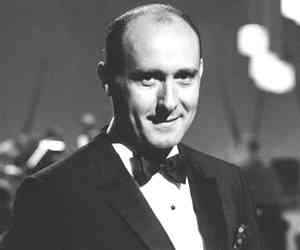 Henry Mancini Source: Note Discover |
Henry Mancini
[1,
2,
3,
4,
5,
6,
7]
might have been listed higher on this page under jazz, but that he greatly
expanded beyond that. He was a pianist born in 1924 in Cleveland and raised
in Aliquippa, Pennsylvania. Mancini
is placed under the popular category because he belongs in the soundtrack
genres for film and television which don't exist in these histories. The
film industry quickly came to be
another limb of classical music insofar as the application of orchestra to drama, like opera had been
for the
last three hundred years. Those who composed for the new screen mediums,
however, weren't especially of classical orientation like
John Towner
Williams. (Broadway musicals, as well, had other
origins than classical music, albeit operatic, as well as jazz, influences
began to appear in the thirties.) Mancini is a preeminent example of the orchestra applied to popular film scores
[*]. He also composed at
least one work of a traditionally classical nature, the orchestral suite,
'Beaver Valley '37' (below). Mancini took up piccolo at age eight, then
switched to piano at age 12. Attending Juilliard after high school, he was
drafted into the Army a year later, his tour in southern Germany liberating
a concentration camp. After service he found work arranging and performing
piano for jazz bandleader,
Tex Beneke, who was running the
reformed
Glenn
Miller Orchestra (Miller having died in '44.) Mancini replaced, pianist,
Vince Lashied, for unissued recordings at the Hollywood Palladium on June 4,
1946, for such as 'Moonlight Serenade'. His
next session with
Beneke
in Chicago on July 16 yielded 'The Woodchuck Song', 'Passe', etc..
Beneke
would be Mancini's engine into 1952, last recording transcriptions
for Thesaurus in NYC early that year, titles like 'Charmaine' and 'Tea For
Two', et al. They reunited for a couple radio broadcasts in January of 1958
at the Hotel Statler in NYC, 'Between the Devil and the Deep Blue Sea' and
'What's New' getting issued on Hep E 8. During Mancini's period with
Beneke
he
married Virginia O'Connor in 1951, she a member of Mel Torme's Mel-Tones. It was 1952 when Mancini joined Universal
Pictures, writing more than a hundred scores for that outfit in the next six
years. His debut movie score was for Abbot & Costello's 'Lost in Alaska',
released in 1952. Other films of note during those years were 'The Glenn
Miller Story' ('54) and 'The Benny Goodman Story' ('56). Mancini is given an
unconfirmed
debut name release date of 1956 per 45cat, which has Mancini issuing 'Four Girls In Town' December of '56, backed by 'Cha Cha Cha for Gia'.
'Four Girls In Town' was the theme to the film of the same title issued in
early '57. Mancini's next 7" vinyl was released in April of '57 by Liberty as
well: 'Big Band Rock and Roll' bw 'Hot Rod'. He released the EP soundtrack
album, 'Peter Gunn', in September of '58 before issues of the Warner Bros.
Military Band that year: 'The Star Spangled Banner' and 'Stars and
Stripes Forever' on 45 (7") in October, followed the next month by what was
Mancini's first LP album, a collection of Sousa marches titled 'Sousa in
Stereo'. (John Philip Sousa,
born 1854, was a military composer and conductor for the U.S. Marines.) His
LP, 'The Music from Peter Gunn', won the first Album of the Year Grammy
Award in 1959. Eight of Mancini's more than ninety record albums, ranging from big band
jazz to cinematic pieces to pop, sold gold (500,000). He he had conducted as
many as
50 performances a year, some 600 concerts at his baton before he was
through. Mancini died on June 14, 1994, of pancreatic cancer in Los Angeles, having written
some of the most beloved compositions of 20th century America for America's
sovereign of the arts, cinema
[*]. Discographies of issues by Mancini
with such as songwriting credits at
1,
2,
3.
Select list of compositions.
Mancini in visual media.
Interviews w Les Tomkins 1963-74. Mancini is listed below per titles
alphabetical rather than by year. Henry Mancini 1962 Film: 'Hatari' Film theme Live performance Conductor & piccolo: Henry Mancini 1978 Orchestral suite Ottumwa SO/David Sharp 1957 1961 Soundtrack suite including 'Moon River' 1956 B side to first name release 1963 Soundtrack suite Lyrics: Johnny Mercer 1962 Film theme Lyrics: Johnny Mercer 1957 1961 Album 1958 Soundtrack Conducting: Henry Mancini 1963 Film: 'The Pink Panther' Film theme Live performance Conductor & piccolo: Henry Mancini 1958 U.S. National March Composition: John Philip Sousa 1897 1946 With Tex Beneke Thought Mancini's 1st issued recording Composition: Tex Beneke/The Crew Chiefs
|
||
|
Patti Page Photo: Associated Press Source: XFinity |
Born Clara Ann Fowler in 1927 in Claremore, Oklahoma, popular
singer, Patti Page, was age 18 when she
made her professional debut on KTUL radio in Tulsa. Becoming a country
feature there with Al Clauser and His Oklahoma Outlaws, sometime in 1946
they recorded 'My Sweet Papa'/'Never Pretend' for release on Skyline 209
that year. Page was in New York City in July of 1947 to lay out something a
little different in 'Every So Often'/'What Every Woman Knows' (Mercury
5061/Sepia 1022) w the obscure Eddie Getz Orchestra. Making Chicago home
base, Page was was quick to plunge into the jazz scene there, holding
several sessions in latter '47 backed by guitarist, George
Barnes and his Trio. Among such were There's a Man in My Life'/'The First
Time I Kissed You' (Mercury 5087/Sepia 1022) from a session on 20 October.
On 3 Dec they recorded 'Confess' for issue on Mercury 5129. That scored
nicely on the pop chart at #12 the next year. Lord's Disco has her w the Benny Goodman
Septet recording 'On the Sunny Side of the Street' for NBC at the Click
Restaurant in Philadelphia
on May 24 of '48. That saw later issue in 2002 in the Wardell Gray
compilation, 'Volume 7: 1947-1948', on Masters of Jazz MJCD 198 [Discogs].
Cole Porter's 'So in Love' went down in latter '48 w unknown musicians,
charting at #13 in Feb of '49. Page dominated the charts to 1958 beginning w
'With My Eyes Wide Open, I'm Dreaming' at #11 in 1950. That was included w
'Confess' on her first album in 1950,
'Patti Page' on 10" Mercury MG-25059. That was followed in '51 by 'Folk Song
Favorites' and 'Christmas with Patti Page 1951'. Page had placed her initial
#1 title, 'All My Love (Bolero)', in 1950 followed by 'The Tennessee Waltz'
the same year. The latter was the
last song to sell a million copies of sheet music to amateur pianists, not
because people stopped playing piano, but because there came to be so much
music to play. 'I Went to Your Wedding' visited #1 in 1952, '(How Much
Is That) Doggie in the Window' in '53. Numerous songs consistently saw high
positions on the charts until 'Left Right Out of Your Heart' at #9 in '58.
The sixties weren't what the fifties were though Page maintained
considerable audience into the early seventies. Having begun her career in
radio, Page was among the first to appear in the new medium of television in
the fifties, hosting 'The Patti Page Show' during the 1955-56 season. Among
Page's more important musical peers was Vic Schoen
[1,
2,
3,
4,
5,
6,
7] famous in
association with the
Andrews Sisters, who became her musical director in 1956. Page's last
song to reach the Top 10 was in 1965 with 'Hush...Hush, Sweet Charlotte', per the
film by the same title with Bette Davis released the prior year. Her last
song to reach the Top 40 was 'No Aces' in 1981. Her first
live album didn't appear until 1998, 'Live at Carnegie Hall'. ;Living in
California, Page performed well into the new millennium, also running a maple
syrup business in New Hampshire with her third and last husband, Jerry Filiciotto.
Page published her memoir, 'This is My Song', in 2009 w Kathdan Books. She outlived her husband by nigh four years,
dying of heart and
lung disease in Encinitas, CA, on New Year's Day of 2013. She was buried in
San Diego. References: 1,
2,
3,
4,
5,
6,
7,
8.
Tribute site. Sessions per Praguefrank's:
1,
2.
Discographies: 1,
2,
3,
4,
5.
Page in visual media.
Interviews: NAMM 1995,
Gary James 2001,
Bruce Sylvester 2003,
OETA 2010,
David Adams ?.
Other profiles: 1,
2,
3. Per
1950 and 1962 below, a couple of brief edits from the 'Ed Sullivan Show', the first as
Page during the big splash of her earliest days, the latter with Page at the
height of her career. Patti Page 1947 Composition: Bennie Benjamin/George David Weiss Patti Page 1948 Composition: Cole Porter: For the musical: 'Kiss Me Kate' Patti Page 1949 Do Nothin' Till You Hear from Me Music: Duke Ellington 1940 Lyrics: Bob Russell Music: Vernon Duke 1936 Lyrics: Ira Gershwin Patti Page 1950 'The Ed Sullivan Show' SnippetComposition: Jack Rael Music: Pee Wee King 1946 Lyrics: Redd Stewart First issue: Pee Wee King Jan 1948 Music: Harry Revel 1934 Lyrics: Mack Gordon Patti Page 1952 Composition: Jessie Mae Robinson 1952 Patti Page 1953 Music: Larry Coleman 1953 Lyrics: Joe Darion Composition: Bob Merril 1952 Patti Page 1954 Composition: Richard Adler/Jerry Ross 1954 For the Broadway musical 'The Pajama Game' Patti Page 1956 Composition: Ruth Lowe Composition: Burt Bacharach/Jack Wolf Erroneously credited on label to Zing-Wexler Patti Page 1958 Television performance With Bing Crosby & Dean Martin Patti Page 1962 'The Ed Sullivan Show' Snippet Composition: See Wikipedia Patti Page 1965 Music: Frank De Vol 1964 Lyrics: Mack David For the film same title Patti Page 1965 Television performance Music: Alex North 1955 Lyrics: Hy Zaret Patti Page 1981 Composition: Bob House/Walt Cunningham Patti Page 1982 Television performance Patti Page 1998 'Jerry Lewis MD Telathon'
|
||
| Andre Previn See Jazz Piano:
Andre Previn. |
|||
|
Born
Vito Rocco Farinola in 1928 in Brooklyn, Italian crooner
Vic Damone [1,
2,
3,
4,
5,
6,
7] switched
Farinola to his mother's maiden name before winning a talent contest on
'Arthur Godfrey's Talent Scouts' in 1947. Becoming a regular on the show
gained him his first recording contract in April 1947, 'I Have But One Heart'
(Mercury 5053) his
first issue that year. He began to air his own radio show, 'Saturday Night
Serenade', the following year. He appeared in his first films, 'The Strip'
and 'Rich, Young and Pretty' in 1951. Serving in the Army from '51 to '53,
upon release from duty he married, then began to appear in films and on
television in 1954 ('The Buick-Berle Show' hosted by Milton Berle). December
1 of 1955 witnessed 'I'll Never Smile Again' and 'Oh, Look at Me Now' with
the
Pied Pipers and a studio
orchestra run by
Tommy Dorsey. During
the summers of '62 and '63 Damone hosted 'The Lively Ones' for NBC
television. In 1971 he began playing Las Vegas, then toured the States and
the UK later that decade. Damone published his autobiography 'Singing Was
the Easy Part', in 2009. Recording more than 2000 songs into the early new
millennium, Damone was retired in Florida with his fifth wife, a fashion
designer, when he died
[1,
2,
3] on 11 Feb of 2018.
Catalogues: 1,
2,
3.
Damone in visual media.
Per 'You're Breaking My Heart' in 1949 below, that was adapted from 'Mattinata' ('Morning') for Damone by Pat Genaro and Sunny Skylar. 'Mattinata' was composed by pianist, Ruggero Leoncavallo, who recorded the song w Caruso in 1903/04
(sources vary)
[1,
2].
Per 'Just Say I Love Her' in 1950, that was adapted from 'Dicitencello vuje'
by Rodolfo Falvo in 1930 w lyrics in Italian (Neapolitan) by Enzo Fusco.
English lyrics by Martin Kalmanoff and Sam Ward. 'Tzena Tzena Tzena' in 1950
was written in 1941 by Hebrew composers, Issachar Miron (Stefan Michrovsky)
and Jehiel Hagges (Yechiel Chagiz). Original lyrics in English were per
Mitchell Parish. Vic Damone 1947 Music: Johnny Farrow Lyrics: Marty Symes Composition: Mack Gordon/Josef Myrow Vic Damone 1948 Say Something Sweet to Your Sweetheart With Patti Page Composition: Sid Tepper/Roy Bennett Vic Damone 1949 Composition: Don Rodney/Hal David Composition: Nat Simon/Jimmy Kennedy Composition: Cole Porter Television performance Composition: See above Vic Damone 1950 Composition: See above Composition: Alexander Borodin/George Forrest/Robert Wright Film: 'Kismet' Composition: See above Composition: Sammy Gallop/David Saxon Vic Damone 1956 Composition: Jerome Kern/Oscar Hammerstein II VVic Damone 1957 Composition: Robert Wright/George Forrest For the musical 'Kismet' 1953 Vic Damone 1962 Composition: Erno Rapes/Lew Pollack Composition: Ray Noble Composition: Charles Henderson/Rudy Vallée Composition: Ned Washington/Victor Young Vic Damone 1963 Composition: Maymie Watts/Sid Wyche You and the Night and the Music Live at Basin Street East Music: Arthur Schwartz 1934 Lyrics: Howard Dietz Vic Damone 1965 Live on Hollywood Palace Vic Damone 1987 Filmed live with Diahann Carroll Kennedy Center Honors
|
Vic Damone Source: Mental Itch
|
||
| Born in 1908 in Toronto,
Ontario,
Percy Faith
[1,
2,
3,
4,
5,
6,
7]
was an arranger, composer and conductor with a jazz lean, though more representative of easy listening. That is, no history of
popular music can be complete without mention of "elevator" or "mood"
music, and Faith was that department's leading figure. Faith first worked professionally
as a child, playing piano or violin at theaters. Initial plans to become a
concert performer got redirected to composing and such upon injuring his
hands in a fire at age eighteen [*]. Some time between then and
1933 he began orchestrating for radio. His first major employment in radio was
with CBC (Canadian Broadcasting Corporation) in 1933 where he broadcasted live
until 1940. In 1940 the Office of the Coordinator of Interamerican Affairs
began broadcasting anti-Nazi propaganda in South America. That would evolve
into the first Voice of America (VOA)
[*] broadcast in Asia in 1941, Germany in 1942,
then worldwide by the end of World War II (39 transmitters in forty
languages). Though Faith made early recordings for Voice of
America no issue of such is found. Faith also recorded for the
Melody Hour (the Carnation Contented Hour renamed for the war effort) during
the war, which program was broadcast
by the Armed Forces Radio Service as well. Another of the US government's
musical projects during World War II was the V Disc (Victory Disc) label in
operation from 1943 to '49
[1,
2,
3,
4,
5,
6,
7]. Faith would later see issue
in Sep 1948 on V Disc 858 per 'What Is This Thing Called Love' [45Worlds],
that bearing Duke Ellington's 'I Like the Sunrise' on Side A. Percy Faith Info begins its
sessionography of Faith in 1944 with an unissued recording of 'If There Is
Someone Lovelier Than You', eventually released on 'North and South of the
Border' (Vocalion VL 3600) in 1958. That also got released on CD on an
unknown date in Spain per 'Percy Faith y su Orquesta' (Jessica CDB
64056/57). Tracks went down the same year for titles eventually issued on
Faith's album, 'Program' (Decca DL 5349), in 1951. See also Faith's own
album sessionography.
Faith recorded his first issued album, 'The Exciting Music of Percy Faith',
in July of 1947 [*]. 'Billboard' magazine has that advertised for sale in
its August 9, 1947 issue. Faith hooked up with Columbia in 1950 to provide orchestral backing for
vocalists in exchange for name releases with his orchestra. Come
Rosemary Clooney for a session on March 9 to result in such as 'The Canasta Song'/'A
Good Time Was Had By All' (Columbia 38767)
[*]. Among
vocalists supported by Faith were
Tony Bennett,
Doris Day,
Johnny Mathis and
Mahalia Jackson. Faith also wrote film
and television scores
[*], 'The Virginian' ('62) perhaps his best known.
With the advent of rock "light" music began to fall from favor and Faith with
it, though he issued rock covers in the early seventies like 'Black Magic
Woman' and 'Jesus Christ Superstar'. Faith's' last recordings
per Percy Faith Info (sessionography above) were in September of '75 toward the album, 'A Summer
Place '76'. 45Cat has the single issued the next month. Discogs has the
album issued the same year. A Summer Place '76' was a disco rearrangement
of Max Steiner's 1959 'Theme from a Summer Place'. Faith died of cancer on
February 9 of 1976 in Encino, California. Discographies with various credits at
1,
2,
3,
4. See also
*.
Faith in visual media. Percy Faith 1947 'The Exciting Music of Percy Faith' See 1949 Varsity reissue of 1947 Majestic Percy Faith 1949 Percy Faith and His Orchestra Play Varsity reissue of 1947 Majestic Percy Faith 1950 What Is This Thing Called Love Composition: Cole Porter Percy Faith 1951 With Sarah Vaughan Composition: Mitchell Parish/Peter de Rose Percy Faith 1953 Composition: José Galhardo/Raul Ferrão Album: 'Continental Music' Music: Valdir AzevedoLyrics: Jack LawrenceWith Felicia Sanders Composition: Georges Auric/William Engvick With Guy Mitchell Composition: Ned Washington/Victor Young Percy Faith 1954 Composition: Percy Faith Percy Faith 1956 Composition: Johnny Burke/James Van Heusen Composition: Neil Diamond/Jack Lawrence/George Van Parys Album: 'Passport to Romance' Sierra Madre (Luna Gitana [Gypsy Moon]) Composition: Arino Palos/George Thorn Album: 'Passport to Romance' Percy Faith 1957 Composition: George Gershwin Percy Faith 1960 Composition: Percy Faith Composition: Max Steiner 1959 Percy Faith 1962 Composition: Ary Barroso LP: 'The Music of Brazil!' Percy Faith 1965 Composition: Alan Jay Lerner/Frederick Loewe 1956 Percy Faith 1972 Composition: Percy Faith Percy Faith 1973 Composition: Ernie Freeman/Joe Saraceno Percy Faith 1975 Composition: Percy Faith Album: 'Summer Place '76' Album: 'Summer Place '76' Composition: Max Steiner 1959 Percy Faith 1976 Emmanuelle - The Joys of a Woman Posthumous issue Composition: Francis Lai 1975
|
Percy Faith Source: Percy Faith Pages |
||
|
Born
Florence Catherine Currier in 1924 in Newton, Massachusetts,
Jane Morgan
(not to be mistaken with the older actress) left home for the Julliard School of
Music to study opera. While there she began performing popular songs at
various venues. Her first steady employment came at the Roseland Ballroom in
Manhattan where she performed six nights a week for $25. In 1944 she was hired by Art Mooney to sing in
his orchestra, at which time she changed her name to Helen Morgan (after
vocalists Janie Ford and Marian Morgan). She is thought to have traveled to
Paris with impresario, Bernard Hilda, in 1947, where her heydays began at
the Club des Champs-Elysées. Lord's disco has her recording as early as
August 14 and 18 in Barcelona, Spain, with
Don Byas: 'Siempre, Siempre' and 'Sonar En Ti',
those issued in Spain on Columbia R16475 per Lord's, no issue date found.
They saw later issue in 1986 by Fresh Sound Records on the Byas compilation,
'1947 Those Barcelona Days'. Morgan and Hilda began appearing on French
television circa 1948, recording for Polydor in '49. Morgan recorded 'C'est Tout'
and 'J'aurais Bien Donne Dix Ans de Ma Vie' in '49,
followed in 1950 by 'Qué Es Este Ruiseñor?' and 'Hey! Ba-Ba Re Bop'. Morgan
apparently returned to the Unites States in 1951 long enough to appear on
the 'Celebrity Time' television show. '52 found her working at the Ritz
Hotel in Montreal, Quebec. Wikipedia has her appearing on NBC radio in NYC w
the NBC Symphony Orchestra before a trip to London in '54. She returned that
year to hook up w Kapp Records. In 1956 she
released her first album, 'The American Girl from Paris'. November of that
year witnessed her release of 'Two Different Worlds' w pianist, Roger Williams.
Followed by
'Fascination' in '57, the title song on that was Morgan's first to
chart, that at #7 in August backed by the Troubadours. Morgan had starred in the 1957 edition of
the 'Ziegfeld Follies'
[1,
2] on Broadway
earlier from March into June. 'The Day the Rains Came' topped the charts in
the UK in Sep of 1958, reaching only #21 in the US. 'Elusive Butterfly'
fluttered to #9 in the States as recently as 1966. Morgan had performed for Charles de Gaulle during her career, as well as
five United States Presidents. Largely retiring in the seventies, she has
six gold records behind her. Yet active as of this writing,
Morgan has owned Blueberry Hill Farm in Kennebunkport, Maine, since 1958.
References: 1,
2,
3,
4.
Discographies: 1,
2,
3,
4.
Morgan in visual media.
Per 1958 below, 'The Day the Rains Came' was adapted from 'Le jour où la
pluie viendra' composed by Gilbert Bécaud w lyrics by Pierre Delanoë sung by
Morgan on the flip side of London HLR 8751. English lyrics by Carl Sigman.
Jane Morgan 1947 With Don Byas Composition: Goetschius/Osser/Rolan Jane Morgan 1950 With the Bernard Hilda Orchestra Composition: Curley Hamner/Lionel Hampton Jane Morgan 1953 Composition: Johnny Richards/Carolyn Leigh Jane Morgan 1955 Composition: Richard Adler/Jerry Ross Musical: 'Damn Yankees' Jane Morgan 1957 With the Troubadours Composition: F.D. Marchetti 1932 Composition: Richard Rodgers/Oscar Hammerstein II Jane Morgan 1958 Composition: Paul Francis Webster/Sammy Fain Live with Louis Armstrong Les Brown Orchestra Composition: See above Jane Morgan 1959 Composition: Enric Madriguera/Eddie Woods Composition: Charles Pasquale/María Grever Composition: Edgar Leslie/Fred E. Ahlert Music: Victor Young 1949 Lyrics: Ned Washington For the film 'My Foolish Heart' Sung in that film by Martha Mears Music: Agustín Lara English lyrics: Ray Gilbert Jane Morgan 1960 Composition: Renato Rascel/Dino Verde Jane Morgan 1962 Composition: Gilbert Bécaud/Pierre Delanoë/Carl Sigman Jane Morgan 1963 Music: Hugh Williams 1935 Lyrics: Jimmy Kennedy Jane Morgan 1966 Composition: Christian Petzold/Denny Randell/Sandy Linzer Theme from 'Mondo Cane' 1962 Live performance Composition: Riz Ortolani/Nino Oliviero Jane Morgan 1969 Composition: Riz Ortolani/Nino Oliviero
|
Jane Morgan Source: Great Entertainers |
||
|
Petula Clark
was born in 1932 in Epsom, Surrey, England
[1,
2,
3,
4,
5]. Hers was a double career as an
actress and vocalist though she began her career at age nine ('41) for BBC
radio. She happened to be at the station with her father when gap time
needed filling. She then sang 'Mighty Lak' a Rose' during an air raid (World
War II). She would sing for radio some 500 times during the War, also
touring with the actress, Julie Andrews,
Andrews only three years older. (Andrews, largely an actress, recorded such
as 'The Sound of Music' in 1965.) Clark was performing at London's Royal
Albert Hall when she got figured for film by director, Maurice Elvey,
casting her in her first role per 'Medal for the General' ('The Gay
Intruders') in 1944 [*]. She would
partake in over thirty films during her career, also acting for television.
Her initial television spot was on the BBC variety show, 'Cabaret Cartoons',
in 1946. Her initial single was 'Put Your Shoes On, Lucy' bw 'There's a
House In the Sky' in 1949 for Columbia. Clark's website has her recording 12
titles in 1949, two of them unreleased demos for the Rank label: 'Doodle-Oodle-Day'
and 'It's Not for the Want of Trying'. Clark couldn't, nevertheless, obtain
a good contract, but her father wanted her on record, so in 1949 he founded
Polygon Records to that purpose with record producer, Alan Freeman. (Polygon
was sold in '55, becoming Pye Nixa Records.) Clark's first eight titles with
Polygon were issued in 1951, the first being 'May Kway' bw 'Clickety Clack'
in May. She began her career in France at the Olympia in Paris and would
soon move across the Channel. In 1964 she issued 'Downtown' in four
languages. Upon Warner Brothers acquiring rights in the States it topped
Billboard at #1 in January of '65. Already long a major name in Europe
(having issued fifteen albums since her first EP in 1955: 'Petula Clark
Sings For Children's Choice'), she now began another rather spectacular
career in the States. 'I Know a Place' saw Billboard's #3 tier in '65 as
well. Then 'My Love' was issued the same year to climb to #1. In 1966 'I
Couldn't Live Without Your Love' rose to Billboard's #9. Clark's last titles
to claim Billboard's Top Ten were in 1967: 'This Is My Song' (#3) and 'Don't
Sleep in the Subway' (#5). Much of the remainder of her career was spent
touring extensively in Europe, the United States and internationally. She
made her last appearance in film in 'Never Never Land' per 1980. She put
television to bed with 'Sans Famille' ('An Orphan's Tale') the next year.
Wikipedia has Clark good for eleven EP albums for Pye and Warner Bros from
'64 to '68. As for LPs, Discogs has her at about
30 studio and live albums,
her latest released in 2016: 'Vu D'Ici'. Having sold more then 68 million
records, composition was elemental to Clark's vocation, she
authoring or co-authoring extensively. She wrote such as 'Two Rivers' ('65),
'Things Bright and Beautiful' ('69) and 'Here for You' ('98). Discos of
78 rpm and
45 rpm issues.
Songwriting credits also at
1,
2.
Lyrics. Clark's was a highly active career with little R&R, though she
liked to ski. She currently divides her time between quarters in England,
France and Switzerland. Petula Clark 1949 Film: 'The Huggetts Abroad' Composition: Jack Fishman/Peter Hart It's Not for the Want of Trying Composition: Jack Fishman/Peter Hart Film: 'Don't Ever Leave Me' Composition: Hank Fort Composition: Jack Palmer/Clarke Van-Ness Petula Clark 1954 Composition: Rudi Revil: 'Le petit cordonnier' Lyrics French: Francis Lemarque (Nathan Korb) Lyrics English: Geoffrey Parsons/John Turner Petula Clark 1955 Telecast Music: Ethelbert NevinLyrics: Frank Lebby Stanton Petula Clark 1964 Film Composition: Tony Hatch Petula Clark 1965 Composition: Tony Hatch Telecast Composition: Tony Hatch Petula Clark 1966 I Couldn't Live Without Your Love Composition: Tony Hatch/Jackie Trent The Life and Soul of the Party Composition: Tony Hatch Petula Clark 1967 Composition: Tony Hatch/Jackie Trent 'Dean Martin Show' Composition: Tony Hatch Petula Clark 1972 Telecast with Bobby Darin Composition: Boudleaux Bryant Petula Clark 2003 Filmed at the Olympia Paris Composition: Tony Hatch Petula Clark 2013 Telecast Composition: Tony Hatch
|
 Petula Clark 1968 Source: Pop History Dig |
||
|
Mary Ford & Les Paul Source: Gibson |
Guitarist and vocalist Mary Ford [Iris Colleen Summers *] bounced in all manner from country to jazz to popular to rhythm and blues. Known largely for her duets with Les Paul, she was born in 1924 in El Monte, CA, to an evangelical family which toured the country preaching and singing the gospel at revival gatherings. Originally performing as Colleen Summers, at age nineteen she formed a trio called the Sunshine Girls w Vivian Earles and June Widener, the latter the sister of country guitarist and vocalist, Jimmie Widener, whom they supported. They performed w Jimmy Wakely in the 1944 film, 'I'm from Arkansas'. Goldin traces them to as early as 26 April 1945 on the 'Hollywood Barn Dance' radio show at KNX in Los Angeles [*/ transcriptions: 12 May '45, 19 May '45, ?]. Ford was working for KXLA in Pasadena (now KRDC) when she met Les Paul in 1945 [among multiple versions of how they met: *]. They first performed together in 1946 in Waukesha, Wisconsin, at the Club 400 [*]. Ford went on to perform on Gene Autry's 'Melody Ranch' radio show from July to Nov of '46 [*]. The Country Music Hall of Fame has her on the 'All Star Western Theatre' radio show on an uncertain date in 1946 [transcriptions: 1, 2]. Come 1947 Ford and Paul were touring together. Paul changing her name from Summers to Mary Ford, they also became romantically involved, Paul married to Virginia Webb at the time. In January of 1948 Summers drove the car in which they were touring off the road in Oklahoma, seriously damaging Paul's right elbow. Requiring Paul well above a year to heal from injuries, his wife and children moved to Chicago from his home in Los Angeles where Ford acted as Paul's nurse until he was able to resume playing guitar. Praguefrank's estimates a date possibly as early as spring of '49 when they held a session in Hollywood resulting in Ford singing vocals on 'Until I Hold You Again' [*] to get issued flip side of 'You Can't Expect Kisses from Me' on Capitol 57-623 in time for a review in the 25 June 1949 issue of 'The Cash Box'. That was followed by their marriage in Dec 1949. The OTRR Library lends an audition date of as early as 30 March 1950 for the NBC radio program, the "Les Paul Show' [transcriptions: 1, 2]. A date of 12 April 1950 is given in Praguefrank's for Ford's vocals on 'Jealous' (Capitol 1014 on 78 shellac/ F1014 on 45 vinyl) w 'Nola' flip side. That date also witnessed 'Dry My Tears'/'Cryin'' (Capitol 1088/ F1088). She added vocals to 'Sugar Sweet' in August 1950 toward Capitol 1192/ F1192 w 'Goofus' flip side. Come 'Tennessee Waltz' in the autumn of 1950 to see issue on Capitol 1316/ F1316 w 'Little Rock Getaway' flip side. TsorT has 'Tennessee Waltz' charting at #1 on Cashbox, #6 on Billboard. 'How High the Moon' topped Billboard at #1 in March of 1951 and rocked for 25 weeks. 'Tiger Rag' reached #2 in June of '52 followed by 'Vaya Con Dios' topping the charts in '53. Ford's musical relationship w Paul ended along w divorce in Dec 1964. Praguefrank's tracks them to as late as '62 and '63 for titles all of which Discogs has issued in mono in '62 on 'Swingin' South!!' (Columbia CL 1928), in stereo in 1963 on Columbia CS 8728. A date circa Feb 1963 has them recording toward 'Move Along Baby'/'Gentle Is Your Love' (Columbia 4-42754). Ford and her sisters, Carol, Eva and Esther are thought to have supported Ray Foley's issue of 'The New Sound of American Folk' in 1962. Ford had issued her first solo title, 'Dominique' (Calendar 619), in 1963. Wikipedia has her w her sisters and brother, Bob, performing at the Crescendo in Los Angeles sometime thereafter. Ford died of diabetes in 1977 in Arcadia, California, and was buried in Covina. Discographies for Ford: 1, 2, 3, 4. References for Ford w Paul: 1, 2, 3, 4, 5, 6, 7, 8. Discographies for Ford w Paul: 1, 2, 3, 4, 5. Paul collaborates with Ford in all but the last track below. Mary Ford 1950 Music: Pee Wee King 1946Lyrics: Redd Stewart Mary Ford 1951 Music: Morgan Lewis 1940 Lyrics: Nancy Hamilton Music: Carl Jularb 1951 Lyrics: George Vaughn Horton Mary Ford 1952 Composition: Eugene Gifford/Ned Washington Mary Ford 1953 Composition: Les Paul Composition: ODJB 1917 'Go with God' Composition: Larry Russell/Inez James/Buddy Pepper Mary Ford 1954 Composition: Ted Daffan Television performance Mary Ford 1955 Composition: Don Robertson 1955 Composition: Les Paul Television performance Composition: 1955: Les Paul/Monty Ford/Celia Ryland Mary Ford 1958 Composition: Al DeFelice/Ray Buzzeo Mary Ford 1963 Composition: Jeannine Deckers 1963 Lyrics English: Noël Regney
|
||
| Plas Johnson See
Jazz Sax:
Plas Johnson. |
|||
|
Guy Mitchell Source: HWOF |
Born Albert George Cernik in
1927 in Detroit, popular singer, Guy
Mitchell [1,
2], got relocated to Los Angeles as a child. Mitchell had a brief career in rock n' roll, he otherwise a vocalist of the
popular climate. He issued a version of rockabilly in 1957 titled just that,
'Rockabilly', preceded by 'Crazy with Love' and 'Singing the Blues' in '56,
also along the rockabilly vein. Mitchell began his
life as an entertainer at age eleven, signing on with Warner Brothers with
intentions of becoming a film star. He also sang for KFWB in Los Angeles soon after in '38.
Working as a saddle maker after high school, among his first
pro gigs upon graduating was with country musician, Dude Martin,
upon moving to San Francisco. Much of Mitchell's music was of a country
atmosphere. Mitchell joined the Navy in 1945. Upon release
in 1947 he hooked up with the Carmen Camarillo Orchestra with
which he first
recorded under his birth name, Al Cernik,
on December 17, 1947, to yield 'I Go in When the Moon Comes Out' and 'Ah,
But It Happens' (Decca 24488). (Camarillo's orchestra also recorded the
instrumental, 'Summer Moon'.) Mitchell's second session as Cernik w the
Camarillo Orchestra was on December 22 for 'Dream Girl' w 'Encore,
Cherie' (Decca 24330). 'Evelyn' went down for issue on Decca 24410. (The
instrumental, 'La Mer', also went down along with 'The Little Old Lady of
Threadneedle Street', unissued.) Praguefrank's next places Cernik in New
York City for a session in December of 48 or March of '49 for titles without
release data: 'Aw My Evengeline' and 'When It's Night Time Down in Sunny
Tennessee'. Those were w the Steve Sacco Orchestra. On Valentine's Day that
year he recorded 'The Love Nest' (MGM 10443) and 'Don't Tell My Heart' (MGM
10387) with the Buddy Kaye Quintet. Mitchell recorded his next
tracks as Al Grant w the Dewey Bergman Orchestra resulting in 'Cabaret'/'I
Do, I Do, I Do' (King 15004), the latter title with Louise Carlyle. That
session also saw 'Forget Me Not' (King 15045) and 'This Day Is Mine' (King
15005). A session on April 20 witnessed 'Lover's Gold' (King 15005) w the
Leon Merian Orchestra. A session on August 10 w the Satisfiers Foursome came
to 'I Thought I Was Dreaming'/'I've Got a Frame Without a Picture' (King
15016) and 'You're the Sweetest Thing' (King 15045). 'I Wish I Had a Record'
wouldn't see issue until 1959 on the LP, 'Sincerely Yours' (King LP 644) w
other tracks here mentioned. Praguefrank's gives Mitchell's final recording
as Al Grant on August 16 with Barbara Cameron for 'Love Birds' (King 15019).
Mitchell's initial titles as Guy Mitchell also went down in New York City:
'Giddy Up!'/'Where in the World' (Columbia 38822), those on April 12, 1950,
with the
Percy Faith Orchestra. 'Angels Cry'/'You're Not in My Arms Tonight'
(Columbia 38931) was backed by
Faith's orchestra on July 26.
Faith also
supported Mitchell w
Rosemary Clooney on 'Marrying for Love'/'You're Just in
Love' (Columbia 39042) on October 21 with 'The Place Where I Worship'/'The
House of Singing Bamboo' (Columbia 39054). Mitchell's first session backed
by the Mitch Miller Orchestra was on
November 2, 1950, for 'My Heart Cries for You'/'The Roving Kind' (Columbia
39067). 'My Heart Cries for You' flew to
Billboard's #2 spot in December.
'The Roving Kind' reached #4. 'Sparrow in the Tree Top' found branch #8 in
March of 1951. 'My Truly Truly Fair' rose to Billboard's #2 tier in June.
'Belle, Belle, My Liberty Belle' saw #9 in August. More strong titles ensued
to 'Pittsburgh, Pennsylvania' to see Billboard's #4 in March of 1952.
'Singing the Blues' rang the till at #1 in October 1956. 'Rockabilly' came
to #10 in April of '57. Mitchell's last Top Ten title was 'Heartaches By the
Number' at #1 in October of 1959, after which he trailed on the charts. Mitchell
released the LP, 'Songs of the Open Spaces' in 1953 with at least eight
following to 'A Garden in the Rain' in 1985. He appeared in his initial film
role in 1953 as well: 'Those Redheads from Seattle' w 'Red Garters'
following the next year. Mitchell never became the film star as he'd have
liked as a youth, though he contributed to a few soundtracks, such as for the
films above, and appeared on television numerously both as a singer and
actor. Married thrice, Mitchell died on July 1, 1999, from complications
arising from surgery for cancer. Mitchell wasn't a composer. Numerous of his
titles were written by Bob Merrill including: 'Sparrow in the Tree Top',
'Pittsburgh, Pennsylvania', 'My Truly Truly Fair', 'Feet Up (Pat Him on the
Po-Po)', 'Belle, Belle, My Liberty Belle' and 'She Wears Red Feathers'.
Songwriting credits for titles by Mitchell at
1,
2,
3,
4.
Mitchell in visual media.
See also Jazz Song: Guy Mitchell and Fifties Rock: Guy Mitchell. Guy Mitchell 1956 Composition: Aaron Schroeder 'Ed Sullivan Show' Lip-sync Composition: Melvin Endsley Guy Mitchell 1957 Composition: Woody Harris/Eddie Deane Guy Mitchell 1958 Composition: Aaron Schroeder/Ben Weisman Guy Mitchell 1959 Composition: Harlan Howard
|
||
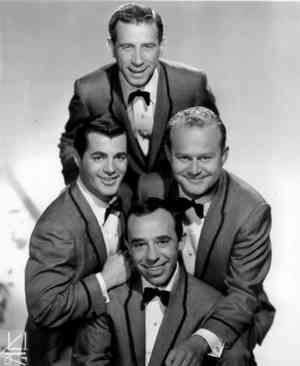 The Four Lads 1969 Source: Planet Estambul |
Formed in Toronto, Ontario,
The Four Lads
[1,
2,
3]
began giving performances in 1950.
Original members of the vocal quartet were Corrado Codarini (bass), James
Arnold (lead), Frank Busseri (baritone/manager) and John Toorish (tenor).
They were hired by
Mitch Miller in NYC as a backup group, among their first appearances on vinyl being with
Johnnie Ray in 1951: 'Cry' (Hot 100 #1) and 'The Little
White Cloud that Cried' (Hot 100 #2).
Those gave them a little exposure with 'Cry' at #1 on the R&B, 'Little White
Cloud' at #2. The lads made their debut release in 1952 with 'The Mocking Bird' bw 'I May
Hate Myself In the Morning' (Okeh 4-6885). That breached the
Top Thirty at #23, the Lads
releasing numerous Top Ten titles: 1953 'Istanbul' October #10 US 1954 'Skokiaan' September #7 US 1955 'Moments to Remember' September #2 US 1956 'No, No, Not Much' January #2 US 'Standing on the Corner' April #3 US 1957 'Who Needs You' January #9 US 'Put a Light in the Window' December #8 US 1958 'There's Only One of You' April #10 US The Lads had joined Frankie Laine in 1954 for 'Rain Rain Rain', that visiting the #30 spot on the Hot 100. issued about about 15 albums starting with 'Stage Show' in 1954. Codarini was replaced in 1962 by Johnny D'Arc. Toorish was replaced in the seventies by Sid Edwards. The Lads were inducted into the Canadian Music Hall of Fame in 1984, the Vocal Group Hall of Fame in 2003. D'Arc had died of lung cancer in 1999 in Sacramento. Codarini died in 2010 in Concord, North Carolina. Performing into the new millennium, the Four Lads appeared in the television documentary on location at President Trump's Taj Mahal Casino in 2004: 'Magic Moments: The Best of 50's Pop' [*]. Busseri yet leads a version of the Four Lads to this day. Various songwriting and production credits at 1, 2, 3. Four Lads in visual media. The Four Lads 1951 Backing Johnnie Ray Composition: Churchill Kohlman The Little White Cloud that Cried Backing Johnnie Ray Composition: Johnnie Ray The Four Lads 1952 Composition: D. Jordan The Four Lads 1953 Music: Nat SimonLyrics: Jimmy KennedyThe Four Lads 1954 Composition: August Msarurgwa The Four Lads 1955 Composition: Robert Allen/Al Stillman The Four Lads 1956 Music: Robert AllenLyrics: Al StillmanComposition: Frank Loesser The Four Lads 1957 Composition: Churchill Kohlman/Rhoda Roberts Music: Robert Allen Lyrics: Al Stillman The Four Lads 2014 Filmed live Music: Nat Simon Lyrics: Jimmy Kennedy
|
||
|
Johnnie Ray was born in 1927 in Dallas, Oregon, where no one knew Dallas was in Texas. But it was a remarkably close guess, relatively speaking. Ray was a popular singer who made a few jazz recordings as well. His first issue in 1951 was of his own compisions 'Whiskey and Gin'/'Tell The Lady I Said Goodbye' (Okeh 4-6809). It was also the year of his first arrest for sexually soliciting an undercover vice cop, at a burlesque house in Detroit. He was fined. Ray's first album followed the next year. The R&B song, 'Cry', was written by Churchill Kohlman to lament its way to #1 on the charts where it wept for eleven weeks. Others that sniffled to prevent dripping in Billboard's Top Ten were 'The Little White Cloud That Cried' (written by Ray at #2 '51), 'Here I Am Broken Hearted' (#8 '52), 'Please Mr. Sun' (#6 '52), 'Walkin' My Baby Back Home' (#4 '52), 'Somebody Stole My Gal' (#8 '53), 'Just Walking in the Rain' (#2 '56) and 'You Don't Owe Me a Thing' (#10 '57). Ray's debut album, 'Johnnie Ray', had been issued in 1952, everybody sopping wet already. His initial of several best-selling duets w Doris Day, 'A Full Time Job', visited #11 on the chart in Dec of '52. His last of several albums is thought to have been 'A Sinner Am I' in 1959. The big crybaby complained his way through a decade of great popularity until his career began to drown in the early sixties. His second arrest for sexually soliciting an undercover cop had been in 1959, a bar in Detroit. Trial found him not guilty. He ceased recording, and kicked about doing nightclubs and television in the States, but never did revive his career to its former success. In Europe, where he toured, he remained quite popular. Ray gave his last concert in 1989 in Salem, Oregon. He passed away of liver failure on 24 February of 1990 in Los Angeles References: 1, 2, 3, 4, 5,. Discos: 1, 2, 3. Ray in visual media. Google Newspapers Archive 1952-56: 1, 2, 3, 4, 5, 6, 7. Other profiles: 1, 2. Johnnie Ray 1951 With the Four Lads Composition: Churchill Kohlman 1951 The Little White Cloud That Cried With the Four Lads Composition: Ray Composition: Ray Johnnie Ray 1952 With the Four Lads Composition: Ben Raleigh/Guy Wood Johnnie Ray 1954 Composition: Lincoln Chase 1953 First issue: The Drifters 1953 Johnnie Ray 1956 Television performance Composition: Johnny Bragg/Robert Riley 1952 Johnnie Ray 1957 Ray Conniff Orchestra Composition: Winfield Scott/Dorothy Goodman 1957 Music: Jerome Kern Lyrics: Otto Harbach LP: 'In Las Vegas' Johnnie Ray 1959 Composition: Ray
|
Johnnie Ray Source: Puget Sound Radio |
||
| Lalo Schifrin See
Jazz Piano:
Lalo Schifrin. |
|||
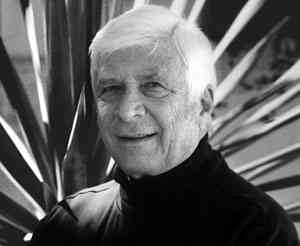 Elmer Bernstein Source: Film Music Society |
|
||
| Vince Guaraldi See
Jazz Piano:
Vince Guaraldi. |
|||
|
Eartha Kitt,
whose repertoire included jazz, was born in South Carolina
in 1927, began her career at age 16 as a dancer with the Katherine Dunham
Company. She made her first film appearance as a member of that troupe in
1948 with the production of 'Casbah'. Kitt made her first recordings in Paris
in January 1950 with Doc
Cheatham for the Disques Swing label (Swing Records): 'I Can't Give
you Anything But Love'', 'Solitude', 'Since I Fell For You' and 'What Is
This Thing Called Love?'. Those weren't released
until 1985 on an LP featuring other 1950
Cheatham recordings in Paris, as well as three other Paris recordings from 1956 with
Bill Coleman. Kitt's
first released recordings were in 1952: 'Monotonous'/'Boston Beguine' (RCA
Victor 19-0027). She
is thought to have recorded 'Tierre Va Temblar' and 'Caliente' in '52 as
well, also appearing on Leonard Sillman's 'New Faces of 1952', a Broadway
revue released on LP. Her next appearance on LP was 'RCA Victor Presents
Eartha Kitt' in 1953. That contained 'Uska Dara (A Turkish Tale)', Kitt's
first title to chart on Billboard at #23. Other strong titles in '53 included
'C'est Si Bon' and 'Santa Baby', both entering the Top Ten at #8 and #4. Kitt's was a full career in
theatre [1,
2],
film [1,
2] and
television. She published her memoir, 'Alone with Me', in
1976 (H. Regnery Co). 'I'm Still Here' followed in 1989 (Barricade Books). Along with recording and touring internationally she
was an activist for disadvantaged youth and peace in Vietnam. Kitt was
professionally active well into the new millennium, dying from colon cancer on Christmas
Day at her home in Weston, Connecticut, in 2008. She had participated in the
musical, 'All About Us', as recently as January 17, 2006. References
encyclopedic: 1,
2,
3,
4; musical
1,
2,
3. Discographies:
1,
2,
3,
4. Compilations:
'I'm Still Here'
by Arista 1989, 'The Collection' by EMI Gold 2006.
Tribute site.
Interviews: 2002,
2006.
Further reading; Broadly, Guardian,
'America's Mistress' by John L. Williams (Quercus 2014).
Other profiles: 1,
2,
3,
4,
5. Per 1948 below, Kitt dances
in the film, 'Casbah'. Eartha Kitt 1948 Katherine Dunham Dance Company Film: 'Casbah' Music: Walter Scharf/Harold Arlen Eartha Kitt 1951 Film: 'Paris Is Always Paris' Music: Roman Vlad Eartha Kitt 1952 Composition: June Carroll/Arthur Siegel: For the Broadway revue 'New Faces of 1952' Composition: Mariano Mercerón Eartha Kitt 1953 Composition: Pedro Infante 1948 Music: Henri Betti 1947 Lyrics French: André Hornez Lyrics English: Jerry Seelen 1949 Composition: Lester Judson/Raymond Taylor 1953 Composition: Joan Javits/Philip Springer 1953 Music: Vincent Scotto 1913 Lyrics French: Jean Rodor Lyrics English: Dorcas Cochran 1952 Eartha Kitt 1955 'I'm Searching for a Man' Composition: Yves Bruyere/Ramon Pina Michel Emer/Georges Pazman Eartha Kitt 1957 Nat King Cole Show Composition: Cole Porter 1938 For the musical 'Leave It to Me!' Eartha Kitt 1962 Music: Philippe-Gérard 1950 Lyrics French: Angèle Vannier Lyrics English: Johnny Mercer First performed: Edith Piaf Eartha Kitt 1970 Composition: Donovan 1968 Eartha Kitt 1986 Composition: Bruce Vilanch/Frank Hudon/Jacques Morali
|
Eartha Kitt Source: Classical Allure |
||
| It was 1952 when
Steve Lawrence
[*] released his first record, 'Poinciana'
[1,
2]. Born Sidney Liebowitz
in Brooklyn in 1927 to Jewish bakers, Lawrence's most popular issues were
'Party Doll' ('57), 'Pretty Blue Eyes' ('59), 'Footsteps' ('60), 'Portrait of
My Love' ('63), 'Go Away Little Girl' ('63), 'Millions of Roses' ('65) and
'I've Gotta Be Me' ('68). In the meantime he and
Eydie Gormé had first partnered in 1954,
releasing their first duets that year: 'Make Yourself Comfortable'/'I've Gotta
Crow' (Coral 9-61313). Their initial appearance together on television was in
'54 on 'Tonight'
[*] hosted by Steve Allen
[*]. They married in 1957 in Las Vegas and remained so
until
Gormé's death in 2013. Their first of
above 25 albums together appeared in 1958: 'Steve and Eydie'.
Their most popular duets were 'I Want to Stay Here' ('63) and ' We Can Make It
Together' ('72). Lawrence's career apart from
Gormé included appearances on Broadway and film,
though his major medium beyond vinyl was
television [*]. As of this writing, Lawrence's latest appearance on television was 'Two
and a Half Men' in 2014. Lawrence had issued 'Steve
Lawrence Sings Sinatra' in 2003. He released the album, 'When You Come Back
to Me Again', as recently as 2014. He has since become victim to Alzheimer's
disease and died in Los Angeles on 7 March 2024. Lawrence catalogues with various credits at
1,
2. Catalogues of Lawrence with
Gormé at
1,
2,
3.
Lawrence in visual media. Steve Lawrence 1952 Composition: Buddy Bernier/Nat Simon Steve Lawrence 1953 Composition: Bert Mann/Leo Corday/Jack Edwards Composition: Schreier/Bottero/Meyers Steve Lawrence 1959 Composition: Teddy Randazzo/Bobby Weinstein Steve Lawrence 1960 Composition: Barry Mann/Hank Hunter Steve Lawrence 1961 Composition: David West (Norman Newell)/Cyril Ornadel Steve Lawrence 1963 Composition: Barry Mann/Cynthia Weil Composition: Gerry Goffin/Carole King Composition: Gerry Goffin/Carole King Composition: Gerry Goffin/Carole King Composition: Ervin Drake Steve Lawrence 1965 Composition: Howard Greenfield/Jack Keller Steve Lawrence 1979 Live with Sammy Davis Jr. Music: Larry Grossman Lyrics: Fred Ebb
|
Steve Lawrence Source: All Music |
||
| Gil Melle See
Jazz Saxophone:
Gil Melle. |
|||
| Howard Roberts See
Jazz Guitar:
Howard Roberts. |
|||
|
John Williams
See
Classical:
John Williams. |
|||
|
Vocal harmony ranges from a cappella (without instruments) chorals of classical or religious music to ragtime-related barbershop quartets to the beach rock of such as the Beach Boys. The Crew Cuts [1, 2, 3, 4, 5, 6] were a Canadian band often associated with doo wop (a capella). Though they did do some doo wop they were really a pop group that simply specialized in four-part harmony alike, for instance, the Four Lads, but with a stronger rock & roll lean. Originally called the Four Tones when they formed in 1952, they changed their name to the Crew Cuts to disassociate themselves from long-hair music (what classical was sometimes called at the time) and better identify with the zeitgeist of the counter culture. As wheels turn, however, upon the British invasion only a decade later it would become the other way around, musicians wearing mops, crew cuts what only military and police recruits received. The Crew Cuts consisted of Rudi Maugeri, Pat Barrett and brothers, John and Ray Perkins, having all graduated from the same high school in Toronto. They were first recorded in 1953 when they appeared on Arthur Godfrey's radio and television show, 'Talent Scouts'. They also made their first recording that year for Thrillwood Records: 'Chip, Chip Sing a Song Little Sparrow'. The group's first titles to chart on Billboard were in 1954: 'I Spoke Too Soon' (#24), 'Crazy 'Bout Ya Baby' (#8), 'Sh-Boom' (#1) and 'Oop-Shoop' (#13). The group also issued its first of above ten albums in 1954: 'Crew Cut Capers'. Several strong titles followed in 1955, including 'Ko Ko Mo' (#6), 'Gum Drop' (#10) and 'Angels in the Sky' (#11). The Crew Cuts fell off the charts altogether after 'Young Love' in Jan of 1957 at #17, finally separating in 1964. Reuniting on occasion throughout the years, one such was as recently as 2004 at President Trump's Taj Mahal Casino for the television documentary, 'Magic Moments: The Best of 50's Pop' [*]. For such as production and songwriting credits see 1, 2, 3. The Crew Cuts in visual media. The Crew Cuts 1954 Composition: Pat Barrett/Rudi Maugeri Composition: The Chords: James Keyes/Claude Feaster/Carl Feaster Floyd McRae/James Edwards The Crew Cuts 1955 Cover of 'Earth Angel' by the Penguins 1954 Composition: Curtis Williams Composition: See Wikipedia The Crew Cuts 1956 Composition: Carole Joyner/Ric Cartey The Crew Cuts 1959 Composition: Eily Beadell/Nell Tollerton Music: Adam Geibel 1895 Lyrics: Richard Henry Buck Music: Ernie Burnett 1912 Lyrics: George Norton
|
The Crew Cuts Source: POPBOPROCKTILUDROP |
||
|
Eydie Gormé Source: Hasta que el Cuerpo Aguante |
Born in 1928 in
the Bronx, Eydie Gormé
graduated from high school in 1946. Fluent in Spanish, she soon acquired a
position as an interpreter at the United Nations. Yet in 1950 she made her
recording debut with the Tommy Tucker Orchestra: 'Powder and Paint' and
'Cherry Stones'. Gormé next worked with
Tex Beneke in 1951
with whom she did some radio recordings: 'Can't We Talk It Over', 'Baby
Oh!', et al. Those can be found on the 1996 issue of
Beneke's 'Dancer's Delight'. Her first
name recordings are thought to have been in '52, released in 1953 on the Coral label:
'I Danced with My Darling'/'I'd Be Forgotten' and 'Frenesi'/'All Night Long'. Not until 1954 did Gormé begin to gather a national audience, that upon appearing on
'Tonight'
(hosted by Steve Allen) with her future husband,
Steve Lawrence. December of 1954
witnessed the issue of their 45, 'Make Yourself Comfortable'/'I've Gotta
Crow'. Gorme released her initial solo album, 'Delight', in 1956. She and
Lawrence married in Las Vegas in
1957 and remained partners in wedlock the rest of their lives while pursuing separate
and joint careers. July of 1963 saw their duet, 'I
Want to Stay Here', reach #8 on Billboard's AC. Gormé is beloved for the
recordings she made with the Trio Los Panchos
beginning in 1964. The next year saw the release of 'Blame It on the Bossa
Nova'/'Can't Get Over (the Bossa Nova)', the latter side with
Lawrence. She and Lawrence placed
'We Can Make It Together' at #7 in 9/1972. Nov 27 of 1976 saw the airing of
their television special, 'Our love Is Here to Stay' [IMDb] in tribute to
George Gershwin. Their
tribute to Irving Berlin [1,
2,
3,
4,
5,
6,
7] aired on 22 August 1978.
1994 witnessed their trio w Frank Sinatra
on 'Where or When' issued on Sinatra's
last studio album, 'Duets II'. They performed their last tour together in
2002 preceding her retirement in 2009. Gorme died [1,
2,
3,
4,
5]
on August 10, 2013, in Las Vegas. References: 1,
2,
3,
4.
Venues: Broadway,
film,
television.
Sessions 1952-55.
Discographies: 1,
2,
3,
4,
5.
Interview w Larry King 2003.
Compilations: 'Eydie Gorme's Greatest Hits' 1967
on Columbia/CBS.
Per 1950/51 below,
recordings are radio transcriptions [1,
2,
3,
4,
5,
6] with jazz musician,
Tex Beneke [Lord's]. Likely
distributed to radio stations upon production, they aren't counted as
commercial releases since musicians weren't paid royalties on transcriptions
excepting flat fees for commercial jingles and to copyright holders.
Transcriptions continued to be useful into the eighties, though largely phased out in the fifties by
magnetic tape recording. The rise of digital over analogue
made them altogether obsolete. See also YouTube 1,
2. Titles below were eventually released in
1996 on the
Beneke compilation by Magic
Records, 'Dancer's Delight'. Eydie Gormé 1950/51 Composition: Frank Loesser 1950 For the musical 'Guys and Dolls' Composition: Milton DeLugg/Willie Stein 1930 Eydie Gormé 1953 Composition: Al Stillman/Bennie Benjamin George David Weiss/Lou Singer Composition: Roy Brodsky/Sid Tepper Eydie Gormé 1954 Music: Moose Charlap Lyrics: Carolyn Leigh With Steve Lawrence Composition: Bob Merrill Eydie Gormé 1957 Music: Turner Layton 1918 Lyrics: Henry Creamer Composition: Beverly Guthrie/Gary Lynes Composition: Harold Arlen/Ted Koehler Composition: Ted Fio Rito/Dan Russo Ernie Erdman/Gus Kahn Eydie Gormé 1959 Composition: Irving Berlin Album: 'On Stage' Eydie Gormé 1963 Music: Barry Mann 1963 Lyrics: Cynthia Weil Music: Carole King Lyrics: Gerry Goffin Eydie Gormé 1964 With the Trio Los Panchos Composition: Gabriel Ruiz/Ricardo Lopez Mendez With El Trio Los Panchos Live Composition: Don Agustín Lara With El Trio Los Panchos Live Composition: Bobby Capó With El Trio Los Panchos Live Composition: Alvaro Carrillo Eydie Gormé 1966 Composition: Al Lerner/Burton Lane Composition: Bob Haggart/Johnny Burke Eydie Gormé 1968 Composition: Alberto Domínguez Eydie Gormé 1969 Composition: Lionel Bart Eydie Gormé 1981 Composition: Buddy Johnson
|
||
|
Joni James Source: Wired State |
Born Giovanna Carmella Babbo in 1930
in Chicago, Joni James began her career as a dancer
upon graduating from high school, touring Canada with a local troupe. She
next worked as a chorus girl at the Edgewater Beach Hotel in Chicago. After
filling the empty spot of a missing vocalist in Indiana James decided to
pursue singing, then was discovered by MGM in a television commercial. James
signed her first recording contract in 1952. A number of her singles
performed quite well on Billboard's Hot 100, including her first issue, 'Why Don't You Believe Me?'
at #1 '52. The James explosion was in '53. In addition to "You're Fooling
Someone" at #11 that year, she placed 'Have You Heard?' at #4, 'Your Cheatin' Heart'
at #2 ,
'Almost Always' at #9 'and 'My Love, My Love' at #8. James reached the Top
Ten twid more in the fifties w 'How Important Can
It Be?' at #2 and 'You Are My Love' at #6 in '55. Her recording career was
in decline by the sixties, her last Top Forty title in 1960 per 'My Last
Date (With You)' getting play at #38. Recording her first long play for
MGM in '53, 'Let There Be Love', James issued prolifically into the
sixties, releasing 37 broad-ranging albums to 'Bossa Nova Style' in 1965
per Wikipedia. James' career resulted in more
than a hundred million records sold and more than 25 albums released. She
retired from the music business upon recording her last LP (above) partly
to care for her first husband (of two) who was in poor health. Some years after his death in 1986
James began performing again, giving concert tours. She is yet active as of
this writing. References: 1,
2,
3,
4,
5.
Discos: 1,
2,
3.
James in visual media.
Culture during the peak
period of James' career in 1953 as seen in 'Radio-TV Mirror' (brief
mention of James). Per 'Believe Me, if All Those Endearing Young Charms'
1960 below, lyrics are from a poem that Thomas Moore set to a traditional
Irish air in 1808. The music to James' version is traced to a score
published by John Stevenson in 1817 [1,
2,
3,
4]. It shares the same
melody as 'Fair Harvard', alma mater of Harvard University w lyrics by
Reverend Samuel Gilman in 1811. Joni James 1953 Composition: Lew Douglas/Frank Lavere/Katherine Lichty Composition: Lew Douglas/Frank Lavere/Roy Rodde Composition: Fred Rose/Hy Heath: Composition: Robert Hayes/Archie Gottler/Leroy Rodde Composition: Bob Haymes/Nick Acquaviva Composition: Michele Galdieri/Gino Redi/Shelley Dobbins Composition: Lew Douglas/King Laney/Roy Rodde Composition: Pee Wee Maddux/Al Britt Composition: Hank Williams Sr. 1952 Composition: Frank Lavere/Leo Fox Wally Griffin/Wayne Muir Composition: Harry Warren/Joe Young/Mort Dixon Joni James 1954 Composition: Nick Acquaviva/Ted Varnick Composition: Sammy Fain/Irving Kahal Joni James 1955 Composition: George & Ira Gershwin Television performance Composition: 1955 Bennie Benjamin/George David Weiss Composition: Edward Heyman/Victor Young Joni James 1956 Composition: Ned Washington/Victor Young Joni James 1957 Composition: Edgar Leslie/Horatio Nicholls Joni James 1958 Composition: Abner Silver/Benny Davis Joni James 1960 Believe Me, if All Those Endearing Young Charms Composition: See above Composition: Arthur Colahan Composition: Chauncey Olcott Composition: Richard Rodgers/Oscar Hammerstein II Joni James 1962 Composition: Don Robertson/Howard Barnes 1953 Joni James 1963 Music: Erroll Garner 1954 Lyrics: Johnny Burke Composition: Hugh Williams/Jimmy Kennedy Joni James 1964 Composition: Mitchell Parish/Edoardo Verde
|
||
| Michel Legrand See
Jazz Piano:
Michel Legrand. |
|||
| Martial Solal See
Jazz Piano:
Martial Solal. |
|||
|
Born Genaro Louis Vitaliano in the Bronx in 1930,
Jerry Vale [1,
2,
3] sang as a child
as a shoeshine boy. He began his professional career while yet in high
school. Vale scratched his first discs in December 1952 for Columbia Records. He first
appeared, however, on the 'Ted Mack Amateur Hour' in 1950. To go by
Classic Bands and
Musician Guide, Vale held his first session to issue on 23
December 1952 to lay out 'You Can Never Give Me Back My Heart' which 45Cat
has released on 23 January of 1953 w 'And No One Knows' flip side per
Columbia 4-39929. (He issued before artists above, page descending in alpha
for the year.) That charting at #29 on Billboard, he was backed by the
Percy Faith Orchestra, as was
the release of his first LP, 'Girl Meets Boy', in 1954 with
Peggy King. Vale also
placed a couple more titles on charts in '54: 'Two Purple Shadows' at #20
and 'I Live Each Day' at #29. It
took another decade to reach a Top Ten tier, that with 'Have You Looked into
Your Heart' topping the chart in 1964 at #1 on the AC. Vale placed four more titles in
the Top Ten to 1968: 'Dommage, Dommage (Too Bad, Too Bad)' (#5 '66), 'In the
Back of My Heart' (#5 '67), 'Time Alone Will Tell' (#6 '67), and 'Don't Tell
My Heart to Stop Loving You' (#6 '68). Vale had been
awarded a Gold Record in 1963 for his rendition of 'The Star-Spangled Banner', often
played at sporting events thereafter. (Similar to Kate Smith's 'God Bless
America', recorded in December of 1940, often played at major events.) Vale also performed 'The Star-Spangled Banner' at Yankee
Stadium over the years. He owned the minor-league team, the Daytona Beach
Admirals, as well. Vale's autobiography, 'A Singer's Life', was published in
2000, written with Richard Grudens. He died on 18 May 2014 at his home in Palm Desert, California.
Discographies: 1,
2,
3,
4.
Compilations: 'Jerry Vale's Greatest Hits'
by Columbia 1961.
Vale in visual media.
NAMM interview 1994. Jerry Vale 1953 Composition: Milton Kabak Composition: Dick Sanford/Sammy Mysels You Can Never Give Me Back My Heart Composition: Joe Marsala/Adele Girard Jerry Vale 1955 Composition: Frank Loesser Jerry Vale 1956 Composition: Harry Warren/Jack Brooks Composition: Cindy Walker/Eddy Arnold Jerry Vale 1957 Composition: Steve Allen Jerry Vale 1963 U. S. National Anthem Melody: John Stafford Smith c 1773 Poem: Francis Scott Key 1814 Composition: Buddy Kaye/Ted Mossman Jerry Vale 1968 Composition: Carl Sigman/Charles Danvers
|
Jerry Vale Source: PDX Retro |
||
|
One would be hard-pressed to say squeaky-clean crooner, Pat Boone [*], ever indulged in rock and roll. But a few of the tracks below reveal something of the influence of rock on popular music, howsoever tamed. Born in Jacksonville, Florida, in 1934, Boone was 19 when he married Shirley Lee Foley, daughter of Red Foley and Judy Martin. He matriculated into Lipscomb University in Nashville about that time, followed by Texas State University in Denton (now the University of North Texas). Boone soon landed an appearance on the 'Ted Mack Amateur Hour' followed by the Arthur Godfrey's 'Talent Scouts' [1, 2]. At yet age nineteen Boone recorded his debut tracks in Nashville in May of '53: 'Until You Tell Me'/'My Heart Belongs To You' (Republic 7049 '54) [*]. His next session October wrought 'Remember to Be Mine'/'Half Way Chance with You' (Republic 7062). His first session in '54 was on March 2 to yield 'I Need Someone'/'Loving You Madly' (Republic 7084). His next titles in 1955-56 were distributed by Dot, followed by Versailles. Boone's first title to chart on Billboard was 'Two Hearts' at #14 in April of 1955. 'Ain't That a Shame' reached #1 in July. 'At My Front Door' scaled to #7 in October. Boone placed 18 further titles in the Top Ten into the early sixties for a total of 21:
I'll Be Home #4 (#1
UK) 2/56 In the meantime Boone had appeared in his first film in 1955, a music documentary addressing disc jockey, Bill Randle, titled 'The Pied Piper of Cleveland'. Come 'Bernardine' and 'April Love' in 1957. Wikipedia has Boone appearing in about eighteen more documentaries and films to as late as 'A Cowgirl's Story' in 2017. Boone's first of above seventy albums [*] arrived in 1956, 'Pat Boone', followed the same year by 'Howdy'. His latest was the gospel album, 'Legacy', issued in 2014. In 1959 Boone began to represent General Motors, to succeed Dinah Shore's spot in singing the praises of the Chevrolet. Among highlights in the sixties for Boone was the opportunity to majority own the American Basketball Association's Oakland Americans, later renamed the Oakland Oaks from '67 to '69. Beyond music, basketball was Boone's thing, a sport he yet plays in his eighties. During the early seventies Boone issued a number of albums as the Pat Boone Family, that consisting of his wife, Shirley, and his daughters, Cherry, Linda, Debby and Laurey: 'The Pat Boone Family' ('71), 'All in the Boone Family' ('72), 'In the Holy Land' ('73) and 'The Boone Family Christmas' ('75) [*]. Debby herself went on to a successful career as vocalist [1, 2]. Pat Boone's catalog consists of a strong quantity of gospel music w albums like 'Greatest Hymns' ('74), 'Songs from the Inner Court' ('74), 'Greatest Contemporary Christian Songs' ('04) and 'Sweet Hour of Prayer' ('08). Boone had been jealous over his family image as a devout conservative Christian. Having been careful in his choices of both music and acting roles during his long career, he yet released the album, 'In a Metal Mood: No More Mr. Nice Guy', in 1997. That mix of angel with devil was an interesting experiment that got him temporarily dropped from the 'Gospel America' television program [1, 2, 3, 4]. Boone was elected into the Gospel Music Hall of Fame in 2006. As of this writing, Boone resides with his wife, Shirley, in Beverley Hills. Boone had arranged such as Floyd Cramer's 'Last Date' in 1960. He composed 'The Exodus Song' that year with Ernest Gold. Songwriting credits for titles by Boone at 1, 2, 3, 4, 5. Boone in visual media. Songs below reflect the greater range of a Boone's career from such as soft rock to gospel to jazz. Pat Boone 1954 Composition: Ted Jarrett Pat Boone 1956 Composition: Dimitri Tiomkin/Paul Webster Composition: Stan Lewis/Ferdinand Washington Pat Boone 1957 Composition: Sammy Fain/Paul Webster Composition: Johnny Mercer Pat Boone 1958 Composition: Leroy Abernathy Pat Boone 1959 Composition: Charlie Singleton Composition: J. Leslie McFarland/Aaron Schroeder Pat Boone 1960 Composition: Jesse Cavanaugh/Notalgins/Charles Singleton Pat Boone 1962 Composition: David Hess/Buddy Kaye/Ethel Lee Composition: Neil Diamond/Wes Farell/Bob Feldman/Jerry Goldstein The Pat Boone Family 1972 Composition: David Hess/Buddy Kaye/Ethel Lee Album: 'In the Holy Land' Pat Boone 1973 Composition: Ronnie James Dio (Black Sabbath)
Album: 'New Songs of the Jesus People' Pat Boone 1997
Composition: Ronnie James Dio (Black Sabbath) Composition:
Alice Cooper Television performance
Composition:
Alice Cooper
Composition:
Guns n Roses
Composition: Deep Purple
You've Got Another Thing Coming
Composition: Judas Priest Pat Boone 2014 Composition: Pat Boone Album: 'Legacy'
|
Pat Boone Source: Rock en Mexico |
||
|
The Three Chuckles
Source: Discogs |
The Three Chuckles
[1,
2.
3]
named themselves after a
sugar-sprinkled jelly candy, originally consisting of Tommy Romano
(vocals/guitar), Tommy (Russ) Gilberto (vocals/bass) and Phil Bentl
(accordion). Often associated with doo wop, there was
actually little Harlem, so to speak, about them. The Three Chuckles were
simply a popular three-part harmony group with an inclination toward the
rock of their period. Bentl left the group, replaced by 15 year-old Teddy
Randazzo, before their first single, 'Runaround' backed by 'At Last You
Understand', released in 1954, that their only title to notably chart,
reaching #20 in November. The group released the LP, 'The Three Chuckles' (Vik
LX 1067), in 1956. They appeared in the film, 'Rock Rock Rock', in 1956 as
well before Randazzo left to pursue other avenues within the music industry.
Replaced by Jackie Farrell, the trio suppressed their mirth into final
quietude in 1958. Discographies with various credits at
1,
2. The Three Chuckles 1954 Composition: Cirino Colacrai The Three Chuckles 1956 Composition: Johnny Mercer/Ziggy Elman Composition: Sam & Joe Bertugglia The Three Chuckles 1957 Composition: Moe Jaffe/Clay Boland
|
||
|
Born in
Paris in 1931, Italian dancer Caterina Valente
was fond of languages, singing some fifteen hundred songs in English,
Deutsch, French, Italiano, Neapolitan, Spanish, Portuguese, Dutch, Swedish,
Greek, Japanese and South African during her career. As concerns popular
music, in Germany that translates to schlager
[1,
2,
3] in which Valente was
largely, though a long distance from totally, famous. Going by timelines at the Valente
website, she made her recording debut for Radio Zurich
in early 1953, fifteen songs worth of transcription [1,
2,
3,
4,
5,
6] for radio distribution.
Come November she hooked up w with the Kurt Edelhagen Orchestra w which she
made her debut commercial issue in Germany in March of '54 per
'Istanbul'/'Just You Just Me' on Brunswick 12 025 [45Cat]. Valente made her
debut in film in 1954 as well, appearing in 'Mannequins für Rio' filmed in
'53. Her issue of 'Malaguena' on Polydor 49 424 saw release on her first two
albums in '55: 'A Date With Caterina Valente' (Polydor 45 517) and 'Ein
Gruss von Caterina Valente' (Polydor 45 077) [Discogs]. She also contributed
a couple tracks to the LP by various, 'Bouquet de Mélodies', released in
'55. She crossed the Atlantic
in '55 to appear
on the 'Colgate Comedy Hour' in the US. '56 saw the release of the
album, 'The Hi-Fi Nightingale'. Valente's initial stage appearance in the
US was at the Hotel Pierre in NYC in '57. She began her own television show in
Germany the same year. During the sixties Valente often appeared on American
television broadcasts, especially the 'Perry Como Show' and 'Kraft Music
Hall', the latter of which
Como
was host from 1959 to 1967. 1966 saw Valente on
the 'Danny Kaye Show' with
Louis Armstrong. She
made frequent appearances on the the 'Dean Martin Show' from '66 to '72. She
was married to British pianist, Roy Budd, from 1972 to 1979. Her last stage
appearance in the United States was at the Hollywood Bowl in L.A. in 1987. Her last stage
appearance in Europe was at the Leipzig Opera in 1996. Valente issued above
twenty albums in each of both English and German alone. Lord's Disco has her
recording 'A Briglia Sciolta' (Ariston 102) w arranger and pianist, Guido
Manusardi, as late as 1989. She followed that the next year in Cologne w
tracks toward 'Kurt Weill American Songs' (Bear Family 2000). 'Girl Talk'
(Nagel Heyer 1015) went down as recently as 2000 in Fino Mornasco, Italy,
with harpist, Catherine Michel. Valente currently
resides in Europe as of this writing while maintaining a
Facebook presence.
References: English: 1,
2,
3;
English by Google: 1,
2,
3,
4.
Sessions 1954-60. Discographies:
1,
2,
3;
polyglot. Compilations:
'International' 1975.
Valente in visual media.
Other profiles: Deutsch;
English.
Per 'Stranger in Paradise' in 1959 below, that was adapted by George Forrest
and Robert Wright from
Alexander Borodin's
'Gliding Dance of the Maidens' in the opera, 'Prince Igor', premiering in
1890 in St. Petersburg.
Caterina Valente 1954 With the Kurt Edelhagen Orchester Composition: Jimmy Kennedy/Nat Simon Caterina Valente 1955 With the Monaco Ball Orchestra Composition: Cole Porter With Werner Müller's RIAS Dance Orchestra Composition: Ernesto Lecuona With the Monaco Ball Orchestra Composition: Ernesto Lecuona 1929 Caterina Valente 1957 Television performance Composition: 1957 Harry Belafonte/Irving Burgie (Lord Burgess) Composition: Heinz Gietz/Kurt Feltz Caterina Valente 1958 Composition: Lester Allen/Robert Hill Caterina Valente 1959 Composition: Ernst Bader/Giuseppe Perotti Ralf Arnie/Werner Müller Composition: See above Composition: Bobby Worth/Freddy Martin/Ray Austin Caterina Valente 1960 Composition: Harold Logan/Lloyd Price Caterina Valente 1962 Music: Tony Renis/Emilio Pericoli 1962 Lyrics Italian: Alberto Testa Lyrics English: Ervin Drake Caterina Valente 1963 Television performance with Bing Crosby Caterina Valente 1964 'Hollywood Palace' Drums: Louie Bellson/Shelley Manne Irv Cottler/Philly Joe Jones Caterina Valente 1970 Television performance Music: Jimmy McHugh Lyrics: Harold Adamson Caterina Valente 1975 Live performance Music: Ernesto Lecuona Lyrics: Al Stillman Live performance
Composition: Ernesto Lecuona |
Caterina Valente Source: Film Star Postcards |
||
| Klaus Doldinger See
Jazz Sax:
Klaus Doldinger. |
|||
|
The Four Voices
[*] were a vocal ensemble
based in NYC
sometimes called a doo wop group, though there was less deep-rooted rhythm and blues
about them than simply pop harmony that was doo-wop fashioned on individual
occasions. Consisting of Allan Chase (lead tenor), Sal Mayo (tenor), William
McBride (baritone) and Frank Fosta (bass), the Four Voices arrived to their first recording contract after
an appearance on Arthur Godfrey's radio and television program, 'Talent
Scouts'. That resulted in their first record release in 1955 ('Honest
Darling' with 'Hey Honey', followed by 'The Big Eyes' with 'Darling, Thanks
to You'. The Voices placed their only title to speak of on Billboard in
March of 1956 with 'Lovely One' reaching #20. Their only other charting
title was 'Dancing with My Shadow' in March of 1958. Issuing numerous plates
into the sixties, none found much audience, the Voices dissolving in 1962
after releasing 'Everybody Loves Saturday Night'/'The Toast' (Peacock 114).
They never issued an album. Catalogues w various credits at
1,
2. The Four Voices 1956 Composition: Fred Weismantel Composition: Fred Ebb/Larry Coleman/Paul Klein Composition: Fred Weismantel The Four Voices 1957 Composition: Augustus Stevenson/David Hill The Four Voices 1958 Composition: Lenny Adelson/Lyn Murray The Four Voices 1960 Composition: Peter Udell/Gary Geld
|
The Four Voices Source: Doo-Wop Blogg |
||
|
Connie Francis Source: Getty Images |
Born in Newark, New Jersey, in 1934, popular singer, Connie Francis (Concetta Rosa Maria Franconero) [1, 2, 3, 4, 5, 6 7], was a girl of Italian heritage with an accordion until advised to lose the instrument and just sing. Though she didn't stick with it, she early had a rock and roll sense of things. Her first record release in 1955 ('Freddy' with 'Didn't I Love You Enough' B side) was not received well. But she was only about seventeen, and in a few more years she would be on her way to becoming a household name in modern American music. In 1957 her duets with Marvin Rainwater, ''The Majesty of Love' b/w 'You, My Darlin' You', reached Billboard's Hot 100. Her October 1957 recording of 'Who's Sorry Now?' topped charts in the UK at No. 1, reaching #4 in the US in April the next year [1, 2]. The LP was issued in '58 [*]. Her recordings breached the Top 10 eight more times by 1960. Her 1959 album, 'Connie Francis Sings Italian Favorites', reached the No. 4 spot in the United States as well. In 1960 she claimed the No. 1 tier on the US charts twice in a row for 'Everybody's Somebody's Fool' and 'My Heart Has a Mind of Its Own'. Recording 'Everybody's Somebody's Fool' in German, it became one of total of seven of her songs to reach No. 1 in Germany. Starting with 'Many Tears Ago' in 1960, Francis began recording in numerous languages, she fluent to some degree in Spanish and Italian. Though she had previously lent her voice to singing parts in films, in 1960 she accepted her first movie role in 'Where the Boys Are' [*]. By the mid sixties Francis was an international star, popular even in the Soviet Union where rock n roll wasn't welcome. But like other artists who carried the ball during rock's rather lame period in the early sixties, making it ripe for the British Invasion, the arrival of the Brits spelled the demise of Francis' career. Her last song to reach the Top 10 was 'Jealous Heart' at #10 in Nov '65. Francis was, however, far from finished, continuing to record and perform into the new millennium. During those years Francis endured a number of trials: being raped at a Howard Johnson's motel in 1974 (lawsuit against that chain for inadequate security worth $2.5 million), nasal surgeries in 1977 that required retraining her voice, a Mafia hit in 1981 which victim was her brother, George, followed by manic depression that put her out of commission for several years during the eighties. The nineties saw her live album, 'The Return Concert', in 1995, followed by her tribute to Buddy Holly, 'With Love to Buddy', the next year. The new millennium saw the issue of 'Connie Francis in New York' in 2004. She performed at venues in Las Vegas, San Francisco and Manila, Philippines, in the meantime releasing another live album in 2005: 'Standards Live!'. Francis has written three autobiographies: 'For Every Young Heart' (1963), 'Who's Sorry Now?'' (1984) and 'Among My Souvenirs: The Real Story' (2018). Discographies with various credits at 1, 2. Lyrics to some of her titles at AZ. Francis in visual media. Connie Francis 1955 Composition: Peter Pan/Steve Kirk/Sheldon Hernick Composition: Peter Udell/Gary Geld Connie Francis 1957 Music: Ted Snyder 1923Lyrics: Bert Kalmar/Harry Ruby Connie Francis 1958 Composition: Neil Sedaka/Howard Greenfield Connie Francis 1959
Lipstick on Your Collar
Music: George Goehring Lyrics: Edna LewisConnie Francis 1960 Composition: Manos Hadjidakis Connie Francis 1961 Composition: Lew Brown/Ray Henderson/Buddy De Sylva Connie Francis 1962 Don't Break the Heart That Loves You Composition: Benny Davis/Ted Murry (Murray Mencher) Connie Francis 1965 Composition: Mack David/Marcel Louiguy/Édith Piaf Connie Francis 1966 'Love Theme from The Sandpiper' Music: Johnny MandelLyrics: Paul Francis Webster Connie Francis 1967 Composition: John Barry/Don Black
|
||
|
Shirley Bassey Source: Billboard |
Welsh singer Shirley Bassey released her first recording in Feb of 1956, 'Burn My Candle' [45Worlds]. The song was too "risqué" for the BBC which banned it in Great Britain. That had 'Stormy Weather' flip side on Philips P.B. 558. Born in 1937 in Tiger Bay, Bassey left school at age fourteen to work in a factory and sing at local pubs. Her first professional employment beyond taverns was in 1953 with a traveling variety show, 'Memories of Al Jolson'. She also became pregnant that year, age sixteen, with elder daughter, Sharon. Waiting tables in Cardiff while looking at a difficult future, salvation arrived in booking agent, Michael Sullivan, who got her started touring theatres. From that point onward she was kept a busy girl in her field of work. Additional titles released in 1956 per 45Worlds were 'After the Lights Go Down Low'/'If You Don't Love Me' on Philips P.B. 651 in December. Come her live EP in 1957, 'Shirley Bassey at the Cafe De Paris' (Philips BBE 12113) including a rendition of 'Born to Sing the Blues'. Her debut LP released in '57, 'Born to Sing the Blues', contained a studio version of that. Arriving to the United States in 1957, Bassey recorded for Mitch Miller, producer at Columbia, then headed for Las Vegas to perform at El Rancho Vegas. Her career thereafter was largely twofold between the UK and US. Among Bassey's best-selling issues in the UK was her 1959 album, 'The Bewitching Miss Bassey'. Another of Bassey's most popular releases was 'As Long as He Needs Me' b/w 'So in Love' on Columbia 4490 in July 1960. On Nov 13 of that year she made her debut on American television, singing ''S Wonderful' on 'The Ed Sullivan Show'. Another of her highest selling issues arrived in August of '61 on Columbia DB 4685: 'Reach for the Stars' b/w 'Climb Ev'ry Mountain'. Bassey recorded the theme for the James Bond film, 'Goldfinger', in 1964, that charting in the United States at #8 and #2. Also doing well in the States was her album, 'Something', in 1970. The Bond theme of 1971, 'Diamonds Are Forever', also performed especially well. Her issue of the LP, 'Never Never Never', in '73 again scored high in the States. Another James Bond theme arrived in '79 per 'Moonraker'. In 1976 and '79 Bassey had hosted 'The Shirley Bassey Show' for BBC. Bassey began to draw breath in the eighties after two decades of exhausting career. She continued performing and recording into the nineties, though at a less pressured pace. Bassey was made DBE (Dame Commander of the Order of the British Empire) by Queen Elizabeth II in 1999, the year she released 'World in Union' w vocalist, Bryn Terfel. Into the new millennium she is yet active as of this writing, having issued albums as recently as 'The Performance' in 2009 and 'Hello Like Before' in 2014. Having recorded above a thousand tracks and released 105 singles, 19 extended plays, 35 studio albums, six live albums and 17 compilations [Wikipedia], Bassey maintains an internet presence at Facebook. References: 1, 2, 3. Discographies: 1, 2, 3, 4, 5. Compilations: 'As Time Goes By' 1980, 'The Ultimate' 2003, 'Definitive Collection' 2017. Bassey in visual media. Archives for further reading: *. Other profiles: 1, 2, 3. Shirley Bassey 1956 Composition: Ross Parker Shirley Bassey 1961 Music: Hoagy Carmichael 1938 Lyrics: Ned Washington Shirley Bassey 1964 Live at Carnegie Hall
Shirley Bassey 1967 Composition: Jacques Brel ('Ne me quitte pas') 1959 Lyrics English: Rod McKuen9 Shirley Bassey 1978 Composition: Herman Hupfeld Shirley Bassey 1987 Live Performance Music: Carlo DonidaLyrics Italian: Giulio Mogol Rapetti Lyrics English: Jerry Leiber/Mike Stoller Shirley Bassey 2007 Filmed live in Glastonbury Composition: Cy Coleman/Dorothy Fields
|
||
|
Krzysztof Komeda See
Krzysztof Komeda. |
|||
|
Lennon Sisters See
Lawrence Welk. |
|||
|
Born in
1935 of Brazilian and Spanish heritage in Gilmer, Texas,
Johnny Mathis was early moved with
his family to San Francisco where he was raised toward becoming a singer of
love ballads upon initiating his career as a jazz vocalist.
With the exception of four years at Mercury in the sixties, Mathis made all
his recordings for Columbia. Discovered singing on weekends
at Ann Dee's 440 Club in San Francisco by musical manager Helen Noga and
Columbia producer George Avakian, Mathis' first record release was the album,
'Johnny Mathis', issued in 1956. Mathis first appeared in film the next year
as the piano player in 'Lizzie' performing 'It's Not for Me to Say' and
'Warm and Tender' [IMDb].
He released his highest-selling titles the next year:
'It's Not For Me to Say' and 'Chances Are'.
After recording four albums Mathis wasted no time releasing a Greatest Hits
LP in 1958 followed by his highly popular song, 'A Certain Smile', later
that year, 'Gina' in '62 and 'What
Will Mary Say' in '63. He topped the AC chart as
late as 1973 w 'I'm Coming Home'. The next year he performed w the
Miracles
at the Uris Theatre on Broadway
(now the Gershwin since '83) [IBDB].
Come his album, 'In a Sentimental Mood: Mathis Sings Ellington', in 1990. Releasing more than 200
singles, Mathis put the "popular" in "popular music" with more than 350,000,000 records
sold, making him the third
highest selling recording artist after Elvis Presley and Frank Sinatra.
Mathis released 'Sings the Great New American Songbook' as recently as
2017. His issue of 'I Love My Lady' in 2018 was recorded in 1982. As of this writing Mathis continues to perform,
having embarked on his '60th Anniversary Concert Tour' in 2016. Come his 'Voice of
Romance Tour' in 2019. In addition to music Mathis was a talented golfer (nine holes-in-one) and
published a cookbook in 1982. References: 1,
2,
3,
4.
Discos: 1,
2,
3,
4.
Compilations: 'The Ultimate Hits Collection' 1956-86 by
Columbia 1998.
Mathis at Facebook and
Twitter.
Per 'Danny Boy' in 1965 below, that was set to the traditional Irish
melody, 'Londonderry Air', named by Jane Ross for the county in which she
had documented the tune. Her hearing of it got published in 1855 in 'The
Ancient Music of Ireland' edited by George Petrie. 'Londonderry Air' became
'Danny Boy' in 1910 when British lawyer, Frederic Weatherly, wrote the
lyrics. Such to note is in good keeping with popular music in the United
States insofar as the Irish figure large as popular artists (read the
ballad) in early recording. Johnny Mathis 1956 From the LP 'Johnny Mathis': Composition: Sammy Cahn Alessandro Cicognini Paul Weston 'In Other Words' Composition: Bart Howard 1954 Composition: Richard Rodgers/Oscar Hammerstein II Composition: Don Raye/Gene DePaul Johnny Mathis 1957 Music: Robert Allen 1957 Lyrics: Al Stillman Music: Robert Allen 1957 Lyrics: Al Stillman Composition: Albert Beach Léo Chauliacn Charles Trenet Composition: Abner Silver/Benny Davis Composition: Jerry Livingston/Paul Francis Webster Composition: Sid Jacobson/Jimmy Krondes Composition: Sherman Edwards/Ben Raleigh Composition: Dimitri Tiomkin/Ned Washington Johnny Mathis 1958 Composition: Albert Beach Léo Chauliacn Music: Erroll Garner 1954 Lyrics: Johnny Burke Johnny Mathis 1959 Composition: Richard Rodgers/Lorenz Hart 1937 Johnny Mathis 1960 Television rehearsal Johnny Mathis 1965 Composition: See above Johnny Mathis 1983 Television performance Johnny Mathis 1984 Composition: Paul Anka Michael Jackson Kathy Wakefield Album: 'A Special Part of Me' Johnny Mathis 2011 Composition: Sammy Fain/Paul Francis Webster
|
Johnny Mathis Source: Mi Tocadiscos Dual |
||
|
Tommy Steele Source: Film Star Postcards |
Born Thomas William Hicks in
London
in 1934,
Tommy Steele
(Thomas Hicks) [1,
2,
3,
4,
5,
6,
7/Discos
1,
2] began his career in
rockabilly . He is oft
credited with bringing rock and roll to the island, having been a merchant seaman who played banjo and guitar in skiffle coffee houses
during leaves.
While docked in Norfolk, Virginia, Steele saw a performance by
Buddy Holly, whence upon he decided to trade skiffle for rock n roll.
Had he performed music at the time on American shores that would have placed
him at the avant-garde of the
British Invasion.
Though Steele would later visit America again it wasn't as a rock musician. While yet Tommy Hicks, Steele formed his first
band, the Cavemen, in 1956. He then changed his name and his band became the Steelmen, making their first record release the same year: 'Rock with the
Caveman' backed with 'Rock Around the Town', followed by 'Doomsday Rock' b/w
'Elevator Rock'. 'Rock with the Caveman' reached #13 on the UK
chart in
Oct
1956, 'Singing the Blues' #1 in December. Steele rocked for a couple years
as he began shifting toward
popular showmanship bearing no resemblance at all to R&B or rock and roll.
He took a brief tour of Moscow in 1959. By the time he placed the last of seven titles in the UK Top Ten in May 1960
with 'What a Mouth' at #5 his career in rock had long since seen wind,
though he maintained a strong audience in the UK as a popular performer in visual
media for years to come. Along that vein, in 1966 Steele joined Gene Kelly
in the filming of 'Gene Kelly in New York, New York'. Penguin published Steele's autobiography in 2007: 'Bermondsey
Boy: Memories of a Forgotten World'. Discos of issues w various credits at
1,
2,
3.
Steele in
visual media.
HMR Project. Tommy Steele 1956 Second release Side A Composition: Lionel Bart/Mike Pratt/Tommy Steele Second release Side B Composition: Tommy Steele First release Side B Composition: Tommy Steele First release Side A Composition: Lionel Bart/Mike Pratt/Tommy Steele Tommy Steele 1957 Film Composition: Lionel Bart/Mike Pratt Composition:Lionel Bart/Mike Pratt/Tommy Steele Tommy Steele 1958 Composition: Jimmy Bennett/Lionel Bart Composition: Bob Merrill Tommy Steele 1959 Film: 'Tommy The Toreador' Composition:Lionel Bart/Mike Pratt/Jimmy Bennett Film: 'Tommy The Toreador' Composition:Bernard Cribbins/Sid James/Tommy Steele Tommy Steele 1960 Composition: Robert Patrick Weston Tommy Steele 1966 Television performance with Gene Kelly Composition: Walden Cassotto/Johnny Mercer Tommy Steele 1979 Live on the Parkinson Show Composition: Paul Simon Tommy Steele 1992 Live on Aspel Composition: Matty Malneck/I. A. L. Diamond Tommy Steele 2004 Live on the Royal Variety Show
|
||
|
Born in NYC in 1911,
Martin Denny
played piano as a child not yet overly informed that he was to become one of
the three most recognized masters of 20th century exotica [1,
2,
3], his rivals to be
Les Baxter and
Arthur Lyman. During the thirties
Denny toured South America some
four years with the Don Dean Orchestra. After service in the USAAF (Army Air
Forces) Denny studied at the Los Angeles Conservatory of Music and the
University of Southern California. In 1954 he moved to Honolulu to play at
the Shell Bar on Oahu. It was there that he hooked up with
Lyman at vibes, the
latter age twenty-one. Issues by
Baxter were among the
titles they covered. While performing at the Shell, Denny noticed bull
frogs croaking when his band played, and stopping when his band stopped.
Group members began joking around making tropical bird calls and the
subgenre of jazz known as exotica was born. Conceived in the middle of the
Pacific Ocean, such would come to be referred to as Polynesian. (Polynesia
extends from New Zealand 4,300 miles east to Rapa Nui and 4,000 miles north
to Hawaii.) First recording in 1956, Denny's first releases were the next
year: 'Hong Kong Blues'/'Ah
Me Furi' on 7" Liberty F-55089, and the album, 'Exotica', in May.
Lyman left Denny in 1957
after the recording of 'Exotica Vol II' in June that year. His replacement
on Denny's third album, 'Forbidden Island', issued in '58 was Julius Wechter
who would move on to
Herb Alpert's Tijuana
Brass in the early sixties before forming his Baja Marimba Band. In 1962
Denny's group
supported the Si Zentner Orchestra in Hollywood for 'Exotica Suite'. Denny
recorded and toured until the latter eighties when he retired. He died in
Honolulu on March 2, 2005 [obit].
References: 1,
2,
3,
4,
5.
Discographies: 1,
2,
3.
Compilations: 'The Best of Martin Denny' by Liberty 1961;
'The Very Best of Martin Denny' by United Artists 1974.
Denny in visual media.
Chord charts for guitar.
Interviews: Dana Countryman 1997; NAMM 2003.
Further reading: Exotica and the
Tiki -
connection.
Other profiles: 1,
2. Martin Denny 1957 Composition: Les Baxter Album: 'Exotica' Album Martin Denny 1958 Composition: Denny Album: 'Forbidden Island' Martin Denny 1959 Composition: Norman Warren Martin Denny 1962 Composition: Bobby Scott/Ric Marlow Album: 'A Taste of Honey' Martin Denny 1968 Album Martin Denny 1980 Album
|
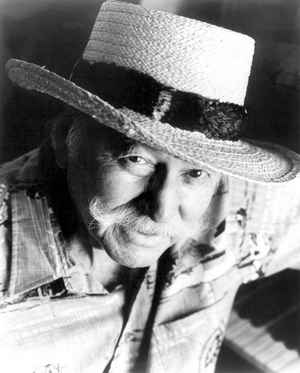 Martin Denny Source: Fyrtarnet |
||
|
Born in 1929 in Mannford, Oklahoma, Lee Hazlewood
[1,
2,
3]
was a country/popular songwriter and record producer who began his career in country
to become well-known in that business, but
whose major claim to fame would be as a performer with
Nancy Sinatra. Upon discharge from military service as a disc jockey in
Japan and Korea in 1953 Hazlewood ended up in Phoenix working as a disc
jockey for KCKY. It was 1955 in Phoenix that he founded Viv Records and the Debra Publishing
Company. [1,
2,
3.]
Hazlewood recorded his
first demos for himself on an unidentified date in
1955: 'Five More Miles to Folsom' (included on Bear Family's 'Phoenix
Panorama' (BCD 15824) in 1995. 'It's an Actuality' got slipped inside Light
In The Attic's 'Trouble Is a Lonesome Town' (LITA 096) in 2013.
Praguefrank's has
Al Casey assisting with guitar on that, Casey one of
Hazlewood's more important comrades during those hectic early years. Jimmy Spellman was the first musician to sign up with Viv in
September. Discogs has Spellman's 'Give Me Some of Yours' bw 'No Need to Cry Anymore'
issued in '55 per Viv 78 1000. It was also 1955 when Hazlewood
produced
Duane
Eddy's first tracks, 'Soda
Fountain Girl' and 'I Want Some Lovin' Baby' (EB X Preston OP 212 in April '56
per
45cat). Praguefrank's
has Hazlewood recording more demos with Casey sometime in 1956: 'I Guess
It's Love' and 'Fort Worth' would get included on 'Trouble Is a Lonesome
Town' (above). 'Buying On Time' got included on Bear Family's release of
'Demons Martians & Fools Like Me' in 2015 per BCD 17419. Hazlewood's first major
catch was his composition, 'The
Fool', originally credited to his wife with the partially imaginary name of
Naomi Ford so he wouldn't encounter trouble playing his own records as a
disc jockey. 'The Fool' was released in May of 1956 by Sanford Clark on Dot
and climbed to Billboard's #7 spot. Hazelwood's first session to issue was
for 'Guitar Man' (Dot 15563) in April of 1957, released per Goldmine that
year. Backing him on that were Al Casey (guitar), Corky Casey (guitar),
Jimmy Wilcox (bass) and Connie Conway (drums). Come January of 1958 for
'Pretty Jane' and 'Want Me' as Mark Robinson released on Tee Gee 104 and Jamie 1158. Those
were
followed by a session circa Feb 1960 as vocalist on '(Why Must I Die) The Girl On Death Row' bw
'Words Mean Nothing' with the Duane
Eddy Orchestra on the Jamie label 1103. That was produced by Hazlewood
and Lester Sill. Hazelwood would produce the majority of his own titles
throughout his career. In
December '61 or January '62 Hazlewood recorded 'Don't Cry (No More)' and
'Della' as Mark Robinson again (Smash S-1734 issued Feb '62 per
rocky52). Another session sometime
in 1962 witnessed 'Can't Let Her See Me Cry'/'I've Made Enough Mistakes
Today' (Sylvester 10,000). Hazlewood released the EP
album, 'The Lee Hazlewood Autobiography', in 1963 on Mercury MEP 87. He also
produced and contributed to compositions on 'Until You've Heard The
Shacklefords You Ain't Heard Nothing Yet' (Mercury MG 20806), the
Shacklefords consisting of Al Casey, Bert Dodson, Billy Strange, Hal Blaine
and James Burton. Hazlewood issued his first
LP in 1963: 'Trouble Is a Lonesome Town'. (He reissued that in 1969 on his
own label, LHI.) 1965 saw the issue of 'The N.S.V.I.P.'s (Not So Very
Important People)'. 1966 saw 'Friday's Child'. Hazlewood had begun producing
for
Nancy Sinatra
in Hollywood in 1965 per one of his compositions, 'So Long Babe', that gone
down with Mirriam Eddy's 'If He'd Love Me' for issue on Reprise 0407. 'So
Long Babe' was
Sinatra's first title to chart at #86 in Oct '65. Circa
November that year Hazlewood produced a couple more of his compositions for
Sinatra,
'The City Never Sleeps at Night' and 'These Boots Are Made For Walking'
(Reprise 0432), the latter becoming a #1 title for
Sinatra in January of
1966. Hazlewood produced
Sinatra's debut album recorded circa November of
1965 in Hollywood: 'Boots' (Reprise RS 6202). Among titles he composed on
that was 'I Move Around'. Hazelwood is thought to have founded
LHI (Lee
Hazlewood Industries)
Records in 1966 with Kitchen Cinq its first client. Per
45cat and
Discogs,
'Determination'/'You'll Be Sorry Someday' (LHI 17000) was that label's first
release in Nov of 1966. Kitchen Cinq's album, 'Everything But', ensued in
1967 [*] as well as titles by the Shacklefords
[*].
Hazlewood charted only one title by himself during his career, that 'Trouble
Maker' in 1969 at an invisible #116. He
charted often as a composer,
however, notably co-writing titles with
Duane
Eddy. Hazlewood had produced
Eddy's 'Rebel Rouser' circa March of 1958, that reaching Billboard's #6 spot
in June. Hazlewood's 'Houston' reached #2 on the AC in August 1965, that
issued by
Dean Martin. Hazlewood composed three titles for
Nancy Sinatra
that scaled to the Top Ten in 1966: 'These Boots Are Made for Walkin'' (#1
Jan), 'How Does That Grab You, Darlin'?' (#7 Apr) and 'Sugar Town' (#5 US #1
AC Nov). In 1975 Bobby Rice issued Hazlewood's 'Freda Comes, Freda Goes' to reach
Country's #10, that composed with Roger Cook and Roger
Greenaway. 'These Boots Are Made for Walkin'' ranked as high as #14 for
Jessica Simpson as recently as 2005. Albeit well-known within the music
industry, the general public was less familiar with Hazlewood excepting his
comradeship with
Sinatra.
Praguefrank's has Hazlewood and
Sinatra first recording together circa
February/March of 1966 for 'Sand', that released in 1967 with a May/'67
recording of 'Lady Bird' (Reprise 0629). They recorded 'Summer Wine'
together in London circa April of 1966. That was their first title together
to chart at #49 [*].
As Hazlewood continued producing for
Sinatra they partnered on 'Oh Lonesome
Me' and 'Jackson' in April of '67. The latter scaled to Billboard's #14 in
June. Hazlewood and
Sinatra
worked so well
together that the pair released the album, 'Nancy & Lee', in 1968. 'Nancy &
Lee Again' followed in 1971. Between those two albums Hazlewood laid out
titles with Ann Margret: 'Sleep in the Grass'/'Chico' (LHI 2). Titles put
down together in 1969 were 'Dark End of The Street'/'Victims of the Night' (LHI
5), 'Walk On Out of My Mind'/'Hangin' On' (LHI 11). Those also saw issue w
other songs on their collaboration, 'The Cowboy & The Lady' (LHI S 12007),
released in '69. A country
musician at heart, Hazlewood went to Stockholm, Sweden, to
record the LP, 'Cowboy in Sweden', issued in September 1970. He issued ten
more to 1977 ('Back on the Street Again'), then ceased recording until
'Gypsies & Indians' in 1993 in collaboration with Anna Hanski. Wikipedia has
Hazlewood issuing above thirty albums before his last in 2006: 'Cake Or
Death', tracks for that gone down that year in Stockholm and Berlin ('First
Song of the Day'). He died on August 4, 2007, of renal cancer. Among
Hazlewood's
numerous compositions were 'Long Black Train' and 'Look at That
Woman' in 1963. He had written Sanford Clark's 'A Cheat' for release in 1956
and Ann Margret's 'You Turned My Head Around' in '68. Authorial credits for
titles by Hazlewood at
45worlds and
australiancharts.
Hazlewood in visual media. Per 2006 below, all tracks are from Hazlewood's
'Cake Or Death'. Lee Hazlewood 1958 As Mark Robinson Backed by Duane Eddy Composition: Lee Hazlwood Lee Hazlewood 1960 Backed by Duane Eddy Composition: Duane Eddy/Lee Hazlewood Lee Hazlewood 1962 Composition: Loy Clingman Composition: Eddie Curtis Lee Hazlewood 1962 The Lee Hazlewood Autobiography Side 1 The Lee Hazlewood Autobiography Side 2 Composition: Lee Hazlewood LP: 'Trouble Is a Lonesome Town' Lee Hazlewood 1966 Composition: Lee Hazlewood LP: 'The Very Special World of Lee Hazlewood' Lee Hazlewood 1967 Music video with Nancy Sinatra Composition: Billy Edd Wheeler/Gaby Rodgers (Jerry Leiber) Music video with Nancy Sinatra Composition: Lee Hazlewood Music video with Nancy Sinatra Composition: Lee Hazlewood Lee Hazlewood 1968 Composition: Lee Hazlewood LP with Nancy Sinatra: 'Nancy & Lee' Album Lee Hazlewood 1970 Film Composition: Lee Hazlewood LP: 'Cowboy In Sweden' Composition: Len Moseley LP: 'Cowboy In Sweden' Lee Hazlewood 1971 'Rolf Harris Show' BBC Composition: Lee Hazlewood Album Lee Hazlewood 1975 Composition: Lee Hazlewood Soundtrack: 'A House Safe for Tigers' Lee Hazlewood 2006 Composition: Lee Hazlewood/Claudia Stülpner Composition: Lee Hazlewood/Tommy Parsons Composition: Lee Hazlewood Composition: Lee Hazlewood
|
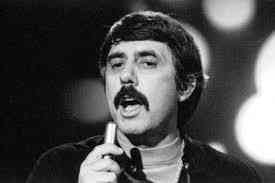 Lee Hazlewood Source: Rocky 52 |
||
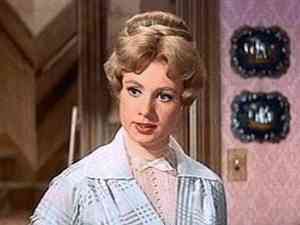 Shirley Jones 1962 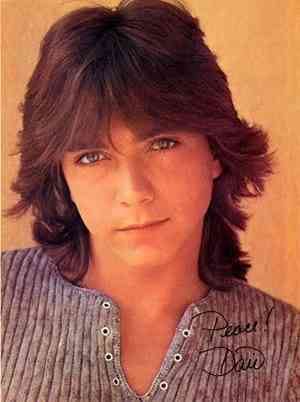 David Cassidy Source: Russ & Gary's |
Shirley Jones
[1,
2]
was born in Charleroi, Pennsylvania, in 1934. She landed her first role in
television in 1950: 'Fireside Theatre' (also known as 'Jane Wyman Presents'
or 'The Jane Wyman Show'). Intent upon becoming a
Broadway star she landed her first role in letter 1953 as a nurse in 'South
Pacific', with which cast she remained until the show closed in January of
1954. She was also a chorus girl in 'Me and Juliet' which began its run in
1953. Her career broke out upon being cast for the lead role in the film
musical, 'Oklahoma!', in 1955. Such as 'Carousel' ('56), 'April Love' ('57)
and 'The Music Man' ('62) followed. It was while filming 'Oklahoma!' that she
met popular entertainer, Jack Cassidy
[*], who had had a son named David (below) with
actress, Evelyn Ward. Jones' marriage to Jack would produce Shaun, Patrick
and Ryan Cassidy. In 1957 Jack and Shirley released 'Speaking of Love'
together. They also appeared on the recorded release of the musical,
'Brigadoon', that year. Jones released her first name vinyl later that year,
'Clover in the Meadow' bw 'Give Me a Gentle Girl', both from the film, 'April Love'. In 1969 she turned down the role of the mother, Carol Brady,
for the television sitcom, 'The Brady Bunch'. But the next year she would come to
large renown as the widowed mother in 'The Partridge Family' television
sitcom [*]. The program ran four seasons and made the Partridge Family a
household name until David Cassidy [Bios:
1,
2,
3/Discos:
1,
2] tired of
bubblegum pop and quit to pursue
his own solo career. The Partridge Family
[1,
2,
3/Discos: 1,
2] consisted of Jones, David Cassidy
(lead born 1950), Susan Dey (keyboards born 1952)
[1,
2], Danny Bonaduce (guitar
born 1959) [Bios:
1,
2/Discos:
1,
2/Twitter], Suzanne Crough
(percussion) [*] and Jeremy Gelbwaks (drums)
[*]. Gelbwaks was replaced by Brian
Forster [*] after the
Family's first season. David had made his professional debut in the
Broadway musical, 'The Fig Leaves Are Falling', in 1969. He'd begun his long
career in television per 'The Survivors' the same year. 'The Partridge Family Album' was released in
1970 to exceed a million copies.
Five more followed to sell a million copies each, the last to tally thereat
being 'Notebook' in 1972. The group issued its eighth and last LP in 1973:
'Bulletin Board'. Jones and Jack Cassidy divorced in 1974, about the time he
began exhibiting bipolar behavior. He died two years later, falling asleep
on his couch with a lit cigarette. David Cassidy had issued his first name
vinyl in 1971: 'Cherish' bw 'All I Wanna Do (Is Touch You)'. The LPs,
'Cherish' and 'Rock Me Baby' followed in 1972. He would release 12 studio
albums, three live LPs and two soundtracks into the new millennium. Dey
would move onward to a career in television and film, Bonaduce in film, television
and radio. He had released several titles in 1972 (age 13) that would be found on his
1973 album, 'Danny Bonaduce'. Jones went on to a full career in theatre and television. She
appeared in the film, 'Beyond the Poseidon Adventure', in 1979. She issued
the first of several solo LPs in 1989: 'Silent Strength'. Her latest issue
was 'A Tribute to Richard Rodgers' in 2011. All members of the Partridge
Family are yet living as of this writing with the exception of Suzanne Crough who died
of ventricular dysplasia in 2015. Credits for titles by Jones at
1,
2.
Credits for Cassidy and/or the Partridge Family at
*. Lyrics for the
Partridge Family at *. Shirley Jones 1955 Film: 'Oklahoma!'
Composition: Rodgers & Hammerstein
Shirley Jones 1956 Film: 'Carousel'
Composition: Rodgers & Hammerstein
Shirley Jones 1957
Composition:
'Brigadoon' with Jack Cassidy
Composition: Paul Webster/Sammy Fain
Soundtrack: 'April Love'
Composition: Paul Webster/Sammy Fain
Soundtrack: 'April Love'
Composition:
Frederick Loewe
'Brigadoon' with Jack Cassidy
Composition:
Frederick Loewe
'Brigadoon' with Jack Cassidy
Composition:
LP with Jack Cassidy: 'Speaking Of Love'
Shirley Jones 1958
Filmed with Frank Sinatra
Composition: Rodgers & Hammerstein Shirley Jones 1959
Composition: Rodgers & Hammerstein
'Danny Thomas Show'
Shirley Jones 1962
Composition:
Soundtrack: 'The Music Man'
Partridge Family 1970
Composition:
LP: 'The Partridge Family Album'
Composition: Wes Farrell/Danny Janssen
Theme song of 'The Partridge Family'
Point Me in the Direction of Albuquerque
Composition: Tony
Romeo
LP: 'The Partridge Family Album'
David Cassidy 1971
Composition:
David
Cassidy/Terry Kirkman
Partridge Family 1971 Composition: Mike Appel/Jim Cretecos/Wes Farrell LP: 'Up to Date' Telecast Composition: Wes Farrell/Gerry Goffin
LP: 'Up to Date'
Telecast LP: 'Sound Magazine' Composition:
Irwin
Levine/Lawrence Russell Brown
Composition:
Wes Farrell/Paul Anka
LP: 'Sound Magazine'
Partridge Family 1972
Composition:
Irwin
Levine/Lawrence Russell Brown
LP: 'Notebook'
Composition: Tony Romeo/Wes Farrell
LP: 'Shopping Bag'
Composition:
Barry
Mann/Phil Spector/Cynthia Weil
LP: 'Notebook'
Danny Bonaduce 1973
Composition: LP: 'Danny Bonaduce' 'Hollywood Palace'
Composition: Paul Simon
Composition:
Irwin
Levine/Lawrence Russell Brown
LP: 'Danny Bonaduce'
Partridge Family 1973
Composition:
LP: 'Bulletin Board'
Composition: Tony Romeo/Ralph Landis
LP: 'Crossword Puzzle'
Composition:
Wes
Farrell/Danny Janssen/Bobby Hart
LP: 'Bulletin Board'
Composition:
LP: 'Crossword Puzzle'
Composition: Mark James
LP: 'Bulletin Board'
Composition:
Wes
Farrell/Danny Janssen/Bobby Hart
LP: 'Crossword Puzzle'
David Cassidy 1974 Filmed live
Composition:
Johnny
Cymbal/Peggy Clinger
Shirley Jones 1989
Composition: LP: 'Silent Strength'
LP: 'Silent Strength'
David Cassidy 2014 Filmed live
Composition: David Cassidy/Terry Kirkman:
Composition: Wes Farrell/Danny Janssen
Filmed live
David Cassidy 2016 Filmed live
|
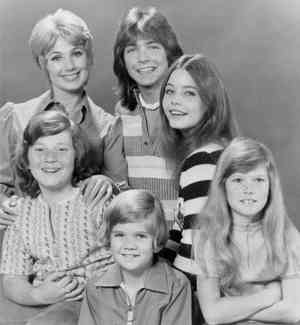 The Partridge Family 1972 Source: Music Cultures |
|
| Born
in 1932 on the island of Oahu in Hawaii
(territory at the time),
Arthur Lyman
played vibes and the marimba (a kind xylophone, which was first developed in
Asia circa 2000 BC, then imported to Africa circa 500 AD to become the
marimba). Lyman was age 21 when he began performing w pianist,
Martin Denny, at the Shell Bar
in Honolulu w issues by
Les Baxter figuring large in
the titles they covered. Lyman's premiere recordings were with
Denny in 1956, releasing
the albums, 'Exotica' and 'Exotica Vol II', the next year. 'Exotica' was the
big splash that launched the exotica
genre [1,
2,
3], often incorporating animal sounds,
especially tropical birds. Since conceived in Hawaii exotica would
come to be referred to as Polynesian.
(Polynesia stretches from New Zealand 4,300 miles east to Rapa Nui and
4,000 miles north to Hawaii.) Lyman left Denny's outfit after
recording 'Exotica II' in June of '57 to form his Arthur Lyman Group
[members].
Lyman and his gang issued 'Taboo' in 1958, followed
by 'Leis of Jazz',
'Hawaiian Sunset', 'Bwana A', 'Legend of Pele', 'Bahia' and 'On Broadway' in
'59 [Discogs, not necessarily that order]. Joining
Denny and
Baxter as one of the three
major names in exotica, Lyman recorded into the seventies while working
clubs and hotels in Hawaii. He also played in Southern California and
Chicago. Lyman died on 24 February of
2002 in Honolulu, having issued above thirty albums. References:
1,
2,
3,
4.
Discographies: 1,
2,
3.
Lyman in visual media.
Further reading: Exotica and the
Tiki -
connection.
Other profiles: 1,
2,
3,
4,
5.
Arthur Lyman 1957 Composition: Les Baxter Album: 'Exotica' Arthur Lyman 1958 Composition: Fujio Ozawa/Masao Yoneyama Album: 'Taboo' Arthur Lyman 1960 Composition: Fujio Ozawa/Masao Yoneyama Album: 'Taboo Vol 2' Arthur Lyman 1961 Composition: Alan Bergman/Marilyn Keith/Norman Luboff Album: 'Yellow Bird' Arthur Lyman 1965 Album Arthur Lyman 1992 |
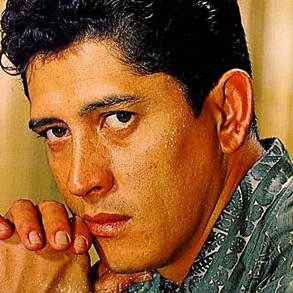 Arthur Lyman Source: All Music |
||
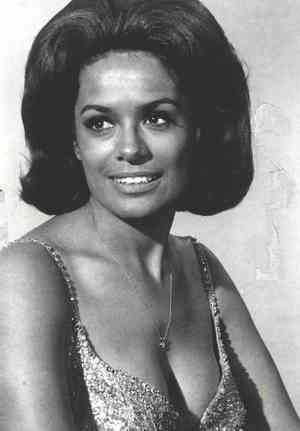 Barbara McNair Source: MEMIM |
Barbara McNair
[1,
2,
3,
4,
5,
6]
was born in Chicago in 1934 but soon moved to Racine, Wisconsin, where she
grew up. Strongly jazz and R&B oriented, she took to popular as well. She began singing as a child in church and school. Later
attending college in Racine and at the American Conservatory of Music in Chicago,
she then headed west to study at UCLA [USC per IMDB] for a year before
removing to NYC where she worked as a secretary while making auditions and
landing work at the Village Vanguard run by Max Gordon. She next acquired
national exposure on Arthur Godfrey's
[1,
2] 'Talent Scouts'
[1,
2,
3].
That found her leaving for California again for gigs at the Purple Onion in San Francisco and the Cocoanut
Grove in Los Angeles. Las Vegas Strip has her performing at the
Silver Slipper Casino in 1956.
She recorded her first issues on an unidentified date in 1957: 'Bobby' bw 'Till There Was You'
(Coral 9-61923). 45Cat has that released in Nov of 1957 per a review in
'The Billboard' on the 25th. The next year she debuted on Broadway in 'The Body Beautiful'. Her
first album, 'Front Row Center', appeared in 1959. McNair was the rage of
television variety shows from Steve Allen's to Ed Sullivan's. In the
meantime she appeared on 'General Hospital' in 1963, beginning a
career in film that year as well per 'Spencer's Mountain'. 'Playboy'
magazine had her posing nude in 1968. McNair is well-known for her second of
four marriages to Rick Manzie, as he was murdered in a Mob related incident
in their home in Las Vegas in 1976. Together with several films McNair
issued six or seven LPs, her last in 1969: 'The Real Barbara McNair'. She
hosted the 'Barbara McNair Show' for three seasons from'69 through '71. Her
acting career would be considerably more extensive, filling roles in such as
'I Spy' ('67) and 'Mission Impossible' ('73) as well as in films like
'Stiletto' ('69). She appeared in her last film. 'Neon Sign' in 1996. Beyond
music McNair liked to stay fit with tennis and skiing. Giving her last
performances in 2006, she died in February
2007 of throat cancer in Los Angeles. Discos of issues by McNair w various
credits at
1,
2. Barbara McNair 1957 Composition: Ben Raleigh/Don WolfComposition: Meredith Willson Barbara McNair 1959 LP: 'Front Row Center' Composition: Rodgers & Hammerstein LP: 'Front Row Center' Music: Burton Lane Lyrics: Yip Harburg
For 'Finian's Rainbow'
1947
Barbara McNair 1961
Composition:
B.
Benjamin/S. Marcus
Barbara McNair 1964
Composition: Jack Segal/Robert Wells
LP: 'The Livin' End'
Composition: Carolyn Leigh/Cy Coleman
LP: 'The Livin' End'
Barbara McNair 1965
Composition:
Richard
Jacques/Ronald Dean Miller
Composition:
Holland-Dozier-Holland
Barbara McNair 1966
Composition: William Robinson Jr.
LP: 'Here I Am'
Barbara McNair 1967
'Dean Martin Show'
Music:
Harold Arlen 1931
Lyrics: Ted
Koehler
Barbara McNair 1969
Album
Barbara McNair 1971 Filmed with Brook Benton Composition: Brook Benton
|
||
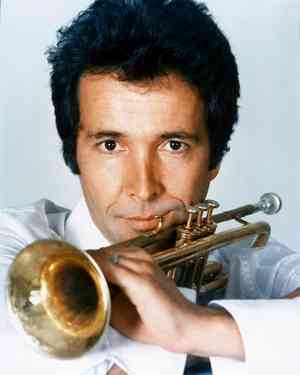 Herb Alpert Source: Jay Dean 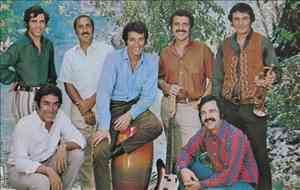 The Tijuana Brass Source: All Music |
Born in Los Angeles in 1935,
jazz trumpeter,
Herb Alpert
[1,
2],
brought a highly stylized touch of another form of folk/popular music, the Mexican
mariachi [1,
2,
3,
4,
5], to the airwaves,
though he himself was Jewish of a Russian father and Romanian mother
[1,
2,
3,
4].
He took that direction as the result of attending his first bullfight in
Tijuana, Mexico, in 1962
[*].
Alpert had joined the Army for a couple years after graduating from high school in 1952
[*], not knowing that he would become not only a hugely popular musician for decades
to come, but founder of A&M Records in 1961
with Jerry Moss, changing the name from their fledgling Carnival Records
which issued 'Tell It to the Birds'/'Fallout Shelter' in July of '62.
45Cat
and
Discogs have Alpert issuing
the novelty tune, 'The Trial', with the jazz number, 'Kiss Me'
(Arch 1607), as Herb B. Lou in
1958, those w Lou Adler as the Legal Eagles. 45Cat has that followed in Jan
of 1959 with 'Sweet Georgia Brown'/'Viper's Blues' (Carol 700) by Alpert and
His Quartet. Come 'Summer School'/'The Hully Gully' (Andex 3-4036) by Alpert
and His Sextet in June. Alpert co-authored 'Wonderful World' with
Sam Cooke and Lou Adler for issue
in 1960 by
Cooke,
the same year he released 'Finders Keepers'/'This Game Called Love' (Madison
M131). Alpert began issuing as Dore Alpert in 1961, releasing 'Gonna Get a
Girl'/'Dreamland' (RCA Victor 47-7918) in July. He released several records as Dore
Alpert into 1964, the first with his own label, A&M, in July of '63:
'Dina'/'You're Doin' What You Did With Me With Him'. It was in 1962 that he
had formed the imaginary Tijuana Brass to issue 'The Lonely Bull', that
appearing on his first LP of the same title that year. The Tijuana Brass at
that time had only one member, Alpert, and a few session players. The huge
success of the album not only put A&M on solid firmament but told Alpert
to put together an actual band called Tijuana Brass. John Pisano (guitar),
Lou Pagani (piano), Nick Ceroli (drums), Pat Senatore (bass), Tonni Kalash
(trumpet) and Bob Edmondson (trombone), none of them Hispanic, made their
debut as the Tijuana Brass in 1965. The Brass were dissolved in 1969 though
Alpert reformed the band a few times into the eighties. None of its original
members were on the release of 'Bullish' in 1984. With the Tijuana Brass
issuing some twenty LPs and Alpert releasing well over twenty more as a solo
artist, Alpert was a busy man with A&M to run as well. In 1987 he and Moss
sold A&M to Polygram Records for $500 million, they remaining to manage
until 1993. The next year Alpert and Moss founded Almo Sounds. In 1998 they
acquired another $200 million from the sale of Vivendi Universal stock. 2000
saw another major legal settlement much to Alpert's favor when he acquired
the rights to his music from Universal, now owner of A&M. Well-known for his
philanthropy in support of the arts and music, Alpert is also an abstract
artist. Yet quite active, Alpert released the album, 'Human
Nature', in 2016. His latest issues per this writing were 'Music Vol 1' and
'The Christmas Wish' in 2017. More the producer than composer, Alpert
nevertheless contributed to numerous titles issued by the Brass or himself.
He'd composed 'The Trial' and 'Kiss Me' in 1958 with Lou Adler. He wrote
'Behind the Rain' for release by Gato Barbieri in 1976. Discography of
issues by Alpert as a solo artist at
*. Discographies of releases by the
Tijuana Brass at
1,
2. Credits for both at
*.
Alpert & the Tijuana Brass in visual media: 1,
2. Per below, Herb Alpert & the Tijuana Brass is shortened to Tijuana
Brass. See also the Herb Alpert Foundation. Legal Eagles 1958 As Herb B. Lou w Lou Adler Composition: Adler/Alpert The Trial
As Herb B. Lou w Lou Adler
Composition: Adler/Alpert
Dore Alpert 1961
Composition: Shari Sheeley Composition: Al Lewis/Howard Simon Dore Alpert 1962 Composition: Frank D'Amico/Alpert Composition: Alpert The Tijuana Brass 1962 Composition: Harry Green/Sol Lake LP: 'The Lonely Bull' Composition: Alpert/Jerry Moss LP: 'The Lonely Bull' Dore Alpert 1963 Composition: Alf Brinton/Alpert You're Doin' What You Did With Me With Him Composition: Bill Young/Bob Pares The Tijuana Brass 1965 Album Music video Composition: Julius Wechter Whipped Cream & Other Delights Album The Tijuana Brass 1966 Album The Tijuana Brass 1967 Album Music video Composition: Sol Lake BBC television special Composition: Sol Lake Herb Alpert 1979 Music video Composition: Andy Armer/Randy Badazz Alpert Herb Alpert 1981 Album The Tijuana Brass 1984 Album Herb Alpert 1997 Filmed in Munich
|
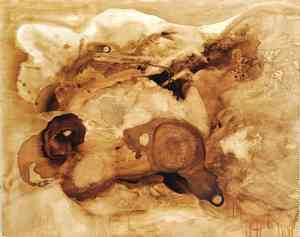 Primal Jungle Painting by Herb Alpert Source: Lorrie's Pop Life Art 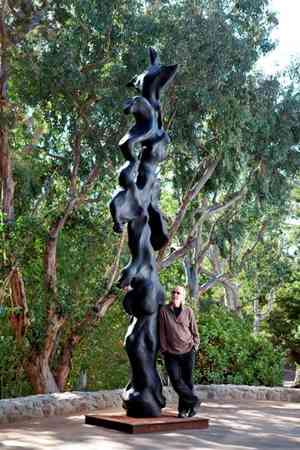 Sculpture by Herb Alpert Photo: Philipp Scholz Ritterman Source: Lorrie's Pop Life Art |
|
|
Carole King
[1,
2,
3,
4]
was born in Manhattan in 1942 to Jewish parents, her father a fireman, her
mother a teacher. She was at the piano at age four and performed at age
eight on 'The Horn and Hardart Children's Hour'. King was yet in high school
when ABC issued 'The Right Girl' bw 'Goin' Wild' in 1958. She issued 'Baby
Sittin' bw 'Under the Stars' in '59, the same year she met songwriter, Gerry
Goffin [*], at Queens College in NYC and married him at age seventeen until
1969. Their
initial collaboration is thought to have been 'Short Mort' bw 'Queen of the
Beach' per 1959. King first charted on Billboard with 'It Might As
Well Rain Until September' (Goffin/King) at #22 in 1962. Her next plates in the sixties
made little impression, although her
compositions brought home some bread
and butter, she and Goffin having already co-authored such as 'Take Good Care of My Baby'
for issue by Bobby Vee in 1961. Among
compositions released in 1962 in which King had a hand were 'Chains' performed by the Cookies, 'The
Loco-Motion' by
Little Eva, 'He Hit Me' by the
Crystals, 'Go Away Little Girl' by
Steve Lawrence and 'Up on the Roof'
by the doo wop group, the
Drifters.
Herman's Hermits issued King's 'I'm
Into Something Good' in 1963. Come 'Don't Bring Me Down' for the
Animals in
1964, 'Porpoise Song' for the
Monkees in '68. King's first of 25 albums, 'Writer',
was issued in 1970. A decade of spinning wheels finally gained traction in
1971 with the album, 'Tapestry', that containing two #1 titles on
Billboard's Hot 100: 'I Feel the Earth Move' and 'It's Too Late', both her
compositions, the latter with Toni Stern. 'Tapestry', winning four Grammy
Awards, would go platinum, as did her next LP that year, titled simply
'Music'. King's next five LPs all accomplished gold: 'Rhymes and Reasons'
('72), 'Fantasy' ('73), 'Wrap Around Joy' ('74), 'Thoroughbred' ('76) and
'Simple Things' ('77). The last, interestingly, made 'Rolling Stone'
magazine's Worst Album list that year. Not a lot of musicians move to Idaho,
which is what King did in 1977 as she transitioned from hot potato to warm,
until the issue of 'The Living Room Tour' 28 years later in 2005. Also
getting retailed at Starbucks coffee shops, that LP came to #17 on
Billboard. 'Live at the Troubadour' would do even better in 2010, going
gold, that a collaboration with
James Taylor who had backed her on
the LPs, 'Writer' and 'Thoroughbred', decades afore. 'Live at the
Troubadour' was the result of the 'Troubadour Reunion Tour', grossing $59
million plus with some 700,000 tickets sold. 2012 was also a big year for
King. As a Democrat concerned about the environment she campaigned for Obama
that year. (She had campaigned for John Kerry in 2003.) She was also
received the Gershwin Prize for Popular Song by the Library of Congress.
Her autobiography, 'A Natural Woman', was published in 2012 as well. In
December 2015 King was honored by the Kennedy Center. As implied above,
composition was essential to King's vocation, she writing the greater
portion of her titles, particularly with
Gerry Goffin. She and Goffin had co-written titles like 'Will You Love Me
Tomorrow?' issued by the
Shirelles in 1960
[*]. She wrote 'Walk On In' and
'After All This Time' for Merry Clayton in 1971, 'Dixie Highway' for
Martha Reeves in '74. She and Mariah Carey collaborated on 'If It's Over' in 1991.
Not mentioned above were three more of King's compositions to top the charts
at #1: 'Been to Canaan' ('72), 'Nightingale' ('75 co-written w Dave Palmer) and 'Only
Love Is Real' ('76). Select list of
compositions by King.
See also *. Discographies of issues with various credits at
1,
2,
3.
Lyrics
at AZ. King in visual media. Along with a
website, King currently maintains pages at
Facebook and
Twitter.
King composed all titles below except as noted. Carole King 1958 Carole King 1959 Composition: Gerry Goffin/King
Under the Stars
Carole King 1970
Filmed with Charles Larkey & James Taylor
Carole King 1971 LP: 'Tapestry' LP: 'Tapestry' Lyrics: Toni Stern Filmed live Lyrics: Toni Stern LP: 'Tapestry'
LP: 'Tapestry'
Carole King 1972
Composition: King/Toni Stern:
Composition: King/Toni Stern: LP: 'Rhymes & Reasons'
LP: 'Rhymes & Reasons'
Composition: King/Toni Stern:
LP: 'Rhymes & Reasons'
Carole King 1981 Filmed live Composition: King/Gerry Goffin Carole King 1982 'Dave Letterman Show' Composition: King/Gerry Goffin 'Dave Letterman Show'
Composition: King/Gerry Goffin
Carole King 1993
Filmed concert
Carole King 2010
Troubadour Reunion Tour
Lyrics: Toni
Stern
Troubadour Reunion Tour
Lyrics:
David Palmer
Filmed with James Taylor Carole King 2014
Musical: 'Beautiful'
|
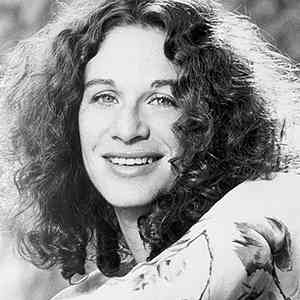 Carole King Source: El Temps Passa |
||
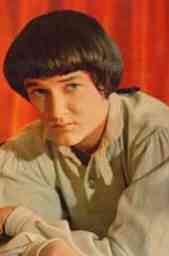 PJ Proby Source: Wiki Visually |
PJ Proby [1,
2,
3,
4] was
born James Marcus Smith in Houston in 1938. He attended military
academies as a youth (with which threat my own parents kept me in check).
Upon graduation Proby went to California to act. Which he did until a bit of
mischief concerning Elvis Presley, beer and a common bed partner found him
chauffeuring for Paul Newman instead
[*]. His first issue was as Jett Powers in
1958: 'Go, Girl, Go'/'Teen Age Quarrel' (Design DSR-811)
[*]. He followed that the next year with
'Loud Perfume'/'My Troubles' (Beta BR 1008). His first release as PJ Proby was in 1961:
'Try to Forget Her'/'There Stands the One' (Liberty F 55367). Starting with those, his
recordings with Liberty through 1972 are available on the 2008 release of
'Best of the EMI Years 1961-1972'. He assumed PJ Proby as a stage name as
suggested by songwriter, Sharon Sheeley, who had had a boyfriend by that
name in high school. In 1963 Proby issued 'Wicked Woman'/'Darlin'' as
Orville Woods (Liberty 55669). His debut album, 'I Am P. J. Proby', followed in 1964, the
same year he moved to Great Britain. He there did spectacularly, recording
and touring until a bit of mischief in January of 1965, his
pant leg splitting on stage from knee to “the most intimate part of Mr Proby’s
anatomy” per one paper
[*]. Proby got off with a
warning, until three nights later his pants tore again. Finding
himself promptly banished from theatre and television in the UK, he nevertheless
continued with his recording career. Proby wasn't well-known in the United
States. His only song to breach Billboard's Top Thirty was 'Niki Hoeky' in
1968. Which would have been great if not for all the mischief, “wine, women,
yachts, Lear jets and a fleet of Rolls Royces” bringing him to one of
multiple bakruptcies in
1968 [1,
2]. By the eighties Proby was doing the club circuit, albeit in
1997 he toured in the role of the Godfather with
The Who in the
production of 'Quadrophenia'. Proby has released some 25 albums since during
his career. His latest is thought to have been 'The Enigma in Gold Volume 3'
in 2016, volumes 1 and 2 released in '13 and '14. (Proby's fourth album as
of
1966 had been titled 'Enigma' as well.) Among titles composed by Proby were
'Ain't Gonna Kiss Ya' for the Ribbons in 1962 and 'I Only Came to Dance with
You' for Pat Powdrill in 1963.
Catalogs of his releases w various credits at
1,
2.
Proby in visual media. Proby is yet active touring as of this writing, also maintaining a
Twitter
page. Jett Powers 1958 Composition: Jett Powers/Ray Gilbert Composition: Jett Powers/Ray Gilbert: Jett Powers 1959 Composition: Maybelle Jackson Composition: Robert Bumps Blackwell PJ Proby 1961 Composition: Dick Glasser Orville Woods 1963 Composition: James Smith (Proby) Composition: James Smith (Proby) PJ Proby 1964 Composition: 1933 Jack Little/David Oppenheim/Ira Schuster
Somewhere
Composition: Leonard Bernstein/Stephen Sondheim Telecast Composition: Rodgers & Hammerstein PJ Proby 1965 Telecast Composition: Paul McCartney Composition: Dick Glasser PJ Proby 1966 Composition: Gerry Goffin/Carole King
Maria
Composition:
PJ Proby 1967
Niki Hoeky
Composition:
Dick Glasser/Lolly
& Pat Vegas
LP: 'Enigma'
Out of Time
Composition:
LP: 'Enigma'
PJ Proby 1969
Guitar: Jimmy Page Composition: Traditional PJ Proby 1970 Composition: Roger Cook/Roger Greenaway PJ Proby 1978
Live at the Astoria Theatre London
PJ Proby 1983
Television performance: 'Greatest Hits of
1964'
Composition:
PJ Proby 2013
Filmed live
Composition:
PJ Proby 2014
LP: 'The Golden Enigma Volume 2'
|
||
|
Boots Randolph
[1,
2,
3,
3]
was born in 1927 in Paducah, Kentucky, but attended high high school in
Evansville, Indiana. He played sax, trombone and vibraphone in the US Army.
Upon discharge he headed for Deactur, Illinois, where he played with the Kopy
Kats for six years from '48 to '54. He would eventually form his own band
but it was as a session player for
Chet Atkins at RCA that his recording
career began in 1958. He that year performed instrumentals and vocals on his first name
release, 'Difficult'/'I'm Gettin' Your Message Baby'. His debut album in
1960 was 'Boots Randolph's Yakety Sax'. 'Yakety Sax' per 1963 was Randolph's
only title to breach the Top Forty at #35 on Billboard's Hot 100. He
otherwise did well in Adult Contemporary through the sixties, but would
become a peripheral figure through the remainder of his career regardless of
the numerous albums he released. His final of well over forty was 'A Whole
New Ballgame', issued on June 12 of 2007 a few weeks before his death on July 3 in
Nashville, Tennessee, of brain hemorrhage
[*]. Discographies of issues by
Randolph w various credits at
1,
2. Randolph in
visual media. Boots Randolph 1958 Telecast Composition: John D Loudermilk Telecast
Composition: James Spider Rich/Pete Dooley Boots Randolph 1960
Composition:
Album Boots Randolph 1964
'Jimmy Dean Show'
Composition: Boots Randolph 1965 Album 'Sweet Talk' composed by: Dick Reynolds/Gene Fiocca Boots Randolph 1966
Album
Boots Randolph 1987
Filmed live
Composition: Don Gibson Boots Randolph 2006
Filmed concert Boots Randolph Unknown
Filmed with Pamela Lind
|
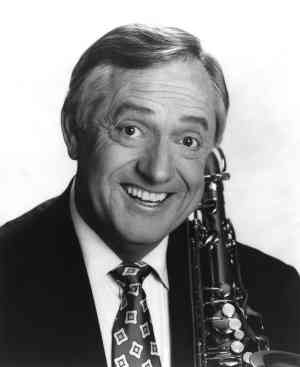 Boots Randolph Source: Alexander Mordium |
||
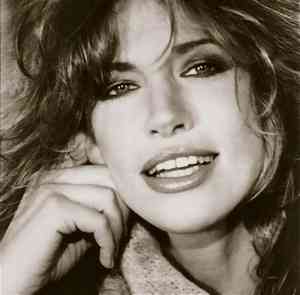 Carly Simon Source: Celebs Net Worth |
Born in 1945 in Bronx,
Carly Simon
[1,
2,
3,
4] was raised Catholic. Her father, Richard, had cofounded Simon & Schuster,
the monstrous publishing house, in 1924. Simon began stuttering at age
eight, to discover that she could sing without stammering, so she began to
write songs. She began her professional career with her older sister, Lucy,
in the Simon Sisters in 1964, the pair issuing 'Winkin', Blinkin' and
Nod'/'So Glad I'm Here' for Kapp in 1964
[1,
2]. The Simon Sisters issued three
albums: 'Meet the Simon Sisters' ('64), 'Cuddlebug' ('64) and 'The Simon
Sisters Sing the Lobster Quadrille and Other Songs for Children' ('69)
before Lucy quit the duo to raise a family with psychoanalyst, David Levine,
whom she had married in 1967. Simon went on to work with Elephant's Memory
for half a year, then recorded 'Long Term Physical Effects' for the
film, 'Taking Off'. Simon's debut album, 'Carly Simon', was issued in 1971.
The LP ranked at #30 on Billboard's chart but wouldn't go gold as did her
next the same year, 'Anticipation', also at #30. She blew off the roof in
'72 with 'No Secrets' commanding Billboard's chart at #1 to go platinum.
'Hotcakes' in '74 charted at #3 and would go gold. 'Playing Possum' in 1975
rose to Billboard's #10 spot. Her seventh LP, 'Boys In the Trees', per 1978
also climbed to #10, but would last, eventually attaining platinum. She
tread water through the eighties until 1987, 'Coming Around Again' to go
platinum. Simon has issued Top Ten and Top Twenty albums into the new
millennium, 'Into White' per 2007 achieving #7. Her most recent issue was in
2009: 'Never Been Gone'. Simon was married to folk musician,
James Taylor from 1972 to '81. In
2009 Bernie Madoff was convicted of stealing $18 billion dollars largely
from banks and Jewish charities (he Jewish himself) in a Ponzi scheme. The
next year Kenneth Starr was convicted of the same as an investment advisor
promising 28% returns. His fraud was worth only around thirty-four million,
but his victims turned out to be a long list of individual celebrities,
Simon among them, losing an undisclosed amount in the millions. Others who
got burned by Starr were Bunny Mellon, Barbara Walters, Al Pacino, Warren
Beatty, Candice Bergen, Sylvester Stallone, Wesley Snipes, Henry Kissinger
and Caroline Kennedy. Also taken were Pete Peterson of the Blackstone
investment firm, Donald Marron, chairman of Citibank, and Howard Stringer,
chairman of Sony [*]. One of those in that list was the topic of Simon's 'You're
So Vain', in 1972, Beatty having been Simon's boyfriend for a brief a time
[*].
Thanks to Beatty, so to speak, Simon's song got her elected into the Grammy Hall of Fame in
2004. She'd already been inducted into the Songwriters Hall of Fame in 1994.
An honorary doctorate from Berklee College of Music followed in 1998. Her
memoir, 'Boys in the Trees', was published in 2015.
Composition had been
elemental to Simon's vocation, she authoring such as 'Anticipation' ('71),
'Legend in Your Own Time' ('71) and 'You're So Vain' ('72). Heinz Ketchup
amusingly employed 'Anticipation' in television commercials during the
seventies concerning the bottle that just wouldn't pour. Songwriting
and production
credits to some of
Simon's issues. Discos
of issues with various credits at
1,
2,
3,
4.
Lyrics at AZ.
Simon in visual media. Simon currently maintains several
social media sites.
Simon wrote all titles below not otherwise noted. Per 1969, 'The
Simon Sisters Sing for Children' ('73) is a later issue of 'The Simon Sisters
Sing the Lobster Quadrille and Other Songs for Children' ('69). Per 1987, all edits are from Simon's concert at Martha's Vineyard. The Simon Sisters 1964 Album So Glad I'm Here
Composition: Bernie Krause/Clarence Cooper Dan Smith/Stuart Scharf Composition: Pete Seeger 'Hootenanny' The Simon
Sisters 1968
'Hootenanny'
Music:
Lyrics from
poem by Eugene Field:
'Wynken, Blynken and Nod' 1889 The Simon Sisters 1969
Music: Lucy
Simon
Lyrics from
'Alice's Adventures in Wonderland':
Charles Dodgson (Lewis Carroll) 1865
LP: 'The Simon Sisters Sing for Children' 1973
Music: Lucy
Simon
Lyrics from
poem by Edward Lear 1871
LP: 'The Simon Sisters Sing for Children' 1973 Carly Simon 1971 LP: 'Anticipation' Filmed live Soundtrack: 'Taking Off' Filmed live Composition: Carly Simon/Jacob Brackman Carly Simon 1972
LP: 'No Secrets'
Carly Simon 1974
Composition: Carly Simon/Jacob Brackman
LP: 'Hotcakes'
Carly Simon 1975
LP: 'Playing Possum'
Carly Simon 1977
Music:
Marvin Hamlisch
Lyrics: Carole
Bayer Sager
Soundtrack: 'The Spy Who Loved Me'
Carly Simon 1978
LP: 'Boys In the Trees'
Carly Simon 1987 Lyrics: See Wikipedia Composition: Carly Simon/Jacob Brackman The Stuff That Dreams Are Made Of
|
||
|
Though born in 1939 in West Hampstead, North London,
Dusty Springfield
[1,
2,
3,
4,
5,
6,
7] came
to much renown in the United States as well. Spingfields' given name
was Mary Isobel Catherine Bernadette O'Brien, she acquiring "Dusty" as a
tomboy in neighborhood football games. Springfield began both her
professional and recording career in 1958 with the Lana Sisters, a trio
consisting of herself, Lynne Abrams and Riss Chantelle
[1,
2,
3,
4]. Their debut release
was 'Chimes of Arcady'/'Ring-A My Phone' in September that year for Fontana.
The Lana Sisters issued 12 titles to their last, 'Two-Some'/'Down South', in
November of 1960. She then formed the Springfields
[1,
2,
3,
4] with her brother, Tom,
and Tim Field, the latter replaced by Mike Hurst some time prior to the
April 1962 release of the single, 'Silver Threads and Golden Needles. The
Springfields' initial issue was 'Dear John'/'I Done What They Told Me To' in
May of 1961. The trio was hugely popular, releasing numerous titles to 'If I
Was Down and Out'/'Maracabamba' in January of 1964. 'Island of Dreams'
reached #5 on the
UK chart in December of 1962. 'Say I Won't Be There' did
the same in March 1963. They also released three
albums: 'Kinda Folksy' ('61), 'Silver Threads and Golden Needles' ('62) and
'Folk Songs from the Hills' ('63). A Springfields anthology exists titled
'On an Island of Dreams', issued in 2007. Hurst has led a new trio since
2011 to the present day with Alice Pitt-Carter and Andy Marlow. As for
Springfield, she released her debut solo name title in December of 1963: 'I
Only Want to Be with You'/'Once Upon a Time'. She released three albums in
1964: 'A Girl Called Dusty', 'Stay Awhile/I Only Want to Be with You' and
'Dusty'. She was already widely heard in the States, largely via 'You Don't
Have to Say You Love Me' in 1966, when she
invaded them,
Tennessee in particular, in 1968 to sign up with Atlantic for the latter '68 issue
of 'Dusty in Memphis' containing the song, 'Son of a Preacher Man'. In the process
of hooking up with Atlantic, Springfield was instrumental in getting
Led Zeppelin signed up as well.
Springfield released the next songs for which she was best known in 1969:
'The Windmills of Your Mind' and 'A Brand New Me', both rising to the #3
spot on
Billboard's AC. She issued her twentieth and last studio LP in 1995: 'A Very Fine
Love'. Her last recording was an ad for an insurance company, 'Someone to
Watch Over Me', included on the posthumous LP per 2000: 'Simply Dusty'. Her
last performance was in December of '95 on the television special,
'Christmas with Michael Ball'. Springfield missed her induction into the
Rock and Roll Hall of Fame in 1999 by two weeks, she dying of breast cancer
on March 2 the prior month in Henley-on-Thames, Oxfordshire
[1,
2]. Springfield had
recorded duets with such as Tom Jones, the Pet Shop Boys and Daryl Hall.
Though not known for composing she had put her hand to 'Once Upon a Time'
('63) and 'Something Special' ('64). Songwriting and production credits to
her titles at *. Discographies of releases with various credits at
1,
2.
Lyrics at AZ.
Springfield in visual media
The Lana Sisters 1958 Telec
Composition:
Lee Morris/Jim Lee
(Seven Little Girls) Sitting
on the Back Seat
Telec Composition: Lee Pockriss/Bob Hilliard The Lana Sisters 1960 Telec Composition: Barry Gordy Jr./Roquel Davis/Gwen Gordy The Springfields 1961
Telecast
Music: Chris Smith 1913
Lyrics: Jim Burris
Composition: Tom Springfield Telecast Composition: Mexican traditional Published 1882 by Quirino Mendoza y Cortés Adaptation/Lyrics: Tom Springfield Composition: Traditional Arrangement: Tom Springfield Composition: Tom Springfield Telecast Composition: Solomon Linda/Hugo Peretti Luigi Creatore/George Weiss/Albert Stanton The Springfields 1962 Telecast Composition: Tom Springfield Silver Threads and Golden Needles Composition: Jack Rhodes/Dick Reynolds 1956 First issued by Wanda Jackson 1956 Dusty Springfield 1963 Telecast Date estimated
Composition:
Mike Hawker/Ivor Raymonde
Composition: Dusty Springfield Dusty Springfield 1967 Telecast Composition: Dusty Springfield Jacques Brel: 'Ne me quitte pas' English lyrics: Rod McKuen Telecast Composition: Irish traditional Traced to 'My Wild Irish Rose': Recorded by John McCormack 1910 Telecast Composition:
Brian
Holland/Lamont Dozier/Eddie Holland
Dusty Springfield 1968
Telecast
Composition:
John
Hurley/Ronnie Wilkins
Dusty Springfield 1969
Album
Filmed live
DVD: 'Dusty in Deutschland' 2012
Composition:
Alan & Marilyn Bergman/Michel Legrand
Dusty Springfield 1979
'Tele Bingo'
Composition:
Bruce Woolley/Geoff Downes/Trevor Horn
Dusty Springfield 1995
LP: 'A Very Fine Love' With Daryl Hall Composition: Diane Warren
|
 Dusty Springfield Source: Da Tu Opinion |
||
 Leslie Uggams Source: Ticket Master |
Leslie Uggams
was born in 1943 in Harlem
[1,
2]. A child star, she first appeared on television
in 1950
in the series, 'Beulah'
[*]. The next year she began opening for such as
Louis Armstrong,
Ella Fitzgerald and
Dinah Washington at the Apollo Theater. That
was followed by appearances on variety shows such as 'The Milton Berle
Show', 'The Arthur Godfrey Show' and 'Your Show of Shows'. 45cat has Uggams
issuing 'Ice Cream Man' bw 'I'm Old Enough' for Roulette in May of '58.
That was followed in July of '59 by 'One More Sunrise' and 'The Eyes of God', the
latter finding its way onto Uggams' debut LP, 'The Eyes of God', that year. As
for television, Uggams appeared on 'The Lawrence Welk Show' before being
hired by
Mitch Miller on whose 'Sing Along With Mitch' television program
she would famously perform from '61 through '64. Uggams would appear on
every other television show in existence during her career, hosting her own in
1969. She has also worked on Broadway and appeared in numerous films since
1962's 'Two Weeks in Another Town'. Having led a varied career, Uggams has
recorded enough to maintain a presence in that medium over the years, yet has a
catalogue of only fifteen LPs upon emphasizing acting. Her latest releases were 'Uptown Downtown' in
2012 and 'Wishing You a Happy New Year' the next year. Uggams was recently awarded an honorary Doctor of Fine Arts from the
University of Connecticut in 2015. Having toured in recent years about the
United States,
she currently performs the role of Leah Walker in the television series,
'Empire'. Uggams discographies w various credits at
1,
2.
Uggams in visual media.
Uggams maintains an internet presence at
1,
2,
3. Samples of Uggams on
'Sing
Along With Mitch' under
Mitch Miller. Leslie Uggams 1952 Telecast with Paul Whiteman Leslie Uggams 1954 You're Too Tall and I'm Too Small 'Your Show of Shows' Leslie Uggams 1958
Composition: Roy Bennett/Sid Tepper Leslie Uggams 1959
Composition: Robert Allen/Al Stillman
Composition: Noel Sherman/Peter Moesser Leslie Uggams 1968 Composition: Jeff Barry/Ellie Greenwich/Phil Spector Leslie Uggams 1969 Everybody Gets to Go to the Moon Telecast Composition: Jimmy Webb Leslie Uggams 1970 Telecast with Tom Jones From 'West Side Story' 1957 Music: Leonard Bernstein Lyrics: Stephen Sondheim Leslie Uggams 1993 Filmed live Composition: Jerry Herman
|
||
|
Born in 1935 in Canonsburg, Pennsylvania, Bobby Vinton [1, 2, 3, 4] put together his first band at age sixteen, eventually to play clubs in Pittsburgh. 45Cat has him issuing 'Twilight Time'/'Hallelujah' (Bobby B V 501) in Pittsburgh on his own label as early as Oct 1958 with the Bobby Vinton Orchestra. 45Cat continues with 'Harlem Nocturne'/'Always in My Heart' in 1959 per Melody DD 5001. A couple of plates followed in '59 and '60 on Alpine, apparently about the period that he served two years in the Army, before Vinton signed up with Epic in 1960. His first issue with that label with which he would keep for years to come was 'Posin'/'Tornado' (5-9417). A couple more 45s for Epic as well as two albums in 1961 ('Dancing at the Hop'/'Bobby Vinton Plays for His Li'l Darlin's') failed to raise an audience. It was 1960 when he retrieved his promo of 'Roses Are Red' from a slush pile at Epic, deciding to promote the song himself. He purchased a thousand copies and hired a woman to deliver them, with a dozen roses, to radio disc jockeys. As it happens, that gamble struck ore, the song reaching Billboard's number one position to remain there for a month. Vinton is a good example of rock influence fanning out into the popular genre. Whilst so, he weathered the British Invasion well, continuing to enjoy great popularity through the sixties into the seventies. Other of his chart-topping releases were 'Blue Velvet' (8/63), 'There I've Said It Again (11/63), 'Mr. Lonely' (10/64) and 'My Melody of Love (9/74). Regardless of superstardom, he and Epic Records parted ways in 1973, he releasing 'My Melody of Love' on ABC after Vinton had invested $50,000 into the song and been previously rejected by six major labels. Once again Vinton's initiative paid nice dividends when ABC sold a couple million copies. The album following, 'Melodies of Love', achieved gold and would be the theme of the 'Bobby Vinton Show' from '75 to '78. From 1964 to 1985 Vinton appeared in eight roles as a film and television actor [IMDB]. Though his audience began its decline in the early eighties Vinton continued performing into the new millennium. He issued his last of above 35 albums per Discogs and Wikipedia with George Burns in 1992: 'As Time Goes By'. Vinton had had a hand in the composition of numerous of his titles from 'You'll Never Forget' and 'First Impression' in 1959 through 'L-O-N-E-L-Y' in 1965 to 'My Gypsy Love' in 1974. Major titles with credits by which he helped his homeland resist the British Invasion. Major releases then and afterward. See Australian Charts for production and songwriting credits to Vinton's titles. Lyrics at AZ. Vinton in visual media. As of this writing Vinton resides in Englewood, Florida, with his wife, Dolly. Bobby Vinton 1958 Composition: Ray Charles Composition: Jerry Herman Artie Dunn/Al & Morty Nevins Bobby Vinton 1960 Composition: Al Byron/Paul Evans Bobby Vinton 1961 If You Love Me (Really Love Me) Composition: Barry Mann/Larry Kolber LP: 'I Love How You Love Me' Bobby Vinton 1963Composition: Bernie Wayne/Lee Morris Composition: Jimmy Duncan Bobby Vinton 1964Composition: Bobby Vinton/Gene Allan Composition: Redd Evans/David Mann Bobby Vinton 1969Composition: Phil Spector Bobby Vinton 1972Composition: Paul Gayten/Robert Guidry Composition: Gary Geld/Peter Udell LP: 'Sealed with a Kiss'
|
Bobby Vinton Source: Senior Plaza |
||
|
Engelbert Humperdinck
("Hi! I'm Engelbert Humperdinck!" "Hump er Dinck, eh? Let me know when you
make up your mind.") was born Arnold George Dorsey in Madras, British India
(now Chennai, India) in 1936. About age 17 he acquired the stage name, Gerry Dorsey, first
recording as such for Decca in 1959: 'Crazy Bells' bw 'Mister Music Man'
[1,
2].
That was followed the same year by 'I'll Never Fall In Love Again' bw 'Every
Day Is a Wonderful Day' for Parlophone. In 1965 Dorsey traded his stage name
for Engelbert Humperdinck after the German opera composer ('Hansel and
Gretel' 1893) of the same name
[1,
2]. His first releases as Humperdinck were in
1966: 'Stay' bw 'Come Over Here' and 'Dommage, Dommage (Too Bad, Too Bad)'
bw 'When I Say Goodnight'. His album, 'Release Me', followed in 1967. That
took a powerful Billboard position at #7
[*]. His next LP, 'The Last Waltz',
also came on strong at #10 the same year. 'A Man Without Love' and 'Englebert'
both rose to #12 in '68 and '69, then 'Engelbert Humperdinck' attained to #5
in 1969. Several albums followed until his last to gain a Top Twenty
position in 1976, 'After the Lovin'', at #17. During the eighties
Humperdinck played Las Vegas in addition to a heavy tour schedule of as many
as
200 performances per year. He's toured ever since and yet sells out
shows to
this date. Recipient of numerous awards, in 1989 he acquired both a Golden
Globe Award and a star on Hollywood's Walk of Fame (located on both
Hollywood Boulevard and Vine Street). He received an Honorary Doctorate of
Music from the University of Leicester in 2006. Discogs has sixty albums by
Humperdinck catalogued including collections, his latest in 2014: 'Engelbert Calling'.
Humperdinck has sold more than 150 million records. Beyond
music, he was Catholic and a real estate investor. One of his
properties, purchased in the seventies, was Jane Mansfield's famous Pink
Palace [1,
2] with pink lights, pink swimming pool and fountain for pink champagne.
He sold it in 2002 for four million dollars to developers who razed it in
November that year. Though not a composer, Humperdinck authored 'A Good
Thing Going' in 1969. Songwriting and production credits for his titles at
*. Discos w various credits at
45Cat and
Discogs. See AZ for
lyrics.
Humperdinck in visual media.
Biographical references: 1,
2,
3,
4. Gerry Dorsey 1959 Composition: Tony Hatch/Paul Lacey Direction: Johnny Douglas Composition: Morris/Baron With the Tony Osborne Orchestra Composition: Johnnie Ray With the Tony Osborne Orchestra Gerry Dorsey 1961 Big Wheel
Composition:
Les Vandyke Direction: John Barry Gerry Dorsey 1964 Direction: Ivor Raymonde Direction: Ivor Raymonde Gerry Dorsey 1965 Composition: Gordon Mills If I Could Do the Things I Want To Composition: Gordon Mills Engelbert Humperdinck 1966 Music video Composition: Lee Pockriss/Paul Vance Engelbert Humperdinck 1967 Music video Composition: Eddie Piano Miller/Robert Yount 1949 Engelbert Humperdinck 1969 Album
'Hollywood Palace'
Music:
Tony Renis Italian lyrics: Alberto Testa
Telecast
Music:
Lyrics: Charles Singleton/Eddie Snyder
Engelbert Humperdinck 1970
'Dean Martin Show'
Engelbert Humperdinck 1990
Live at the Birmingham Hippodrome
Filmed concert
Engelbert Humperdinck 2000
Filmed concert
Engelbert Humperdinck 2006
Filmed concert
Engelbert Humperdinck 2010
Filmed live
Engelbert Humperdinck 2014
Album
|
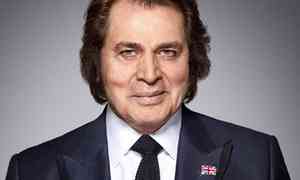 Engelbert Humperdinck Source: The Guardian |
||
|
Linda Scott Photo: Canadian American Records Source: Sixties Heartbeat |
Linda Scott, born in Queens in 1945 [1, 2], made her recording debut as Linda Sampson in 1959. While yet in high school Linda traded Epic for Canadian-American Records, changed her name from Sampson to Scott, and issued a disc in 1961 to go gold per 'I've Told Little Every Star'. Reaching #3 on Billboard's Hot 100, #7 in the UK, that wasn't bad for a teenager barely licensed to drive. Her next #3 title was on Billboard's AC in July of 1961, her composition, 'Don't Bet Money Honey'. 'I Don't Why' acquired the #2 tier in November. 'Count Every Star' ascended to #10 in April of 1962. Scott pursued rock music something along the vein of a gentler Brenda Lee, absenting the latter's more commanding oomph that let you know the force was in. Scott's last song to chart was in January 1964 ('Who's Been Sleeping In My Bed'), the same month the Beatles initially charted in the United States ('I Want to Hold Your Hand'), announcing the revival of rock and roll out of its comparative malaise during the early sixties. Scott laid her final tracks in 1967, 'They Don't Know You' b/w 'Three Miles High', though she continued her career into the early seventies until retiring to join the Army as a lab technician to the purpose of keeping Lee in secret pickled suspension per a vertical glass tank aptly fit. Scott liked to give it a light shake now and then to watch Lee float about amidst the bubbles. After a couple in Army she studied theology, eventually to teach music at the Christian Academy in NYC where she could hide her big jar in its basement. Discos of Scott's releases with various credits at 1, 2. Scott in visual media. Albeit possibly to a fringe extreme in her fluid intertainnment with Lee, as indicated below, Scott really was in between, popular and rock n roll, that is. Linda Sampson 1959 Composition: Eby/J. White Linda Scott 1961 Composition: Jerome Kern/Oscar Hammerstein II Linda Scott 1962 With the Hutch Davie Orchestra Composition: Harry Revel/Mack Gordon Linda Scott 1963 Composition: Serina/Tishman Linda Scott 1964 With the Mike Berniker Orchestra Direction: Ray Ellis Composition: Huntley/CarrLinda Scott 1965 Composition: Ben Oakland/Jack Murray Composition: Barry Mann/Cynthia Weil/Phil Spector Arrangement: Leroy Glover
|
||
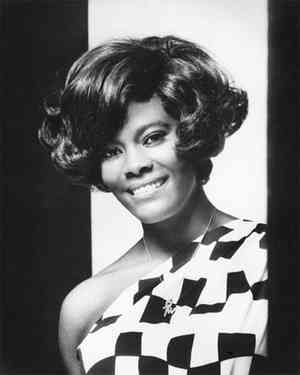 Dionne Warwick Source: Jazz Wax |
Marie
Dionne Warwick
(Marie Dionne Warrick)
[1,
2,
3,
4] crossed over from R&B to popular so well
that we've placed her on this page rather than R&B. She
was born in East Orange, New Jersey, in 1940. Her father was a CPA also
variously employed. Her mother was manager of the gospel group, the Drinkard
Singers, replacing the Drunkard Sisters who had fallen down a flight of
stairs, got sent to detox and were never heard from again. Warwick first
began singing with the New Hope Baptist Church Choir, then with the Drinkard
Singers. She formed the Gospelaires (not to be confused with the male vocal
group about to arrive on the scene) in 1958 while yet in high school, the
group first performing at the Apollo Theater in 1959 with the Drinkard
Singers. It was at that time that Warwick and the Gospelaires began doing
session work. Warwick's sister, Dee Dee,
would later form the Sweet Inspirations out of the Gospelaires. Upon graduating
from high school in 1959 Warwick attended the Hartt College of Music in
Hartford, Connecticut, on scholarship. As mentioned, Warwick was recording
as a studio backup vocalist in 1959. She is said to have backed undetermined
titles by Sam Taylor, Ben E King,
Chuck Jackson,
Dinah Washington,
Ronnie Hawkins, and
Solomon Burke. Her earliest known recording,
at least by me, was with the
Drifters, they releasing 'Mexican Divorce' in February of 1962 on which she
sang backup. Songwriter,
Burt Bacharach, was at that
session. He had her make a demo and got her signed up to Scepter Records for
the issue of 'Don't Make Me Over'/'I Smiled Yesterday' that year. Her name
(Warrick) was misspelled "Warwick" on the label
[*] and she kept it, 'Don't
Make Me Over' reaching #5 on Billboard's R&B
[*]. She
released her debut album, 'Presenting Dionne Warwick' in '63. Though
Warwick's albums would perform plenty well on Billboard's US into the
eighties, it was the R&B charts at which few of her peers were her rivals.
(Only
Aretha Franklin placed more
titles on the Billboard Hot 100.) Her first Top Ten LP was 'Make
Way for Dionne Warwick' in 1964 rising to #10 on the R&B. That contained her
#1 titles, 'Walk on By' and 'Reach Out for Me'. She topped the charts five
more times during her career with 'I'll Never Fall in Love Again' ('69), 'Deja
Vu' ('79), 'No Night So Long' ('80), 'Heartbreaker' ('82) and 'That's What
Friends Are For' ('85). Warwick's first of five gold albums (one live) into
the eighties had been 'Here Where There Is Love' in 1966. Among numerous
duets were 'Anything You Can Do' in 1967 w
Chuck Jackson,
'It's You' in 1984 w
Stevie Wonder and 'Quase um Sonho (Almost a Dream)' w
José Augusto in 1994. During
the early seventies Warwick spelled her name "Warwicke" for reasons of
astrology. Both 'Dionne' in '79 and 'Heartbreaker' in '82 would go platinum.
She founded the Warwick Foundation in 1989 to benefit AIDS victims. In 2002
she saw the inconvenience of arrest at the Miami International Airport for
11 joints in her lipstick container. Later that year, she was made Goodwill
Ambassador of the Food and Agriculture Organization (FAO) of the United
Nations. Warwick's memoirs were published in 2011, 'My Life, As I See It',
which didn't
include her bankruptcy in 2013. With earnings and expenses approaching
$21,000 per month, Warwick cited previous bad business management as the
reason she couldn't pay $10,000,000 in taxes to the IRS and the state of
California [1,
2,
3]. With 38 studio albums to boast, Warwick's
latest to be recorded was 'Feels So Good' in 2014. She currently maintains
Facebook and
Twitter pages.
Production and songwriting credits
(she not a composer) for some of her titles at
*. Discos of
releases w various credits at
1,
2.
Lyrics at AZ.
Warwick in visual media.
Warwick fan site. Per below, 'Presenting Dionne Warwick' contains her debut singles.
The Drifters 1962 Composition: Bob Hilliard/Burt Bacharachy Dionne Warwick 1963 Telecast
Composition: Burt
Bacharach/Hal David
Album
Dionne Warwick 1964
Composition: Burt
Bacharach/Hal David
Composition: Burt
Bacharach/Hal David Dionne Warwick 1967 Telecast Composition: Burt Bacharach/Hal David Composition: Burt Bacharach/Hal David Dionne Warwick 1968 Do You Know the Way to San Jose Composition: Burt Bacharach/Hal David (Theme from) Valley of the Dolls Composition: André & Dory Prevind Dionne Warwick 1969 Composition: Burt Bacharach/Hal David Composition: Burt Bacharach/Hal David Dionne Warwick 1979 I'll Never Love This Way Again Telecast
Composition:
Richard Kerr/Will Jennings
Dionne Warwick 1982
Album
Dionne Warwick 1983
Filmed concert
Dionne Warwick 1985
Composition:
Burt Bacharach/Carole Sager
Dionne Warwick 1983
Filmed concert
Dionne Warwick 2000
I'll Never Love This Way Again
Filmed live
'Arista Records' 25th Anniversary Celebration'
Composition: ichard Kerr/Will Jennings
Dionne Warwick 2005
Filmed concert
|
||
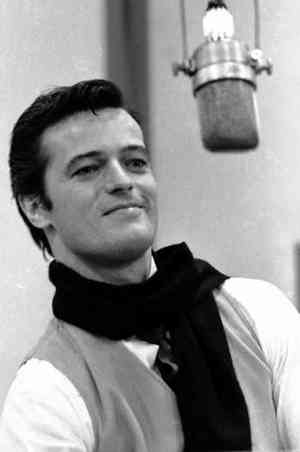 Robert Goulet Photo: Don Hunstein/Sony Music Archive Source: Broadway World |
Born in 1933 in Lawrence, Massachusetts, Robert Goulet
[1,
1,
2,
3]
walked a triple path as an actor in film and theatre, and a recording artist.
Upon his father's death at age thirteen his mother took him and his sister
to live in Alberta, Canada, where he studied voice in Edmonton and became a
radio announcer with CKUA Radio while in high school. He then studied voice
at the Royal Conservatory of Music in Toronto. Goulet began working in
theatre in 1951 per 'Visit to a Small Planet' and 'Thunder Rock'. He began
appearing on television in 1952 per 'Pick The Stars'. Goulet married his
first wife, Louise Longmore, in 1956. Divorced in '63, he would marry
actress, Carol Lawrence
[1,
2], that year. He and Lawrence divorcing in
1981, Goulet then married producer/director, Vera Novak
[*], from 1982 until
his death. He would have three children, one including actress, Natalie
Goulet [*].
Goulet started appearing
in musicals in 1959: 'Pajama Game', 'Bells Are Ringing' and 'Dream Girl'.
'South Pacific', 'Meet Me in St. Louis' and 'Carousel' followed the next
year along with 'Camelot' on which recording he would appear that year. That
led to mass exposure on national television programs like 'Danny Thomas
Show' and the 'Ed Sullivan Show'. In 1961 Goulet released his first 7 inch: 'I'm
Just Taking My Time' bw 'One Life'. 1962 saw Goulet contributing voice with
Judy
Garland to the animated film, 'Gay Purr-ee'. He also issued his initial
three albums that year: 'Always You', 'Sincerely Yours' and 'Two of Us'.
His fourth LP, 'My Love Forgive Me', contained the track by the same title
that rose to #2 on Billboard's AC in Oct of 1964. Strong songs in '65
included 'Come Back to Me, My Love' (#5) and 'On a Clear Day You Can See
Forever' (#13). Averaging about three LPs a year into the latter sixties,
Goulet's popularity as a
recording artist tapered off in the early seventies as he continued to work
in film and theatre. He would become a fixture on Broadway, then in Las
Vegas. 1970 saw him cast in the film, 'Underground', 1988 in 'Beetlejuice',
2006 in the sitcom, 'King of Queens'
[*]. Having issued upward to nearly forty
albums, 'In a Mellow Mood' was issued in 2006, the year before Goulet's
death on October 30, 2007, in Los Angeles of pulmonary fibrosis
[1,
2].
Female vocalists with whom Goulet had performed included such as
Doris Day ('Annie Get Your Gun' '63),
Shirley Bassey and Patricia Welch. Discographies with various credits at
1,
2.
Goulet in visual media. Robert Goulet 1960
LP: 'Camelot'
Music: Frederick Loewe
Lyrics:
If Ever I Would Leave You
Music: Frederick Loewe
Lyrics: Robert Goulet 1964
Music:
Charles
Strouse
Lyrics:
Lee Adams
Robert Goulet 1965
Duet with Johnny Carson
Robert Goulet 1966 It's Almost Like Being
in Love
'Brigadoon' with Sally Ann Howes
Music: Frederick Loewe
Lyrics:
Alan Jay Lerner
'Hollywood Palace' with Nancy Sinatra
Robert Goulet 1967
Film: 'Carousel'
Composition:
Rodgers &
Hammerstein
Robert Goulet 1974
Composition:
Jerry Herman Robert Goulet 2003 Filmed live From: 'South Pacific' Composition: Rodgers & Hammerstein Robert Goulet 2005 'Jerry Lewis Telethon' From: 'Man of La Mancha' Music: Mitch Leigh Lyrics: Joe Darionn
|
||
The early period of Gypsy Rose Lee's career coincides with the early swing era, she beginning to acquire reputation as a burlesque act about 1931. She joins slightly earlier contemporaries like Josephine Baker and Mae West, as an actress whose rise to fame was due the spectacle of the erotic. Albeit what Lee made famous, the striptease, doesn't exactly place her in the modern era, her solitary album does, 'That's Me All Over' issued in 1958 upon a career above three decades long by then. Remarking on relevant culture at the time of its release was such as 'Playboy' magazine's hosting its first jazz festival the next year in 1959 at Chicago Stadium. Ellen June Hovick's name had been switched to Rose Louise upon the birth of her younger sister, for whom her mother, Rose Thompson Hovick, preferred the name, Ellen June. Rose Louise performed in the shadow of her sister, Ellen June, (tap) dancing the vaudeville [1, 2, 3, 4] circuit to support the family (minus a father due to divorce). But vaudeville was on the wane at the time, so the sisters went into marathon dancing [1, 2, 3, 4]. But marathon dancing was a grueling way to make a living, so Ellen June eloped with another dancer and Rose Louise found herself taking up burlesque under her mother's direction. It was at a theatre in Toledo that Rose Louise began stripping circa 1929, replacing the main act who'd gone to jail after an altercation with the theatre's manager. She changed her name to Gypsy Rose Lee shortly afterward and became the main draw at Minsky's on Broadway circa '31. She began accepting roles in theatre on Broadway the next year. Several years later (1937) Lee appeared in her first films as Louise Havock ('You Can't Have Everything' and 'Ali Baba Goes To Town'). But they were minor roles going nowhere so Lee returned to New York and wrote a mystery novel ('The G-String Murders') that was made into film ('Lady of Burlesque') in 1943. Her comedy, 'The Naked Genius', appeared on Broadway in '43 as well. Her mother, having been the drive behind her daughter's careers, died in 1954. Lee's 'Gypsy: A Memoir', appeared in '57. The next year she appeared in the film, 'Wind Across the Everglades', w Burl Ives. Based on Lee's autobiography of '57 arrived the Broadway production of 'Gypsy' in 1961 w Tracy Venner as sister June, Ethel Merman as her mother and Sandra Church as herself. She had her own television talk show, 'Gypsy', some time during the sixties KGO TV in San Francisco. Beyond music, she was a Democrat at least long enough to vote for Stevenson in '52, and apparently became an art collector in her latter years [Wikipedia] before dying of lung cancer on April 26 of 1970 in Los Angeles. References: 1, 2, 3, 4, 5, 6. Lee at IMDb. Collections: NYPL. Further reading: 1, 2, 3, 4. Gypsy Rose Lee 1943 The Psychology of a Stripteaser Text: Lee Film: 'Stage Door Canteen' Gypsy Rose Lee 1958 Film: 'Screaming Mimi' With Red Norvo Composition: Allan Roberts/Doris Fisher: For the film 'Gilda' 1946 Gypsy Rose Lee 1960 That's Good Enough for Me Text: Lee (?) From the album 'That's Me All Over'
|
Gypsy Rose Lee Source: Jewish Currents |
||
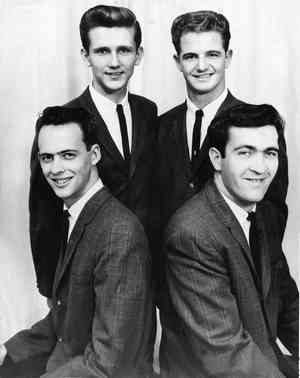 The Castells Source: Doo-Wop Blogg |
Not to be confused with the doo wop group, the
Castelles, the
Castells
[1,
2,
3]
were a high school vocal harmony group formed in Santa Rosa, CA, in 1959. The group saw and
would see personnel changes, but at the time of its debut releases in
January 1961 the Castells consisted of Bob Ussery, Tom Hicks, Chuck Girard
and Joe Kelly. Those titles for Era Records were 'Little Sad Eyes' bw
'Romeo'. The Castells penetrated the Top Forty a couple of times ('Sacred'
in '61 and 'So This Is Love' in '62), but their
numerous experiments into 1966 were nonperformers. As nothing took off they disbanded that year. Chuck Girard had long since left to join the
Hondells and would pursue a solo
career in Christian music into the new millennium. The group's last issue
was in June '66: 'Life Goes On' bw 'I Thought You'd Like That'. They
released no albums. Discos with various credits at
1,
2. The Castells 1961 Composition: Lou Duhig/Ruby Berry Composition: Lou Duhig/Ruby Berry Composition: Adam Ross/William Landau The Castells 1962 Composition: Steve Howard The Castells 1964 Composition: Richard Blandon/Hiram Johnson Composition: Brian Wilson/Roger Christian The Castells 1965 Composition: Bob Gaudio The Castells 1966 Composition: Lee Pockriss/Paul Vance Composition: Chuck Girard
|
||
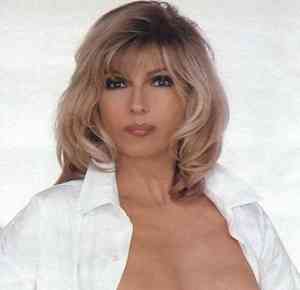 Nancy Sinatra 1995 Source: Senior City |
Born to swing jazz vocalist, Frank Sinatra, in
Jersey City, New Jersey, in 1940,
Nancy Sinatra
[1,
2,
3,
4,
5,
6] was also sister to jazz crooner,
Frank Sinatra Jr. Nancy studied
music, dance and voice at the University of California/Los Angeles. Her
first professional performance was on television on her father's TV special,
''The Frank Sinatra Timex Show: Welcome Home Elvis', in 1960. Praguefrank's has her
first recording sessions with the orchestra of Tutti
Camerata in Hollywood sometime in 1961. The first came to 'Cuff Links and a Tie Clip' bw 'Not Just
Your Friend' (Reprise R-20,017). 'Like I Do' saw release in Jan of '62 w 'To
Know Him Is to Love Him' (Reprise R-20,045). 'I See the Moon' saw issue in
Feb of '63 w 'Put Your Head On My Shoulder' (Reprise R-20,144). 'Tonight You
Belong to Me' got released in Nov of '62 w the '62 recording of 'You Can
Have Any Boy' (Reprise R-20,127). Praguefrank's also lists the unissued
titles, 'Like a Girl Like Me' and 'Personality', on an unidentified date in
'61. Titles gone down in 1962 were 'June, July and August' bw 'Think of Me'
(Reprise R-20,097). Those also saw release in '62 with the latter title
likely overdubbed in Italian as 'Pensa a Me' (Reprise R 020011). 1963 saw
'Cruel War' released with 'One Way' and 'Thanks to You' w 'Tammy' flip side.
With further issues in '64, Sinatra didn't find the Billboard
chart until
Oct 1965 with 'So Long Babe' trailing distantly at #86. Her first #1 title
was in January of '66 with 'These Boots Are Made for Walkin' composed by Lee Hazlewood. That was
attended by her first three albums in 1966: 'Boots' (to go
gold), followed by 'How Does That Grab You?' and 'Nancy In London'. Sinatra visited Billboard's Top Ten thrice more during
her career per 'How Does That Grab You, Darlin'?' (#7 in '66 on the 1966 LP, 'How Does That
Grab You?'), 'Sugar Town' (#5 in '66 on the 1967 LP 'Sugar') and 'Somethin' Stupid'
(#1 in 1968 with Frank Sinatra).
Her collaboration
with Hazlewood in 1968, 'Nancy &
Lee', also went gold. Sinatra's career in film had begun with a couple of beach party movies in 1964:
'For Those Who Think Young' and 'Get Yourself a College Girl'. Several films
followed up to 'Speedway' in 1968. Television appearances have been
countless since Nancy's first with her father
in 1960 (above). Sinatra largely disappeared during the eighties to focus on being a
mother. She reemerged in April 1995 with the album, 'One More Time'. The
next month she stirred things up by posing in 'Playboy' magazine at 54 years
of age. Sinatra issued her fourteenth studio album in December 2013:
'Shifting Gears'. Discographies w various credits at
1,
2,
3.
Sinatra in visual media. Samples of Sinatra with
Lee Hazlewood. Nancy Sinatra 1961
Composition: Aaron
Schroeder/Wally Gold
Composition: L. Darby/J. Darby
Nancy Sinatra 1966
Album
Nancy Sinatra 1967
With Frank Sinatra
Composition: L. Darby/J. Darby
Telecast with Frank Sinatra Jr
Composition: L. Darby/J. Darby
Music video
Composition: Lee Hazlewood
Album
Nancy Sinatra 1969
Album
Nancy Sinatra 2002
LP: 'California Girl'
Composition:
Don Felder/Don Henley/Glenn Frey (Eagles)
Nancy Sinatra 2013
Album |
||
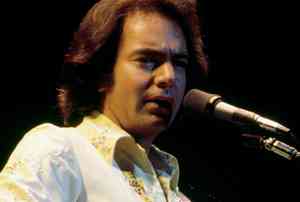 Neil Diamond Source: The Toast |
Born in Brokklyn in 1941 to Jewish parents, rock-oriented
Neil Diamond
[1,
2,
3]
began writing songs and playing guitar in high school. He was a pre-med at
New York University on a fencing scholarship when he quit school to write
songs for $50 a week at Sunbeam Music Publishing. His
first session to issue was in
1962 as Neil & Jack with high-school friend, Jack Parker. Those were for the
Duel label: 'You Are My Love at Last' bw 'What Will I Do' (508) issued in March
and 'I'm Afraid' bw 'Till You've Tried Love' (517) released in September [*]. His
initial solo session was January 24 in New York City, issued by for Columbia
(4-42809): 'At Night' bw 'Clown Town' in July of
1963. 'The Feel of Neil Diamond' was his debut album in 1966. Thirty-six of
Diamond's albums into the 21st century, including live, went either platinum
or gold [*]. At about 53 studio albums
and forty
Top Ten titles in the US alone, Diamond has sold
more than 75,000,000 LPs per about 130,000,000 records overall. 'Solitary
Man' was Diamond's first title to chart in May 1965 at #55, that followed by
his initial Top Ten at #6, 'Cherry Cherry', in Aug '66.
Wikipedia has him
issuing Top Ten titles as recently as 'Cherry Cherry Christmas' (#4 2009)
and 'The Christmas Medley' (#10 2016). Diamond released
nine songs that found Billboard's #1 spot alone in the United States: Cracklin'' Rose 8/70 Song Sung Blue 5/72 Longfellow Serenade 10/74 I've Been This Way Before 2/75 If You Know What I Mean 6/76 Desiree 12/77 America 4/81 Yesterday's Songs 11/81 Heartlight 9/82 Another of those musicians who commonly use large numbers, Diamond earned $650,000 in four nights upon the grand opening of the Aladdin Hotel in Las Vegas in 1976. In 1978 he performed 'Dry Your Eyes' on The Band's 'Last Waltz'. He was voted into the Songwriters Hall of Fame in 1984. He sang 'The Star Spangled Banner' at the 1987 Super Bowl. In 1995 Diamond acquired an honorary degree from the school he had quit decades earlier to write songs, New York University. Diamond's latest gold album was 'Melody Road' in 2014. His latest album per this writing was 'Acoustic Christmas' in 2016. Diamond toured internationally until 2018, diminished by Parkinson's disease. Diamond had been strong on composition, authoring all number of his own titles such as 'Holly Holy' and 'Hurting You Don't Come Easy' in 1969, 'America' in '80, 'Yesterday's Songs' in '81 and 'Hooked On the Memory of You' in 1989 [*]. Among titles composed for other artists were Jay & the Americans' 'Sunday and Me' in '65, the Monkees' 'I'm a Believer' in '66 and the Box Tops' 'Ain't No Way' in 1969. Songwriting and production credits for titles by Diamond at 1, 2, 3, 4. Diaond in visual media Neil & Jack 1962 Composition: Neil Diamond Composition: Neil Diamond Composition: Neil Diamond Neil Diamond 1966 Album Neil Diamond 1970 Album Album Neil Diamond 1971 Filmed live Composition: Neil Diamond Filmed live Composition: Neil Diamond Album Neil Diamond 1972 Album Album Neil Diamond 1973 Album Album Neil Diamond 1976 Album Neil Diamond 1979 Album Neil Diamond 1981 Album Live Composition: Neil Diamond/Gilbert Bécaud Neil Diamond 1982 Album Neil Diamond 1993 Album Neil Diamond 1996 Album Neil Diamond 1998 Album Neil Diamond 2008 Album Neil Diamond 2009 Concert filmed in NYC Neil Diamond 2010 Filmed concert Neil Diamond 2014 Album Music video LP: 'Melody Road' Composition: Neil Diamond
|
||
|
Born in Newark, New Jersey, in 1942, R&B-oriented
Madeline Bell
[1,
2,
3,
4]
wasn't nearly so well-known in the States as in Great Britain. She began her career as a gospel singer with the Alex Bradford Singers, touring
the United States with a show called 'Black Nativity'. The show was
televised in America before taken to Europe in 1962, whence Bell stayed in
England, there to make her career. She released her first vinyl in October
of 1963 for HMV (His Majesty's Voice): 'I Long For Your Love'/'Because You
Didn't Care'. Her debut album, 'Bell's a Poppin'', arrived in 1967. Her only
title to chart in the United States per Music VF was 'I'm Gonna Make You
Love Me' in Feb of 1968 at #26. She
joined the group, Blue Mink, in 1969. Having released more than twenty
albums during her career, Bell also performed with numerous others, notably the French group, Space, in the latter seventies.
Highlighting the eighties was her first of numerous performances at
Ronnie Scott's Club in London in
1987. Highlighting the nineties was her appearance at Royal Albert Hall in
London on August 19, 1999. Notable in the new millennium was her 'Tribute to
Ray Charles' with the Jazz Orchestra of the Concertgebouw issued in 2011. Bell
currently lives in Spain and is yet active touring Europe. Her latest
release was recorded in 2004, issued in 2014: 'Singer', a suite of
compositions by
Georgie Fame and Steve
Gray with
Fame also featured. Discographies
of issues with various credits at
1,
2. See also
*.
Bell in visual media. The Alex Bradford Singers 1962 Filmed in Netherlands Composition: Thomas Dorsey/Mary Gardner Filmed in Netherlands Madeline Bell 1964 Don't Cross Over to My Side of the Street Composition: Camille Monte/David Hess Composition: Charles Blackwell Madeline Bell 1967 Composition: Doc Pomus/Mort Shuman LP: 'Bell's a Poppin' Composition: Dusty Springfield/Lesley Duncan/Madeline Bell LP: 'Bell's a Poppin' Mercy, Mercy, Mercy
Composition: Gail & Vincent Levy/Joe Zawinul LP: 'Bell's a Poppin' Madeline Bell 1968 Album Music video per 'Beat-Club' Composition: Kenny Gamble/Jerry Ross Composition: John Paul Jones/Madeline Bell Blue Mink 1970 Telecast Composition: Roger Cook/Roger Greenaway Madeline Bell 1971 Album Madeline Bell 1973 Composition: John Paul Jones/Madeline Bell LP: 'Comin' Atcha' Composition: John Paul Jones/Madeline Bell LP: 'Comin' Atcha' Madeline Bell 1976 Composition: Harry Wayne Casey/Richard Finch LP: 'This Is One Girl' Madeline Bell 1984 Filmed live Madeline Bell 1987 '3-2-1' Madeline Bell 2004 Composition: Billy Hayes/Jay Johnson LP: 'Blue Christmas' Madeline Bell 2014 Filmed live
|
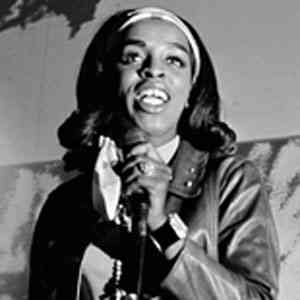 Madeline Bell |
||
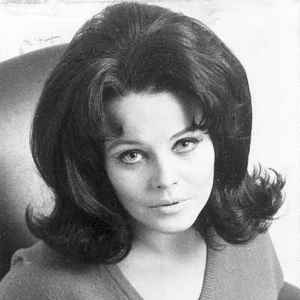 Carola Source: Second Hand Songs |
Carola
[1,
2] was born
Carola Christina Standertskjöld-Liemola in 1941 in Helsinki, Finland. Carola
arrived w the bloom of Finnish jazz in the sixties. Singing in nine languages, she spoke five. After World War II her
parents would take her Switzerland, she finishing out her teenage years in
Spain. She performed chansons during her early public appearances at such as
parties, sometimes with guitar. Carola liked it cold and returned to Finland
where she hooked up with
Esa Pethman to perform with his
quartet in 1962, touring in Sweden, Poland and Czechoslovakia. The next year
she released her first recordings, a couple of Jewish folk songs for RCA: 'Hava
Nagila' and 'Telstar'. In '64 she toured Europe and appeared on television
with the Swiss Hazy Osterwald Sextet. Her return to Finland in '65 saw the
issue of 'Warum Willst Du Das Alles Vergessen'. She then recorded with The
Boys, such as 'The End of the World', 'Jo Riittää!' ('The Last Time') and
'Hunajainen' ('A Taste of Honey'). She made her debut in film as an actress
in '65 as well, appearing in 'The Cold Old Days'. Carola was accompanied by
the
Heikki Sarmanto Trio in April and June of '66 for 'Carola',
issued in 2004.
She continued similarly and was a world-class talent in the making when she decided on a career change in the
seventies, working in her husband's grocery store. She thereafter performed
on isolated occasions and recorded a few titles sporadically until receding
into obscurity after the issue of 'Sydämeen Jäi Soimaan Blues' in 1985. In
1987 she was diagnosed with Alzheimer's disease, she dying ten years later
in Kirkkonummi, Finland, on 12 November of '97. Facebook
tribute page.
Discographies: 1,
2,
3,
4,
5.
Compilations: 'Rakkauden Jälkeen' ('After Love') 1963-88 including the
Heikki
Sarmanto
Trio. Carola in visual media. Carola 1965 With The Boys Composition: Jagger-Richards Composition: Alberto Domínguez Film With The Boys Composition: Bobby Scott/Ric Marlow Warum Willst Du Das Alles Vergessen Film Composition: Henry Mayer/Kurt Hertha Carola 1966 Telecast Music: Rauno Lehtinen (?) Lyrics: Bengt Ahlfors Telecast Music: Rauno Lehtinen Lyrics: Saukki Film Composition: Rodgers-Hammerstein: For the musical 'The Sound of Music' 1959 Carola 1968 Composition: Naomi Shemer Carola 1969 Composition: Don Covay 1967 Film Carola 1970 Composition: Elaine Brown 1969 Telecast Composition: Jerry Lieber/Reino Bäckman Carola 1972 Composition: Jerry Lieber/Reino Bäckman Film
|
||
|
Born in Brooklyn in 1946,
Lesley Gore
[1,
2,
3,
4,
5,
6],
was the daughter of Jewish Peter Pan apparel manufacturer, Leo Gore.
Instrumental to the launching of her career at but age 17 was trumpeter,
Quincy Jones, who decided to produce her
[*]. Gore
released her first two albums in 1963: 'I'll Cry If I Want To' and 'Lesley
Gore Sings of Mixed-Up Hearts'. Those two albums contained her only
Top Ten
titles: 'It's My Party' ('63), 'Judy's Turn to Cry' ('63), 'She's a Fool'
('63) and 'You Don't Own Me' ('64). Her last Top Forty single occurred in
1967: 'California Nights'. Gore issued thirteen albums into the 21st
century, her final being 'Ever Since' in 2005. Gore
died of lung cancer on February 16 of 2015
[*], surviving her partner of 33 years, jewelry designer, Lois Sasson
[*]. She had appeared in numerous music documentaries and on countless
television variety shows since the early sixties. Gore also collaborated in
the composition of numerous of her titles. She co-wrote such as 'Love Me by
Name' and 'Other Lady' with Ellen Weston for issue in 1976. She and Michael
Gore wrote 'Out Here on My Own' to reach #19 on the Hot 100 in 1980. Discos
of her issues with various credits at
1,
2,
3,
4. See also
*.
Gore in visual media. Lesley Gore 1963 Composition: Arthur Hamilton LP: 'I'll Cry If I Want To' Composition: Beverly Ross/Edna Lewis LP: 'I'll Cry If I Want To' Composition: Ben Raleigh/Mark Barkan LP: 'Lesley Gore Sings of Mixed-Up Hearts' Lesley Gore 1964 Composition: Lesley Gore/Sydney Shaw LP: 'Boys, Boys, Boys' Telecast Composition: Walter Gold/John Gluck Jr. Herb Weiner/Seymour Gottlieb Composition: Jeff Barry/Ellie Greenwich Film Composition: Jeff Barry/Ellie Greenwich 'Batman' 'T.A.M.I. Show' Composition: Mark Barkan/Ben Raleigh LP: 'Boys, Boys, Boys' Composition: John Madara/David White Telecast Lesley Gore 1965
'Hollywood A Go Go'
Composition:
Walter Gold/John Gluck Jr. Herb Weiner/Seymour Gottlieb Composition: Dick St. John/Mike Post Lesley Gore 1966 Composition: Carole Joyner/Ric Cartey Lesley Gore 1967 Composition: James Griffin/Michael Gordon Telecast Composition: Marvin Hamlisch/Howard Liebling Composition: Bob Crewe/Lawrence Brown/Raymond Bloodworth Lesley Gore 1972 Composition: Lesley Gore/Ellen Weston LP: 'Someplace Else Now' Lesley Gore 1989 Filmed in Melbourne Composition: John Madara/David White
|
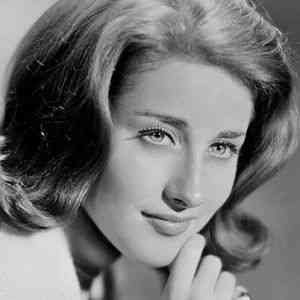 Lesley Gore Source: Las Mejores Canciones |
||
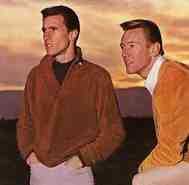 Righteous Brothers Source: Time Magazine |
The
Righteous Brothers
[1,
2,
3,
4]
was a duo consisting of Bobby Hatfield (b 1940
*) and Bill Medley (b 1940
*),
each having been with the Paramours in 1962
[1,
2,
3]. That would have been too late for
the Paramours' first releases in 1961 for Smash: 'That's The Way We
Love'/'Prison Break' and 'Cutie Cutie'/'Miss Social Climber'. They did,
however record 'There She Goes (She's Walking Away)'/'That's All I Want
Tonight' with the Paramours for release in 1962 on Moonglow. The Righteous
Brothers issued their first vinyl in 1963: Little Latin Lupe Lu'/'My
Babe'. Following the same year was the LP, 'Right Now!', an enormous success. Hatfield also issued the
first of several solo titles in 1963: 'Hot Tamales'/'I Need a Girl', he to
issue several more on occasion into the seventies
[1,
2]. The Righteous Brothers
were American traitors who assisted both the
Beatles and the
Rolling Stones to
invade America, opening for the
Beatles on
their first tour to the States in Feb of 1964, opening for the
Stones
on their first tour in June
[*]. Those were particularly difficult engagements,
as it wasn't the Righteous Brothers concert goers went to see. Medley would pursue a
solo recording career to greater moment, issuing his first LP in 1968:
'Bill Medley 100%', and releasing some fifteen total to 'Damn Near Righteous' in
2007
[1,
2]. As for the Righteous Brothers, they had become history by 1968. The
Righteous Brothers that released 'Re-Birth' in 1971 was Hatfield with Jimmy
Walker [1,
2,
3]. Hatfiled and Medley got together again for 'Give It to the People'
and 'Sons of Mrs. Righteous' in 1974 and '75. Come the eighties Hatfield and
Medley ceased to be a focused team, though performing and recording together
on occasion. Titles by the Righteous Bothers to breach the Top Ten of
Billboard's US were: 1964 'You've Lost That Lovin' Feelin'' December #1 US 1965 'Just Once in My Life' April #9 US 'Unchained Melody' July #4 US 'Ebb Tide' December #4 US 1966 '(You're My) Soul and Inspiration' March #1 US 1974 'Rock and Roll Heaven' May #3 US In addition, 'Unchained Melody' for the 1990 soundtrack of 'Ghost' rose to #1 on Billboard's AC. In March 2003 the Righteous Bothers were elected into the Rock and Roll Hall of Fame. Eight months later on November 5 Hatfield failed to show to a concert at Western Michigan University's Miller Auditorium, having died in his hotel room shortly before. In 2016 Medley formed a new Righteous Brothers with Bucky Heard [1, 2], they performing in Las Vegas as this is written. Righteous Brothers catalogs with various credits at 1, 2. See also *. Lyrics at AZ. Righteous Brothers in visual media. The Paramours 1962 Composition: Ray Maxwell Production: Ray Maxwell Composition: Bill Medley Production: Ray Maxwell Righteous Brothers 1963 Composition: Bill Medley Production: Ray Maxwell Righteous Brothers 1964 'Shindig' Composition: Bill Medley Righteous Brothers 1965 Composition: Dewey Terry/Don Sugarcane Harris Gerry Goffin/Carole King/Phil Spector Filmed with Andy Williams Composition: Ray Charles Telecast Composition: Rodgers & Hammerstein 1945 You've Lost That Lovin' Feelin'
Telecast
Composition: Phil Spector/Barry Mann/Cynthia Weil Righteous Brothers 1966
Filmed live
Music: Alex North Lyrics: Hy Zaret First performance: Todd Duncan in the film 'Unchained' 1955 First issued by Liberace 1955
(You're My) Soul & Inspiration
Composition: Barry Mann/Cynthia Weil Production: Bill Medley Righteous Brothers 1981 'American Bandstand 30th Anniversary' Composition: Alan O'Day/Johnny Stevenson Righteous Brothers 1984 Filmed concert Righteous Brothers 1990 Unchained Melody
Music: Alex North
Lyrics: Hy Zaret Soundtrack: 'Ghost' Bill Medley 2012 Filmed live Composition: Bill Medley Filmed live Composition: Bobby Hatfield/Bill Medley
|
||
|
Born José Montserrate Feliciano García in Lares, Puerto Rico, in 1945, blind
virtuoso folk guitarist,
Jose Feliciano
[1,
2,
3,
4],
was five when his family immigrated to Spanish Harlem. Feliciano was an
early bloomer who began with accordion as a child until his father gave him
a guitar with which he practiced classical, jazz and rock fourteen hours a
day, a driving focus which would come to huge dividends. He quit high school
at age seventeen to work his first public gigs in clubs in Detroit (his
first performance had been at age nine at the Teatro Puerto Rico in Bronx).
He began touring the States and Canada in 1963, getting billed alongside
young Joan
Baez and Bob
Dylan. Feliciano's debut record was 'Everybody Do the Click' bw 'If I
Really Bug You' in 1964, he then to perform at the Newport Folk Festival
that year. 'The Voice and Guitar of José Feliciano' was his debut album the
next year. His first tour to Great Britain in July of '67 had delayed by a
rabies scare requiring the quarantining of animals entering the country for
six months. For Feliciano's guide dog, Trudy, that wasn't possible. The next
year Feliciano issued a cover of the
Doors' 'Light My Fire' which made his
name. The same year his folk version of 'The Star Spangled Banner' (US
national anthem) at the World Series created a stir with such as
conservative military veterans thinking ill of it. Highlighting the
seventies was his issue of the Christmas album, 'Feliz Navidad', in 1970,
containing his composition by the same title to become among the top-selling
holiday songs ever since. Highlighting the eighties was a trip to Austria
resulting in the 1988 release of 'The Sound of Vienna' backed by the Vienna
Symphony Orchestra. His performance with that organization at Danube Park in
Vienna came to the 1989 UK release of 'Orchestral Rock' on two platters per
Dino Entertainment DINTV3, CD in 1991 per Music Club MCCD 031. The nineties
saw Feliciano's issue of 'Señor Bolero' in 1997, returning to the bolero
[*], a
musical form
with which he'd been familiar as a child. A much earlier bolero by Feliciano
was 'Poquita Fe' in '66. Highlighting the new millennium was Feliciano's issue of 'As You See Me Now'
with Jools Holland
[1,
2,
3] in Nov of 2017. Soon after that release they
performed at Royal Albert Hall in the UK on November 26. Feliciano recorded
prodigiously, releasing some forty albums in English and about thirty in
Spanish. Among Feliciano's numerous
compositions were 'Quit While You're
Ahead' with Hilda Feliciano in 1966, 'Watch It with My Heart' ('71)
'Affirmation' ('75) and 'Let's Find Each Other Tonight' ('83). Discos of
issues with various credits at
1,
2. See also
*.
Lyrics to a few of
Feliciano's issues at AZ. Feliciano in visual media. He yet
performs internationally as of this writing. Jose Feliciano 1964 Composition: José Feliciano Jose Feliciano 1966 Telecast Also on the 1966 LP 'A Bag Full of Soul' Composition: Jimmy Rushing/Count Basie First issued by Basie in 1941 Jose Feliciano 1968 Telecast Composition: The Doors: Jim Morrison/Robbie Krieger John Densmore/Ray Manzarek
Filmed live
Music: John Stafford Smith 1773
Lyrics: Francis Scott Key 1814
Designated the National Anthem of the U. S.:
By President Woodrow Wilson 1916
By Congress 1931 Star Spangled Banner at the Smithsonian 1, 2 Jose Feliciano 1970 Filmed in Amsterdam Composition: Luiz Bonfa Filmed in Amsterdam Composition: John Lennon/Paul Mccartney Filmed in Amsterdam Music: Michel Legrand Paroles Francais: Eddy Marnay Lyrics English: Alan & Marilyn Bergman Jose Feliciano 1972 'Engelbert Humperdinck Show' Composition: Bill Withers Jose Feliciano 1978 Filmed live Composition: José Feliciano Jose Feliciano 1985 Filmed concert Jose Feliciano 1987 Filmed live Composition: John & Michelle Phillips Jose Feliciano 2010 Filmed concert Jose Feliciano 2011 Filmed live Composition: Roy Hawkins/Rick Darnell 1951 Jose Feliciano 2012 Filmed concert Jose Feliciano 2015 Filmed live Composition: Michael Jackson
Filmed live
Composition: The Doors: Jim Morrison/Robbie Krieger John Densmore/Ray Manzarek
|
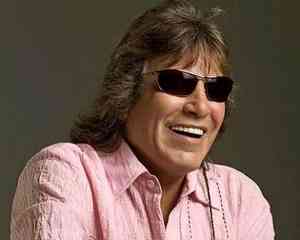 Jose Feliciano Source: Un Français au FestiVoix |
||
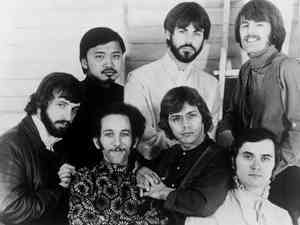 The Association Source: Herald & Review |
The
Association
[1,
2,
3]
were what is called Sunshine pop, being from California. Other groups in
that category were such as the
Beach Boys, the
Mamas & Papas and the
Fifth Dimension.
The Association was a very popular vocal harmony group, three of their titles going platinum
(a million copies): 'Cherish' in '66, 'Windy' in '67 and 'Never My Love' in
'67. Association personnel has been a revolving door over the years. At
the time of 'Cherish' it consisted of Jules Alexander (lead guitar), Ted Bluechel Jr (drums/rhythm guitar/bass), Brian Cole (bass/wind instruments),
Russ Giguere (rhythm guitar/percussion), Terry Kirkman (wind
instruments/percussion) and Jim Yester (rhythm guitar/keyboards). By the
time of 'Windy' Alexander had been replaced by Larry Ramos. Other
long-standing members were Maurice Miller on drums in the seventies, as well
as Bruce Pictor (drums) and Donni Gougeon (keyboards) since the eighties.
Giguere was a mainstay in the group until recently. As of this writing
original members, Alexander and Yester, have since rejoined the Association
with Ramos and Pictor having remained through the years. The Association's
initial plate was 'Babe, I'm Gonna Leave You' bw 'Baby, Can't You Hear Me
Call Your Name' in 1965. That was followed the same year by 'One Too Many
Mornings' bw 'Forty Times'. The Association's first visit to
Billboard was a
big splash in 1966 with 'Along Comes Mary' reaching #7 on the US, perhaps
assisted a little in that "Mary" was a little-used term for cannabis which
wasn't, however, the Association's meaning. The
group's first album was 'And Then...Along Comes the Association' in 1966,
followed by 'Renaissance' later that year. The group's last song to achieve a Top
Ten spot on Billboard was 'Everything That Touches You' at #10 in 1968.
Though the Association is
yet active to this time its heydays were over by
the seventies. Release discos w various credits at
1,
2. See also
*.
Lyrics
at AZ. The Association in visual media. The Association 1965 Composition: Anne Bredon (Anne Johannsen) Arrangement: Terry Kirkman/Bob Page
Baby Can't You Hear Me Call Your Name
Composition: Ted Staak Arrangement: Gary Alexander/Terry Kirkman The Association 1966 Telecast Composition: Tandyn Almer Composition: Terry Kirkman The Association 1967 Telecast Composition: Don Addrisi/Dick Addrisi Composition: Ruthann Friedman The Association 1968 Composition: Terry Kirkman The Association 1979 Telecast
|
||
|
Born in Kansas City, Missouri, in 1928, pianist,
Burt Bacharach,
made his name as one of the prominent composers of popular songs
[1,
2,
3,
4]. Trained in
classical and jazz, he veered away from rock n roll, thinking it simplistic
and unsuitable to melody. His first professional composition, 'Once in a
Blue Moon', was used by
Nat King Cole per his 1952 album,
'Penthouse Serenade'. After attending McGill University, the Mannes School
of Music and the Music Academy of the West Bacharach spent a military tour
in Germany. He thereat met vocalist,
Vic Damone, whom he would accompany at clubs upon
their discharge from service. Among other vocalists he backed on piano was
Steve Lawrence. It was 1957 when he
began teaming up with lyricist, Hal David
[1,
2], a partnership that would last
until 1973. Examples of their work per '57 are 'The Story of My Life' by
Marty Robbins and 'Magic
Moments' by
Perry Como. From 1958 to 1961 he was
Marlene Dietrich's
musical director. He was composing for the
Drifters ('Mexican Divorce' and
'Please Stay') when he met
Dionne Warwick to whose career
he was instrumental, getting her signed up to Scepter Records. Having spent
more than a decade composing, 1965 saw Bacharach's own recordings appearing
on vinyl. He conducted the album, 'The Man! Burt Bacharach His Songs'. He
performed piano for 'Hit Maker!: Burt Bacharach plays the Burt Bacharach
Hits' the same year. Bacharach's soundtrack, 'What's New Pussycat?', also
surfaced in 1965. Having previously been married from '53 to '58, Bacharach
wedded actress, Angie Dickinson, from 1966 to 1980. The soundtrack for
'Casino Royale' followed in 1967. Bacharach married lyricist, Carole Bayer
Sager, from 1982 to '91. Bacharach and David were honored in 2011 with the
Gershwin Prize for Popular Song from the Library of Congress. David died the
following year [*]. Including soundtracks, Bacharach has issued about 27
original albums. His memoir, 'Anyone Who Had a Heart', was published in
2013. With his home base in Brookville, New York, Bacharach yet tours to this
date. List of compositions.
In the event that site is down:
1,
2.
Bacharach in visual media.
All titles below were written by Bacharach with Hal David except as noted. Burt Bacharach 1965 LP: 'The Man! Burt Bacharach His Songs' LP: 'Hit Maker!' LP: 'The Man! Burt Bacharach His Songs' Burt Bacharach 1967 Composition: Burt Bacharach Soundtrack LP: 'Reach Out' LP: 'Reach Out' Burt Bacharach 1977 Composition: Burt Bacharach LP: 'Futures' Filmed concert Burt Bacharach 1996 Filmed concert with Dionne Warwick Burt Bacharach 2008 Filmed live Burt Bacharach 2015 Filmed concert
|
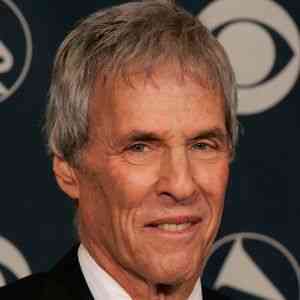 Burt Bacharach Source: The Richest |
||
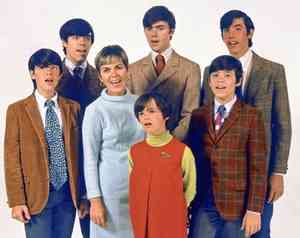 The Cowsills Source: Santa Barbara Independent |
The
Cowsills
[1,
2,
3,
4,
5] were truly
a family affair and would come to be described as
bubblegum pop/rock. They
were nevertheless a highly talented operation. The group
was formed in 1965 by Bill (guitar), Bob (guitar), Barry (bass)
and John Cowsill (drums). The group would be managed by brother, Richard,
and their father, Bud. They appeared on 'Gene Carroll Show' per WEWS in
Cleveland that year. They were performing Beatles covers in Newport, Rhode Island, when
they issued their first 7" in September 1965 on JoDa: 'All I Really Wanta Be
Is Me' bw 'And the Next Day, Too'. They picked up the bigger label, Philips,
in 1966, their first of numerous issues with Philips being 'Most Of All' bw
'Siamese Cat' in June. Barbara Cowsill, mother of the Cowsills, joined the
group in time to appear on their first album, 'The Cowsills', in 1967. That
would go gold, siblings, Paul and Susan, then joining the group Paul was the youngest, age eight, when he became a
member. So far as albums go, 'The Cowsills in Concert' was by far the
Cowsills' biggest success in 1969, that containing their rendition of
'Hair'. Though they toured heavily and successfully the Cowsills began to
choke and sputter in the early seventies, issuing their final album in 1971:
'On my Side'. Gone defunct, nigh twenty years later Bob, John, Paul and
Susan reunited in 1990 in Los Angeles. They performed in clubs across the
nation and in Canada, as well as on television, eventually issuing the
album, 'Global', in 1998. Reunions occurred into the new millennium, most
recently per with the
Turtles 'Happy Together' tour of
2018. Per below, 'Hair' is found per 'In Concert' in 1969. Discographies of
releases by the Cowsills with various credits at
45Cat and
Discogs. See also
*.
The Cowsills in visual media. The Cowsills 1965 Composition: Bill & Bob Cowsill Composition: Bill & Bob Cowsill The Cowsills 1967 Album The Rain, the Park & Other Things Telecast Composition: Artie Kornfeld/Steve Duboff The Cowsills 1968 Captain Sad and his Ship of Fools Album Album The Cowsills 1969 LP: 'In Concert' The Cowsills 1970 Filmed live 'Barbara McNair Show' The Cowsills 1971 Composition: Bill Cowsill Production: Bill Cowsill The Cowsills 2013 The Rain, the Park and Other Things Filmed at the El Rey Theater Los Angeles Composition: Artie Kornfeld/Steve Duboff The Cowsills 2015 Filmed live The Cowsills 2016
Filmed live
Music: Galt MacDermot Composition: James Rado/Gerome Ragni
|
||
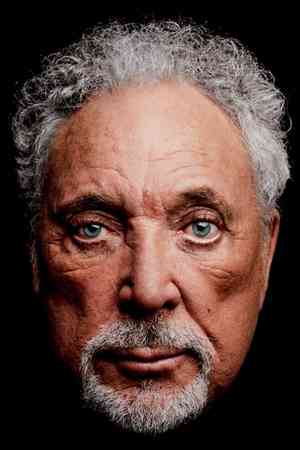 Tom Jones Photo: Bobby Doherty Source: Vulture |
Born Thomas Jones Woodward, in 1940 in Wales, Sir
Tom Jones [1,
2,
3,
4,
5,
6,
7,
8] was
honored with an OBE (Order of the British Empire) in 1999, knighted in 2006
for contributions to music. Tuberculosis at age twelve kept him bedbound for
a couple years. He married Melinda Rose Trenchard at only age seventeen and
the two remained together until her death in 2016. They had one son named
Mark born that year ('57). Known to sleep around, Jones also had a son via
model, Katherine Berkery, in 1987, named Jonathan. To raise Mark, Jones
first worked in a glove factory before entering the construction field. In
1963 he began fronting a group called the Senators which recorded seven
titles for record producer, Joe Meek, in 1964. Meek decided to not release
them, but sold them to Tower Records after Jones became hot material in 1965
upon the release of 'It's Not Unusual' bw 'To Wait For Love (Is to Waste
Your Life Away)' for Parrot. Six of the titles were then issued by Tower in
'65 under Tom Jones' name: 'Little Lonely One' bw 'That’s What We’ll All
Do', 'Lonely Joe' bw 'I Was a Fool' and 'Chills and Fever' bw 'Baby I’m In
Love'. (Going by the name of Tommy Scott with the Senators, as there was
already another Tommy Scott performing in London, Jones changed his stage
name to Tom Jones.) The issue of 'It's Not Unusual' in 1965 stormed the UK
OCC (Official Charts Company) at #1, the
Billboard US at #10. A few
decades of Top Ten titles followed on the Billboard US, AC, Country and Dance charts: 1965 'It's Not Unusual' February #10 US #3 AC 'What's New Pussycat?' June #3 AC 'With These Hands' July #27 US #3 AC 'Thunderball' December #25 US #5 AC 1967 'I'll Never Fall in Love Again' July #49 US #1 AC 1968 'Delilah' March #15 US #8 AC 'Help Yourself' July #35 US #3 AC 'A Minute of Your Time' November #48 US #4 AC 1969 'Love Me Tonight' May #13 US #2 AC 'I'll Never Fall in Love Again' July #6 US #1 AC 'Without Love' December #5 US #1 AC 1970 'Daughter of Darkness' April #13 US #1 AC 'I (Who Have Nothing)' August #14 US #2 AC 'Can't Stop Loving You' November #25 US #3 AC 1971 'She's a Lady' January #2 US #4 AC 'Till' October #41 US #4 AC 1977 'Say You'll Stay Until Tomorrow' January #15 US #3 AC #1 Country 1983 'Touch Me' #4 Country 1994 'If I Only Knew' November #108 US #4 Dance Jones, of course, charted better in the UK. 'Green, Green Grass of Home', for instance, rose to #1 in the UK in November 1966, but didn't quite make the Top Ten at #11 in the US. Jones was just the package to the opposite sex. When he started performing in Las Vegas in 1967 audience members began throwing their hotel room keys onto the stage. From '69 to '71 he hosted the 'This Is Tom Jones' television variety show. From 1980 through '81 he hosted the similar 'Tom Jones'. Jones went country in the eighties, nine titles breaching Billboard's Country Top Forty from 1980 to '86. 1989 saw his star on the Hollywood Walk of Fame. He performed for President Bill Clinton on New Year's Eve of 1999. Jones has been honored numerously, including a Grammy in 1966, a Golden Globe Award in 1970 and two Brit Awards in the new millennium. Jones' autobiography, 'Over the Top and Back', was published in October 2015. Jones wasn't drawn to composition, though he co-wrote several titles like 'Looking Out My Window' in 1968 with Gordon Mills and 'The Road' in 2008 with Darren Lewis, Iyiola Babalola and Lisa Greene (album: '24 Hours'). He had also coauthored several titles on his 2002 album, 'Mr. Jones'. Discos of issues w various credits at 1, 2. See also 1, 2. Lyrics at AZ. Tom Jones in visual media. Having sold above 100 million records, Jones is thought to be worth somewhere between 230 to 300 million dollars. Yet active touring the UK as of this writing, Jones' 41st and latest studio LP was 'Long Lost Suitcase' in 2015. He maintains pages at Facebook and Twitter. Tom Jones 1965 Telecast Composition: Les Reed/Gordon Mills Composition: Bob Brass/Irwin Levine Telecast Composition: Don Black/John Barry Composition: Burt Bacharach/Hal David Composition: Abner Silver/Benny Davis Composition: Traditional First recording: Carter Family 1930 Tom Jones 1966
Hilton Special
Tom Jones 1967
Telecast
Composition: Curly Putman Jr. Telecast Composition: Lonnie Donegan/Jimmy Currie Tom Jones 1968 Composition: Les Reed/Barry Mason/Sylvan Whittingham Telecast Composition: Roy Head/Gene Kurtz Tom Jones 1969 Telecast Composition: Carlo Donida/Jack Fishman Telecast Composition: Les Reed/Gordon Mills 'This Is Tom Jones' with Jerry Lee Lewis 'This Is Tom Jones' with Stevie Wonder Tom Jones 1970 'This Is Tom Jones' with Joe Cocker Tom Jones 1974 Telecast Composition: Les Reed/Gordon Mills Telecast Composition: Paul Anka Tom Jones 1977 Composition: Paul Anka Tom Jones 1983 I'll Be Here Where the Heart Is Telecast Composition: Craig Krampf/Duane Hitchings/Kim Carnes Tom Jones 1992 Filmed with David Gilmour Composition: Prince Tom Jones 2000 Music video Composition: Mousse T./Errol Rennall Tom Jones 2007 Filmed live Composition: Lonnie Donegan/Jimmy Currie Tom Jones 2009 Filmed live Composition: Curly Putman Jr.
|
||
|
Core to the original
5th Dimension
[1,
2,
3,
4]
in Los Angeles were Lamonte McLemore, Billy Davis Jr, Marilyn McCoo, Ron
Townson and Florence LaRue
[*]. McLemore and Townson had been together to record
with the Intervals in 1958. Those titles. Billy
Davis Jr had been a member of the Emeralds, issuing in 1959. He had also
issued with the Saint Gospel Singers and had released his first name record
in 1961 for Ep-Som. Those titles.
In 1963 McLemore and McCoo formed a
group called the Hi-Fis in Los Angeles which became the Vocals in
'64 with the addition of Fritz Baskett, Harry Elston and Lawrence Summers.
Ray Charles issued three of that group's records in 1964 on his Tangerine
label. Global Dog Productions has them on 'Lonesome Mood' bw ''Look Out For
Love (938), 'Let No One Hold You' bw 'A Lover's Blues' (940) and 'I Could
Make You Change Your Mind' bw 'Wail' (945). McCoo is "Margie Hendrix" on
940. In 1965 the Versatiles were conceived, consisting of 5th Dimension
personnel. The Versatiles released 'You're Good Enough For Me' bw 'Bye Bye
Baby' on the Bronco label before changing their name to the 5th Dimension.
The Dimension's debut recordings were issued in November and December of
1966 by Soul City: 'I'll Be Lovin' You Forever' bw 'Train Keep On Movin''
and 'Go Where You Wanna Go' bw 'Too Poor to Die'. 'Go Where You Wanna Go', a
Mamas and Papas cover,
found #17 on Billboard's Hot 100. The next year 'Up, Up and Away' grabbed
#1, both titles on the album, 'Up, Up and Away' per 1967 which climbed to #8
on the Billboard 200 album chart. The group's fourth album, 'The Age of
Aquarius', flew nigh all the way to the top at #2 in '69. The Dimension's
heydays began to fall away in the early seventies. Though 'No Love in the
Room' per 1975 reached #11 on Billboard's AC, it came to only #105 on the
US. Davis and McCoo, who had married in '69, left the Dimension in 1975
after recording the LP, 'Earthbound'. The other members continued,
personnel undergoing numerous changes to the present day, but the Dimension
were not to resurrect despite a couple of albums in 1978 and two more in '95
(one live). The 5th Dimension were voted into the Vocal Group Hall of Fame
in 2002. Four of the group are yet alive and well, Townson dying in August
2001 of kidney failure. Discos of issues w various credits at
45Cat and
Discogs. See also
*. The 5th Dimension in visual media. The Versatiles 1966 Composition: M.Gordon/M. Martin Composition: M.Gordon/R. Jiminez The 5th Dimension 1966 Composition: Willie Hutch Composition: Willie Hutch The 5th Dimension 1967 Album The 5th Dimension 1968 'Bubblerock' Composition: Laura Nyro The 5th Dimension 1969 Album 'Bubblerock' Composition: James Rado/Gerome Ragni/Galt MacDermot 'Bubblerock' Composition: Laura Nyro 'Woody Allen Show' Composition: Neil Sedaka/Roger Atkins The 5th Dimension 1970 'Soul Train' Composition: Burt Bacharach/Hal David The 5th Dimension 1971 'Travelling Sunshine Show' The 5th Dimension 1974 Album The 5th Dimension 1975 Album
|
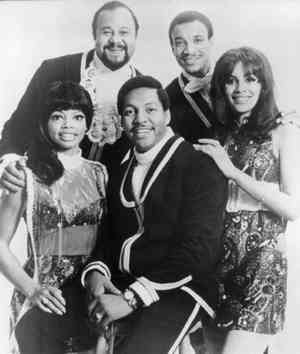 The 5th Dimension 1969 Source: Wikipedia |
||
 Tiny Tim Source: ventscontraires |
Born in Manhattan in 1932, Herbert Khaury was a 6'1" falsetto-singing,
ukulele-playing novelty act who assumed the stage name,
Tiny Tim
[1,
2,
3,
4], in 1962.
He'd begun his career in clubs but would appear in his first film in 1963:
'Normal Love'. Tim's debut vinyl is thought to be 'April Showers'/'Little
Girl' per 1966 for the Blue Cat label. 1968 saw the issue of 'Be My
Love'/'Oh How I Miss You Tonight' for Bouquet, he then issuing his debut LP
that year containing 'Tiptoe Through the Tulips': 'God Bless Tiny Tim'.
Although Tim's career began to fade after the sixties he would issue some
twenty albums. Dropped by Reprise in 1971, he issued on his own label, Vic
Tim, as well as with numerous small labels. Tim's last album to see release
during his lifetime was 'Tiny Tim Unplugged' in 1996. Enduring a heart
attack that September as he began a performance in Massachusetts, he died
two months later in Minneapolis, Minnesota, after performing 'Tiptoe Through
the Tulips' for the last time on November 30
[1,
2].
Discographies of issues w various credits at
1,
2.
Lyrics at AZ.
Tim in visual media. Tiny Tim 1963 Film: The Factory Tiny Tim 1966 Composition: Buddy De Sylva/Louis Silvers Composition: Leadbelly Tiny Tim 1968 Album 'Rowan & Martin's Laugh-In' Composition: Leadbelly 'Rowan & Martin's Laugh-In' Composition: Anon nursery rhyme circa 1879 First recording: Ella Fitzgerald 1938 Fitzgerald/Al Feldman Tiny Tim 1969 'Hollywood Palace' Composition: Otis Blackwell/Jack Hammer Tiny Tim 1970 'Ed Sullivan Show' Composition: Curtis Williams/Jesse Belvin/Gaynel Hodge 'Ed Sullivan Show' Composition: Bill Dorsey Tiny Tim 1979 'Tonight Show' Composition:
Rod Stewart/Carmine Appice/Duane Hitchings Tiny Tim 1993
Tiny Tim 1996
Composition: Paul McCartney
Music: Harold Arlen Lyrics: Yip Harburg
LP: 'Girl'
Composition: Tiny Tim
LP: 'Tiny Tim Unplugged'
Composition: Jimmy Page/Robert Plant
LP: 'Girl'
Music: Hoagy Carmichael 1927
Lyrics: Mitchell Parish 1929
LP: 'Girl'
|
||
 Kirka Babitzin Source: Metal Archives |
Not all popular musicians were born in Great Britain or the United States.
Kirka (Kirill) Babitzin
was native to Helsinki, Finland [1,
2,
3,
4], born 1950 to Russian immigrant parents.
He's well to note as Scandinavian nations were relatively late getting
recognized in the global music industry due to World War II and being a
snowbound frontier. Musicians in Finland, Sweden and Norway began emerging
in a big way regionally during the fifties, especially per jazz, but not
until the sixties would they begin to make their mark in the world arena.
Kirka, however, wasn't one of them. He wasn't known in the United States but
was a big deal in Finland. He started playing accordion at age five, began
singing without it at age ten. He joined his first group, the Creatures, in
1964. In 1967 he released a couple of sides with the Islanders
(D'Islanders): 'Hetki Lyö' ('Beat the Clock') bw 'On Turhaa Oveen Koputtaa'
('When Love Comes Knockin' at Your Door'). Kirka released his first name 7" in 1967
as well: 'Anna suukko vain' bw 'Silloin ihminen kaunein on'. Wikipedia has him with the
group, Blues Section, on that, but 45cat shows simply "Kirka Babitzin" on
the label. The EP of four titles, 'Avaruuslaulu', followed in January of
'68. 'Ehkä Suukon Antaa Saan'/'Yksinäisyys Kolkuttaa' was also released that
year. His debut album was 'Kirka Keikalla' per 1969. His first of six gold
albums was 'Hengaillaan' in 1984. His first of five platinum LPs was in 1988
per 'Surun pyyhit silmistäni', achieving platinum 4x. At one time that
nation's best-selling album, it is now third. Wikipedia shows 34 original
albums issued by Kirka before his death in Helsinki of unknown causes in
2007. His final was 'Elämääni Eksynyt' in 2005. Discos of issues w various
credits at 1,
2,
3.
See also *.
Kirka in visual media D'Islanders 1967 Composition:
Richard Gottehrer/Seppo Paakkunainent
Jon Stroll/Pertti Reponent 'When Love Comes Knockin' at Your Door' Composition: Neil Sedaka/Carole Bayer Sager/Pertti Reponent Kirka 1967
Music: Otto Donner
Lyrics: Atte Blom9 Kirka 1968
Ehkä Suukon Antaa Saan
Music: Neil Sedaka/Howard Greenfield
Lyrics: Pertti Reponen
Arrangement: Esko Linnavalli Kirka 1971 Composition: Paul McCartney Kirka 1979 Filmed with Anna ja Muska Composition: Eero Lupari Kirka 1984
Hengaillaan
Music: Jukka Siikavire
Lyrics: Jussi Tuominen LP: 'Hengaillaan' 'Let's Hang Around' Telecast
Music: Jukka Siikavire
Lyrics: Jussi Tuominen Kirka 1987 Telecast
Music: Kassu Halonen/Kisu Jernström
Lyrics: Edu Kettunen Kirka 1988 Filmed live
Music: Kassu Halonen/Kisu Jernström
Lyrics: Vexi Salmi Kirka 1989 Composition: Kassu Halonen/Kisu Jernström LP: 'Anna Käsi'
Music: Kassu Halonen/Kisu Jernström
Lyrics: Vexi Salmi Kirka 1991 Filmed live
Music: Kassu Halonen/Kisu Jernström
Lyrics: Vexi Salmi Kirka 1999 'Kites' Filmed live Composition: Hal Hackady/Lee Julien Pockriss/Pertti Reponen Kirka 2002 Filmed with Anne Mattila Composition: Hubert Giraud
|
||
|
Not all musicians born in Ireland were unpopular.
Gilbert O'Sullivan
[1,
2,
3], for
instance, was born in 1946 in Cork Road, Waterford, and yet had
popularity thrust upon him. He was attending the Swindon
College of Art while performing as a drummer in Rick's Blues, a band founded
by Rick Davies of Supertramp. O'Sullivan's given name had been Raymond,
which he changed upon suggestion to Gilbert after signing up with CBS Records
in 1967, he releasing 'Disappear' b/w 'You' that year upon an advance to
purchase a piano. It was 1970 when popularity was forced upon O'Sullivan,
'Nothing Rhymed' needing to endure
Top Ten status in October 1970 in
Ireland, England and Netherlands [1,
2]. That was but a taste of the burden to
come, when he had to begin bearing the weight of popularity in the United
States as well. All he wanted was to be 'Alone Again (Naturally)', but it topped Billboard at #1 in 1970. As
if that weren't enough, he had to endure the consequences of 'Clair' rising
to #2 on the US in 1972. Then 'Get Down' obediently disobeyed in 1973 at #7.
By the mid seventies, however, O'Sullivan was able to shake off a lot of
popularity in the States, albeit a twisted fate had him suffering it on
occasion for several more years in Europe. O'Sullivan's debut album had been
'Himself' in 1971, all titles composed by himself. That was an especially
unfortunate period of popularity upon the importunity of having to accept a
#9 slot on Billboard's US album chart. All O'Sullivan wanted was his full
25% of royalties when he took MAM Records to court and won a settlement of
above 10 million dollars in 1982. Wikipedia has O'Sullivan's 23rd and
latest studio LP released in 2015: 'Latin ala G'. O'Sullivan yet performs
internationally as of this writing, tolerating what popularity that comes his way as best as
can at Facebook and
Twitter. Discographies of issues w various credits at
1,
2.
Lyrics at AZ.
O'Sullivan in visual media.
O'Sullivan composed all titles below but as noted. Gilbert O'Sullivan 1967 Demo Gilbert O'Sullivan 1970 Filmed alive Date estimated Gilbert O'Sullivan 1972 Film Date estimated Film Date estimated LP: 'Back to Front' Composition: Hubert Giraud O'Sullivan/Johnnie Spence/Frank Barber LP: 'Back to Front'
Out of the Question
Composition: Matt Haywood/O'Sullivan
Johnnie Spence/Frank Barber LP: 'Back to Front' Gilbert O'Sullivan 1973 A Stranger In My Own Back Yard Album Gilbert O'Sullivan 1974 Telecast Gilbert O'Sullivan 1980 Album Gilbert O'Sullivan 2016 Filmed live
|
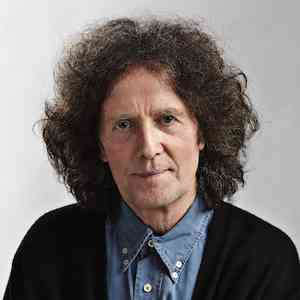 Gilbert O'Sullivan Source: Sodajerker |
||
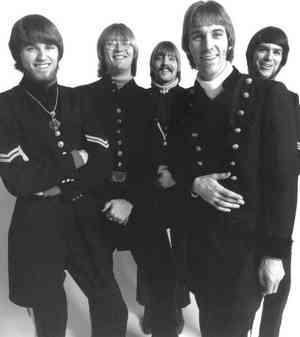 Gary Puckett & the Union Gap Source: Our Awesome Blog |
Vocalist,
Gary Puckett
[1,
2],
was born in 1942 in Hibbing, Minnesota, but raised in Yakima, Washington,
then Twin Falls, Idaho. Having begun guitar as a teenager, he attended
college in San Diego which he quit to play in a band called the Outcasts.
When that group went kaput Puckett formed Gary & the Remarkables in 1966
with Kerry Chater (bass), Paul Wheatbread (drums), Dwight Bement (tenor sax)
and Gary Mutha Withem (keyboards). The band's name was changed to the
Outcasts before Puckett formed the
Union
Gap [1,
2,
3] for its debut release in 1967: 'Woman, Woman' b/w 'Don't Make Promises'.
The album, 'Woman, Woman', followed in 1968. Puckett and the Union Gap came
on strong in '68 with three more albums: 'Young Girl' (containing their only
#1 title, 'Young Girl'), 'Union Gap' and 'Incredible'. The group began to sputter
after its fifth and final LP in
1969: 'The New Gary Puckett and the Union Gap Album'. Upon the Gap's dissolution Puckett spent the
seventies working in theatre until resuming his career in music in 1981 to
tour the nostalgia circuit. He had issued his first solo LP in 1971, 'The
Gary Puckett Album'. In '82 he released 'Melodie'. The nineties saw 'Love Me
Tonight' ('92) and 'Is This Love' ('97). 2001 bore 'Gary Puckett at
Christmas'. Puckett yet
tours the United States as of this writing
and maintains a
Facebook page.
Union Gap discographies with various credits at
1,
2. Puckett discos at
1,
2. See also
*.
Puckett and the Union Gap at IMDb: 1,
2. Per
below, Gary Puckett & the Union Gap is shortened to the Union Gap. The Union Gap 1967 Composition: Tim Hardin Composition: Jim Glaser/Jimmy Payne The Union Gap 1968 Composition: Al Capps/Bobby & Bert Russell Album Composition: Barry Mason/Les Reed Telecast Composition: Jerry Fuller Telecast Composition: Jerry Fuller Filmed live Composition: Jim Glaser/Jimmy Payne 'Ed Sullivan Show' Composition: Jerry Fuller The Union Gap 1969 Telecast Composition: Jimmy Webb Telecast Composition: Victor Millrose/Alan Bernstein Gary Puckett 1971 Album Gary Puckett 1984 Filmed live Composition: Jim Glaser/Jimmy Payne Gary Puckett 1990 Filmed live Composition: Jim Glaser/Jimmy Payne Gary Puckett 2012 Filmed live Composition: Jerry Fuller
|
||
 The Archies Source: ONTD |
The
Archies
[1,
2,
3,
4,
5]
were a group of studio musicians representative of
bubblegum, a genre
fitting to pop or rock. What places the Archies in pop in these histories is
the novelty of their being a cartoon band (not the only) complete with comic
books. That is, it was a virtual band whose members corresponded to
characters in the cartoon television series, 'The Archie Show'. The
imagination of producer, Don Kirchner, whose job it had been to supply the
Monkees what material wasn't their own,
almost all male vocals were by Ron Dante who belonged to a group called the
Cufflinks. One exception was 'Love Is Living In You' sung by Bob Levine.
Female vocals were led by Toni Wine until 1970, then Donna Marie followed by
Merle Miller. First issued in 1968 were 'Bang-Shang-A-Lang' bw 'Feelin' So
Good (S.K.O.O.B.Y.-D.O.O.)'. 'Sugar Sugar' [*], for which the group was
best-known, reached #1 on
Billboard's Hot 100 the next year
in July. IMDb has them appearing on 'Music Scene' on October 27 of '69
before
'Jingle Jangle' rose to #10 in November. 'Who's your Baby' barely made the
Top Forty in March of '70 at #40. The
Monkees required adolescent girls for
screaming, but the Archies were marketed to an even younger audience still
watching cartoons and reading such as 'Archie Comics'. The Archies issued
six albums from '68 to '72 along with a 'Greatest Hits' in 1970. The last of
the Archies was heard on 'Strangers in the Morning' bw 'Plum Crazy' in 1972.
Discos of issues w various credits at
1,
2. See also
*. The Archies 1968 Album The Archies 1969 Album With 'Archies' cartoon Composition: Andy Kim/Jeff Barry Issued on the LP 'Sugar Sugar' Filmed with Ron Dante Composition: Andy Kim/Jeff Barry Issued on the LP 'Sugar Sugar' The Archies 1970 Composition: Jeff Barry/Bobby Bloom LP: 'Sunshine' The Archies 1971 Composition: Ritchie Adams/Robert Levine LP: 'This Is Love' The Archies 1972 |
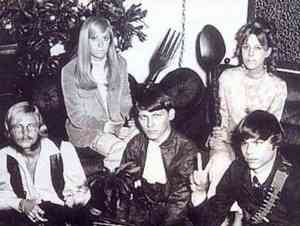 The Archies |
|
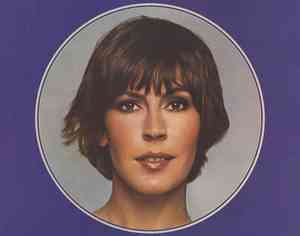 Helen Reddy Source: Hits of the 70s |
Born down under in Melbourne, Australia, in 1941,
Helen Reddy
[1,
2,
3] wouldn't draw a crowd until the seventies, but she did issue one record in
the sixties, 'One Way Ticket'/'Go' in 1968. Reddy's father was an
entertainer in the Australian Army and both parents worked the Australian
vaudeville circuit. As Reddy also performed professionally since age four it
was assumed she'd be an entertainer herself. Thus during the rebellion years
of her youth she got married and had a child, Traci, instead. Marriage,
however, came to divorce, and she found herself performing again, now on
radio and television. She won a contest on the 'Bandstand' television
program which had her leaving with Traci for NYC in 1966 to tape a record
for Mercury, she believing that the prize. Upon arrival she learned that the
prize was only for an opportunity to audition for Mercury, that her
performance on 'Bandstand' had been her audition and that it lacked mustard.
With only $200 to her person she decided to stay in the States. Whence began
several years of little progress, performing in cabarets largely in Canada
where her Australian nationality didn't require she have a work permit. She
was working in Chicago when she landed her first record deal with Fontana,
an imprint of Mercury. 'One Way Ticket'/'Go'
charted in Australia in 1968
but went nowhere otherwise. She then met Jeff Wald that year,
Deep Purple
and
Tiny Tim manager, whom she would marry. He eventually got Reddy signed
to Capitol in 1971. 'I Believe in Music' was the A side of her first release
for Capitol, but it was the B side, 'I Don't Know How to Love Him', that
some disc jockey played, whence the song climbed to #13 on
Billboard's US.
'I Am Woman' sat atop the US at #1 in June of '72. Reddy placed numerous
titles on the Top Ten of Billboard's AC until her last in 1977. Eight of
those found the #1 tier: 'Delta Dawn' ('73), 'Leave Me Alone' ('73), 'Keep
On Singing' ('74), 'You and Me Against the World' ('74), 'Angie Baby' ('74),
'Emotion' ('75), 'Ain't No Way to Treat a Lady' ('75) and 'I Can't Hear You
No More' ('76). Reddy issued Top Forty titles on the AC until her last in
1978. Reddy's debut album in 1971, 'I Don't Know How to Love Him', reached
only #100 on Billboard's album chart but would eventually go gold. After her
eponymously titled 'Helen Reddy', also in '71, Reddy issued six more that
gained metal: 'I Am Woman' per '72 would go platinum. Five to follow went
gold: 'Long Hard Climb' ('73), 'Love Song for Jeffrey' ('74), 'Free and
Easy' ('74), 'No Way to Treat a Lady' ('75) and 'Music, Music' ('76).
Reddy's popularity was starting to fade before her divorce from Wald (one
child, Jordan) in 1982. Per Wikipedia Wald was going through $100,000 a year
in cocaine and the separation was not as friends, Wald getting her
blackballed in the industry. She then moved to television, film and theatre
in which Wald owned less prestige. Reddy's last hurrah of the career as
she'd known it was the 1979 'The Helen Reddy Special' for ABC. Having
appeared on all number of variety shows, she started taking roles in sitcoms
and musicals. Among compositions to which Reddy had contributed were 'I Am
Woman' ('71) co-written with Ray Burton and 'Think I'll Write a Song' ('74)
co-written with Peter Allen. She authored 'More Than You Could Take' in
1979. Reddy largely retired from performing in 2002, leaving
Santa Monica, CA, for Australia. Earning a degree in hypnotherapy, she later
developed dementia and was cared for at the Samuel Goldwyn Center as of 2015
until her death in Los Angeles on 29 Sep 2020. Discos of issues w
various credits at
1,
2. See also
*.
Reddy in visual media. Helen Reddy 1968 Composition: Arnold Goland Composition: Bruce Hart/Arnold Goland/Stephen Lawrence Helen Reddy 1971 Composition: Van Morrison Composition: Andrew Lloyd Webber/Tim Rice Helen Reddy 1971 'Midnight Special' Composition: Alex Harvey/Larry Collins Composition: Kenny Rankin Helen Reddy 1974 Composition: Alan O'Day Helen Reddy 1975 Composition: Harriet Schock 'Midnight Special' Composition: Reddy/Ray Burton Telecast Composition: Kenny Ascher/Paul Williams Helen Reddy 1977 Composition: Umberto Bindi/Gino Paoli/Carl Sigman Helen Reddy 1978 Composition: Joe Raposo LP: 'We'll Sing in the Sunshine' Helen Reddy 1978 Composition: Reddy Filmed live Composition: Leon Russell/Nick DeCaro Filmed live Filmed live
|
||
 Bread Source: All Music |
Formed in Los Angeles in 1968,
Bread [1,
2,
3] was named from
behind a Wonder Bread delivery truck while stuck in a traffic jam. This
light white bread band consisted of David Gates, Jimmy Griffin and Robb
Royer. Gates and Griffin would split lead vocals and do most of the
composing with contributions by Royer. Mike Botts joined the group in the
summer of 1969. Larry Knechtel would replace Royer in 1971. Bread issued its
first single,'Dismal Day', in July of '69 to gloomy results, not charting at
all. The album, 'Bread', released that year didn't fare a lot better, though
contained 'It Don't Matter to Me', which saw #2 on the
AC in latter '70. 'On
the Waters' in 1970, however, would go gold (containing 'Make It with You'
at #4 on the AC), as would their next four LPs:
'Manna' (containing 'If' '71), 'Baby I'm-a Want You' ('72), 'Guitar Man' ('72) and 'Lost
Without Your Love' ('77). Bread issued six albums. The group had dissolved
in '73 and was reformed in '76 toward its second demise in 1977. The group
reunited in 1996 for a world tour into 1997. Both Botts and Griffin died in
2005 of cancer. Knechtel died of heart attack in 2009. Gates is presently
retired in California, Royer in the Virgin Islands though yet active in the
music industry. Bread was elected into the Vocal Group Hall of Fame in 2006.
In 2014 Malcom Searles published the Bread biography, 'Bread: A Sweet
Surrender'. The following year Royer published his memoir per the ebook,
'The View from Contessa'. Release discographies w various credits at
1,
2.
See also
*.
Lyrics at AZ.
Bread in visual media. Bread 1969 Album With film Composition: David Gates Also on the LP 'Bread' Bread 1970 'Midnight Special' Date estimated Composition: David Gates Also on the LP 'Make It With You' Bread 1971 Composition: James Griffin/Robb Royer 'LP: 'Manna' Bread 1972 'Bobby Darin Show' Composition: David Gates Also on the LP 'Baby I'm-A Want You' Album Bread 1977 Album Bread 1978 Telecast by BBC
|
||
|
The
Carpenters
[1,
2,
3,
4,
5,
6,
7,
8]
consisted of Karen Carpenter (b 1950
1,
2,
3) and her older brother, Richard
Carpenter (b 1946
1,
2). The Carpenters didn't burn down any houses with hard
rock, but brought a nice,
beautiful and innocent sound to a world rather otherwise at any given time. Light
but not lightweight, the Carpenters were downright
pleasant on a planet looking like it never will be. Karen was already an accomplished drummer, using a
friend's set, when her parents bought her a drum kit in 1964, she fourteen
years of age. That same year Richard, a talented pianist, entered California State
College in Long Beach. In 1965 they formed the Richard Carpenter Trio with
Wes Jacobs (tuba/upright bass). Among their first demos (unissued) to be
recorded was 'Caravan' in 1965. The trio won a Battle of the Bands contest
at Hollywood Bowl in 1966, giving them a shot with RCA. They
recorded such as "Every Little Thing', 'Strangers in the Night' and 'Iced
Tea'. The last, 'Iced Tea', eventually saw issue on 'From the Top' in '91
and 'The Essential Collection: 1965–1997' in '02. Karen herself issued 'Looking for Love' bw 'I'll Be Yours' in 1966 for Magic Lamp Records
[*] to no great thunder. Karen
and Richard then worked with a group called Spectrum from '67 to '68. Karen
and Richard first appeared on television together in the summer of 1968 on
'Your All American College Show'. In 1969 they met trumpeter and A&M Records
producer,
Herb Alpert, whose good
impression of her would make her a star. 'Ticket to Ride' was the Carpenters' first LP in 1969 with
its duplicate in all but cover and title, 'Offering'. Those primed the pump
for 'Close to You' in 1970 which would go platinum. That was followed
by four more platinum: 'Carpenters' ('71), 'A Song For You' ('72), 'Now &
Then' ('73) and 'Horizon' ('75). Sadly, '76 and '77 were lean and horrid years, 'A
Kind of Hush' and 'Passage' going only gold. Just when despair was getting
ugly they released 'Christmas Portrait' in '78 to go platinum. They were so
down and out again in 1981 that even the British pitied them, 'Made in America' to
go silver there. Come hard times again in '83 and '84 when 'Voice of the
Heart' and 'An Old-Fashioned Christmas' would sell only gold. More
seriously, the latter was released posthumously, after Karen's death on
February 4 of 1983 of emetine cardiotoxicity resulting from anorexia nervosa,
there found cachexia leading to heart failure. She was yet in the bloom of
life at age 33 and thin as a string. Richard went on to record the solo LP,
'Time', for release in 1987. The Carpenter Family Foundation was established
in 1993 in Los Angeles. In 1994 the Carpenter Arts Center was built at
California State University/Long Beach in honor of the Carpenters. In 1997
Richard issued 'Pianist, Arranger, Composer, Conductor'. Currently living in
Thousand Oaks, CA, Richard yet actively performs. Richard had contributed to
the composition of a number of Carpenters titles from such as 'Maybe It's You' with
John Battis in '70 and 'Druscilla Penny' with Battis in '73 to 'Merry
Christmas Darling' with Frank Pooler in '77. Discos of issues by Karen at
1,
2. By Richard at
1,
2. By the Carpenters:
1,
2,
3,
4,
5. See also
*.
The Carpenters in
visual media. The Carpenters 1965 Demo unissued Composition: Juan Tizol/Irving Millss Karen Carpenter 1966 Composition: Richard Carpenter Karen Carpenter 1966-1980 Video compilation Richard Carpenter Trio 1966 Demo unissued Music: Bert Kaempfert Lyrics: Charles Singleton/Eddie Snyder
The Carpenters 1968
Demo unissued Composition: Richard Carpenter The Carpenters 1968 'Your All American College Show' Composition: Marvin Gaye/William Mickey Stevenson/Ivy Jo Hunter The Carpenters 1969 Music video Composition: John Lennon/Paul McCartney The Carpenters 1970 Telecast Composition: Paul Williams/Roger Nichols The Carpenters 1972 'Carol Burnett Show' Composition: Randy Edelman LP: 'A Song for You' Filmed live Composition: John Lennon/Paul McCartney The Carpenters 1976 Filmed concert Filmed concert Richard Carpenter 1987 Album Richard Carpenter 1997 Bless the Beasts and the Children Composition: Barry De Vorzon/Perry Botkin Jr. LP: 'Pianist Arranger Composer Conductor' Richard Carpenter 2008 Filmed in Japan Composition: Richard Carpenter/Albert Hammond/John Bettis
|
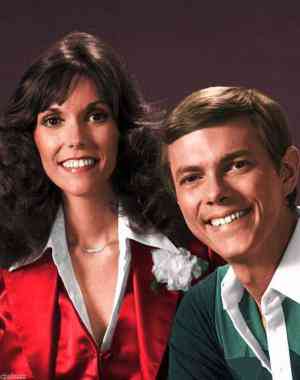 Karen & Richard Carpenter Photo: Getty Images Source: Fazed & Confused |
||
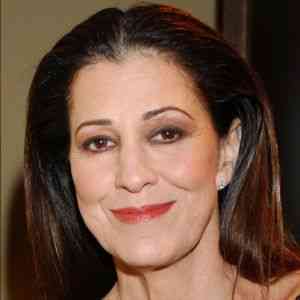 Rita Coolidge Source: AZ Quotes |
Born in Lafayette, Tennessee, in 1945,
Rita Coolidge
[1,
2,
3,
4,
5]
was a rare breed of Cherokee and Scottish. Upon graduating from Florida
State University she sang in the Memphis area and released her first record
for the Pepper label in November of 1968: 'Rainbow Child' bw 'Secret Places,
Hiding Faces'. Another on Pepper was issued in February of 1969: 'Turn
Around and Love You' bw 'Walkin' In the Morning'. From Memphis she headed to
Los Angeles to deliver backup vocals to 'The Original Delaney & Bonnie &
Friends' released in July of 1969. In 1970 she appeared on
Dave Mason's 'Alone Together', released
in June. She contributed to
Joe Cocker's 'Mad Dogs and Englishmen' issued in
August the same year. It was also 1970 that she met
Kris Kristofferson whom
she would wed from 1973 to 1980 and release a few albums. Coolidge issued
her first two albums in February and November of 1971 with
Herb Alpert's A&M label: 'Rita
Coolidge' and 'Nice Feelin''. The album that did it for Coolidge was
'Anytime...Anywhere' in 1977, rising to #6 on Billboard's 200. 1980 saw her
duet w
Glen Campbell, 'Somethin
'Bout You Baby I Like'. Her final
albums with A&M were 'Inside the Fire' and 'Love From Tokyo' in '84. She
Issued several albums in the nineties but her success of twenty years afore
wasn't repeated. 1997 witnessed her duet with
Tom Jones, 'Somethin 'Bout You Baby
I Like'. During the new millennium Coolidge has issued 'And So Is
Love' in 2005 and 'A Rita Coolidge Christmas' in 2012. She published her memoir, 'Delta Lady', in
2016 and
tours the States as this is written,
also maintaining a page at
Facebook.
Discos of issues by Coolidge at
1,
2. Of Coolidge w
Kristofferson
at 1,
2. See also
*.
Coolidge in visual media. Rita Coolidge 1969 Composition: Rita Collidge Composition: Rita Collidge Rita Coolidge 1971 Album Rita Coolidge 1972 Composition: Bob Dylan
Rita Coolidge 1974
Composition: Kris Kristofferson/Fred Foster Rita Coolidge 1975 Composition: Bob Morrison Rita Coolidge 1978 Duet w Donny Osmond 'Donny & Marie Show' Composition: Elton John/Bernie Taupin Filmed live Composition: Boz Scaggs Composition: Tom Snow Rita Coolidge 1979 I'd Rather Leave While I'm in Love Composition: Peter Allen/Carole Bayer Sager Rita Coolidge 1983 Composition: John Barry/Tim Rice 'Theme from 'Octopussy' Music video
|
||
|
Alan Silvestri
See
Alan Silvestri. |
|||
|
|
We leave this page yet rather bare for the time period covered, to make additions as may arise. |
Black Gospel
Blues Early Blues 2: Vocal - Other Instruments Modern Blues 2: Vocal - Other Instruments Classical
Romantic: Composers born 1770 to 1840
Modern: Composers born 1900 to 1950
Early Jazz 1: Ragtime - Bands - Horn
Early Jazz 2: Ragtime - Other Instrumentation
Modern 4: Guitar - Other String
Modern 5: Percussion - Other Orchestration
Modern 7: Latin Jazz - Latin Recording
Modern 8: United States 1960 - 1970
Modern 9: International 1960 - 1970
Latin
Latin Recording 2: The Caribbean
Latin Recording 3: South America
The Big Bang - Fifties American Rock
Total War - Sixties American Rock
Classical - Medieval to Renaissance
Classical - Baroque to Classical
Classical - Romantic to Modern
Jazz Early - Ragtime - Swing Jazz
Jazz Modern- Percussion - Latin - Song - Other
Boogie Woogie - Doo Wop - R&B - Rock & Roll - Soul - Disco
Sixties American Rock - Popular
![]()
vfssmail (at) gmaill (dot) com